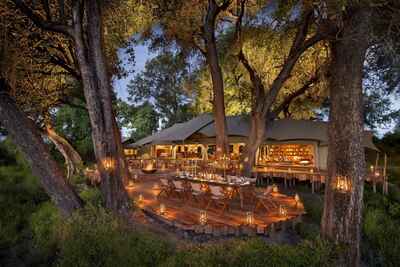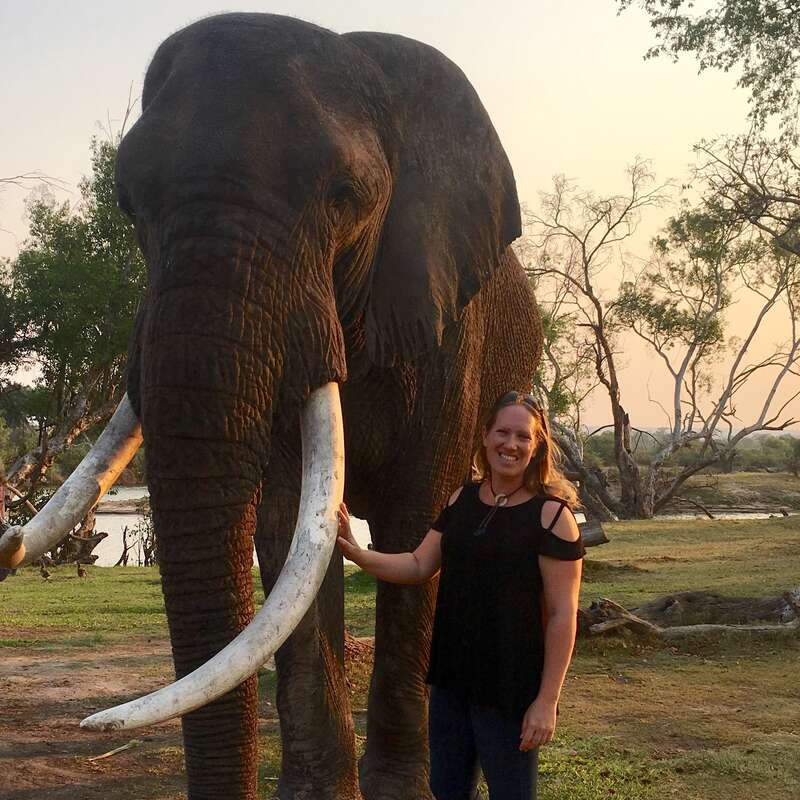About Duba Plains Camp
Situated on a private reserve in the northern Okavango Delta, Duba Plains Camp has long been one of our favourites.
Looking out over floodplains interlaced with watery channels that are a haven for wildlife. It’s also where renowned wildlife photographers and filmmakers Dereck and Beverley Joubert made their now famous documentary, (Relentless Enemies).
In 2017 this intimate tented camp – along with the separate two-bedroom Duba Plains Suite – was completely rebuilt, retaining its traditional style but adding an even greater level of luxury.
Duba Plains in its new and much more luxurious incarnation certainly delivered on the, ‘Wow factor’. With the very high standards of hosting and guiding, it's not a surprise that the camp attracts more repeat visitors than is usual for most Okavango Delta camps. Given that the surrounding area stands out for its wildlife, Duba Plains is definitely be one to consider, in tandem with other Okavango camps, for a luxury safari.
Our view
Duba Plains in its new and much more luxurious incarnation certainly delivered on the, ‘Wow factor’. With the very high standards of hosting and guiding, it's not a surprise that the camp attracts more repeat visitors than is usual for most Okavango Delta camps. Given that the surrounding area stands out for its wildlife, Duba Plains is definitely be one to consider, in tandem with other Okavango camps, for a luxury safari.
Accommodation
5 tents, 1 suite
Children
Best for 16 years or over
Open
All year
Activities

4WD Safari

Birdwatching

Boat trip

Fishing

Guided walking safari

Helicopter

Mokoro

Night drive

Private activities
Traveller reviews of Duba Plains Camp
19 real, un-edited reviews from Expert Africa's travellers.
Arrived 3 May 2024, 3 nights
"Duba Plains Camp review"
Overall rating: Excellent
Arrived 30 May 2022, 4 nights
"A truly superb wildlife experience"
Overall rating: Excellent
Arrived 28 May 2022, 4 nights
"Duba Plains Camp review"
Overall rating: Excellent
Arrived 12 Jun 2018, 3 nights
"Duba Plains"
Overall rating: Excellent
Arrived 30 Apr 2018, 2 nights
"Total luxury at Duba Plains Suites"
Overall rating: Excellent
Arrived 1 Sep 2015, 3 nights
"Great Safari at Duba Plains Camp."
Overall rating: Excellent
Arrived 28 Jul 2015, 3 nights
"Duba Plains Camp review"
Overall rating: Good
Arrived 9 Nov 2014, 4 nights
"Nothing plain about Duba"
Overall rating: Excellent
Arrived 24 Aug 2014, 5 nights
"Another great stay at Duba"
Overall rating: Excellent
Arrived 9 Jun 2014, 3 nights
"Wonderful Duba Plains"
Overall rating: Excellent
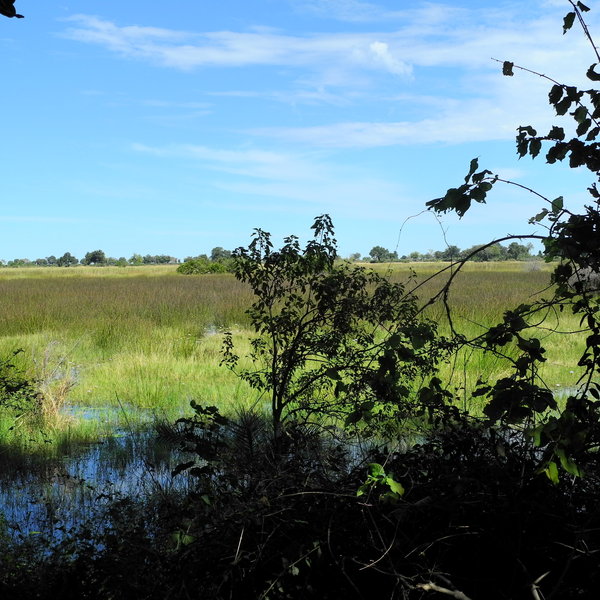
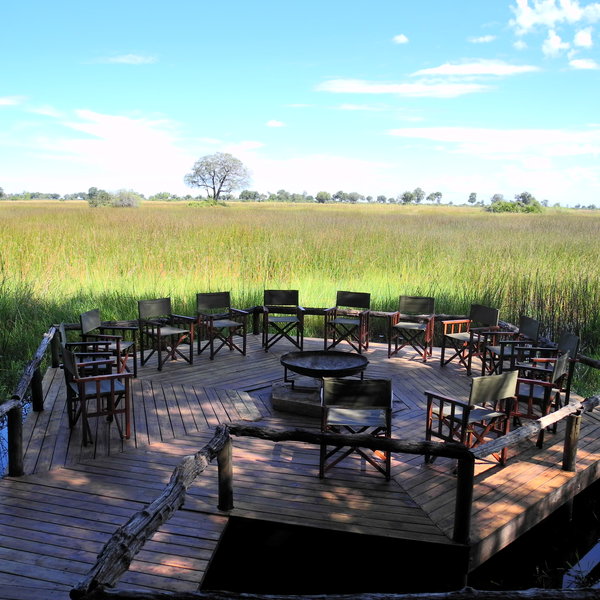
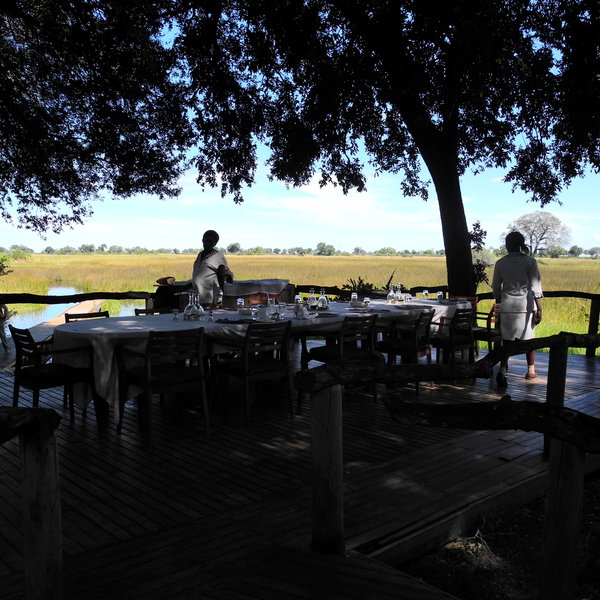
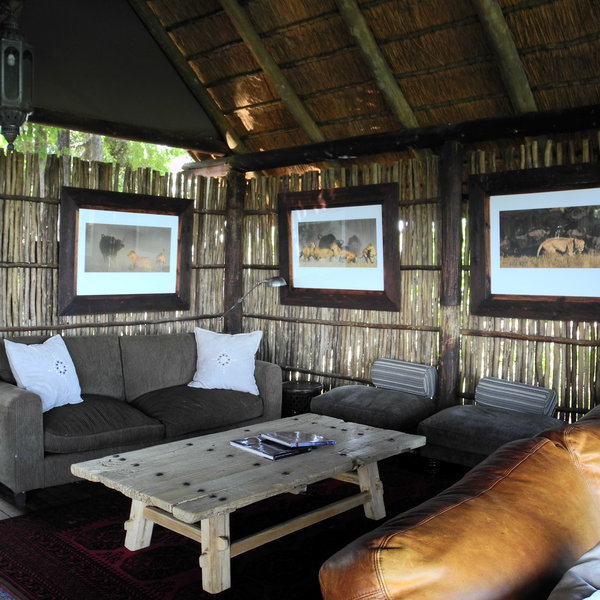
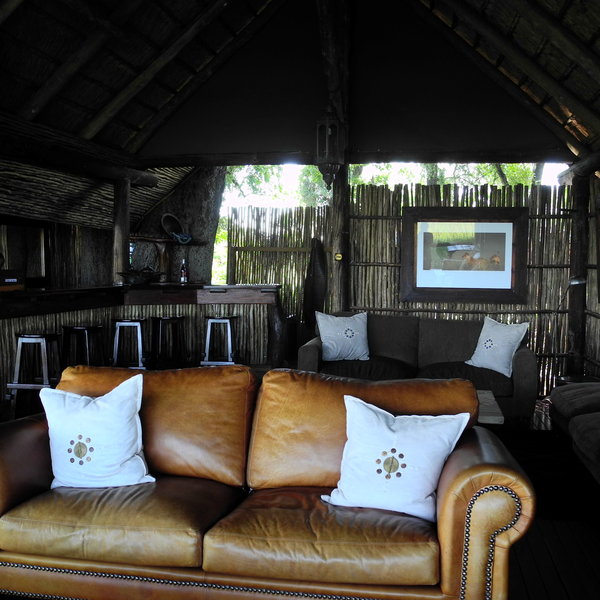
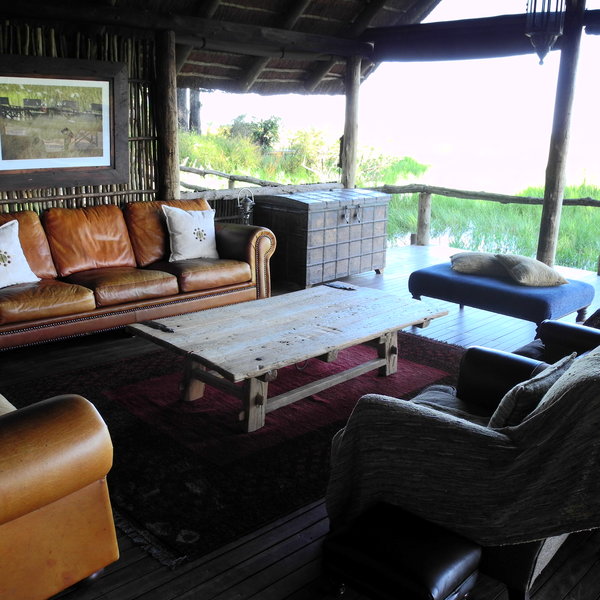
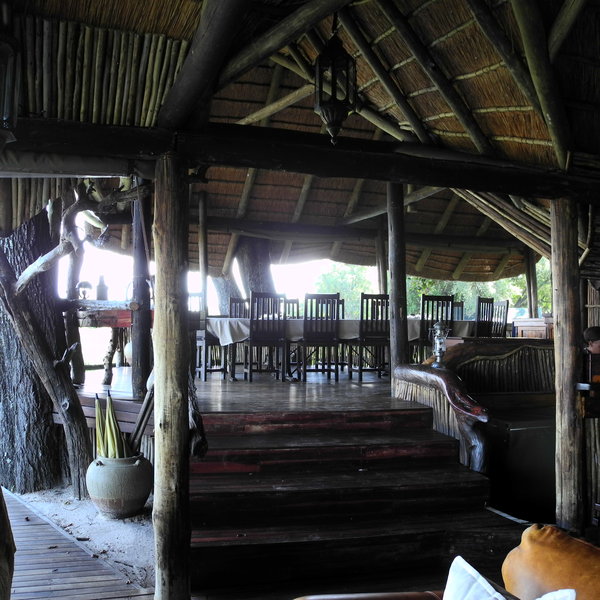
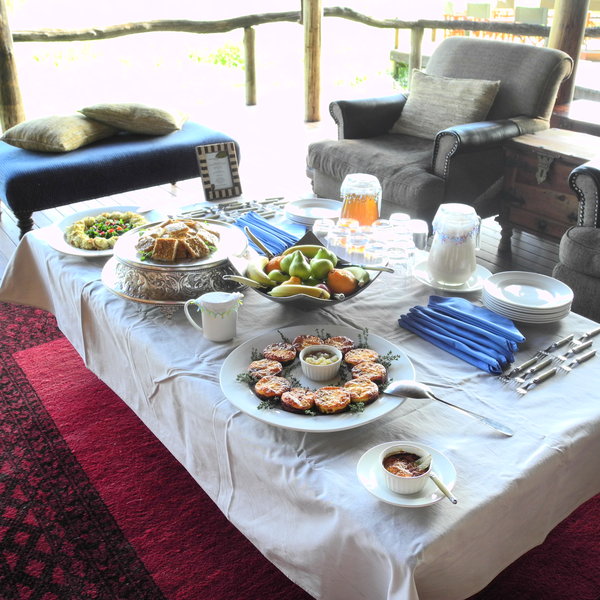
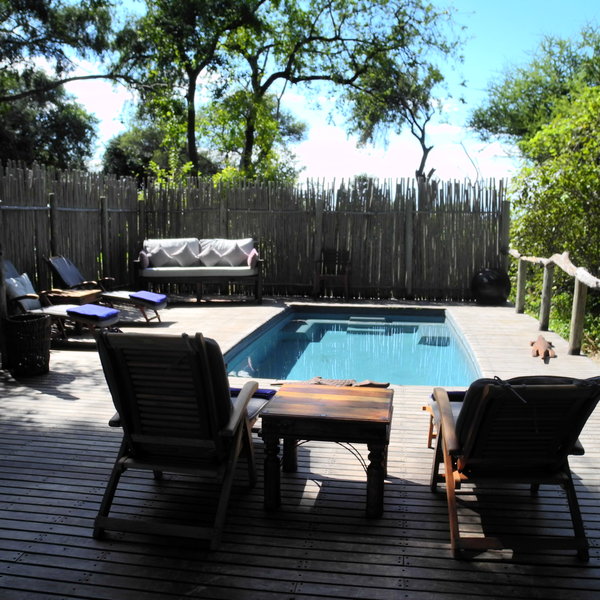
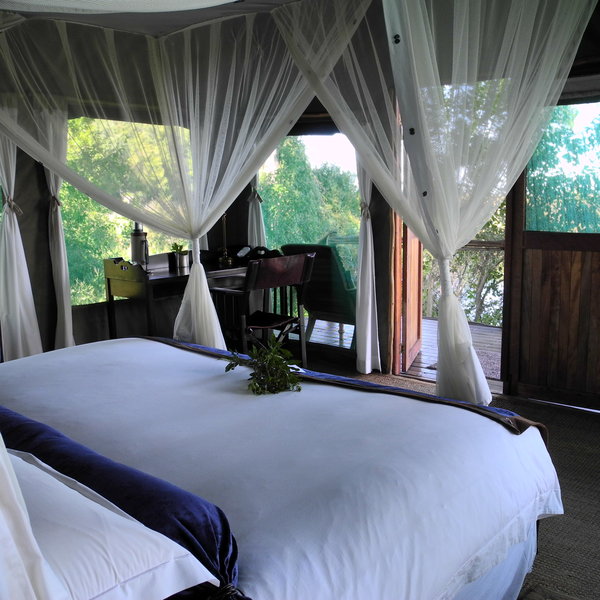
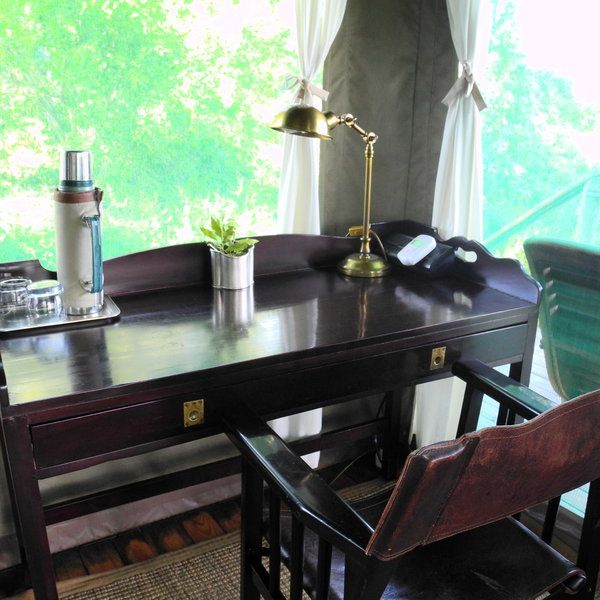
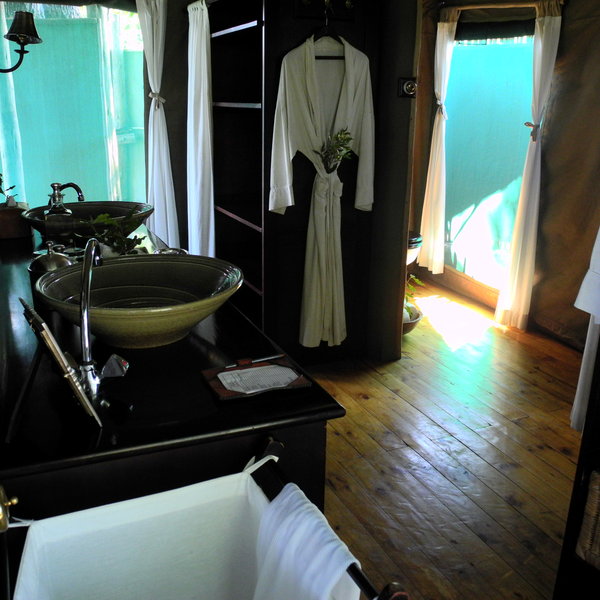
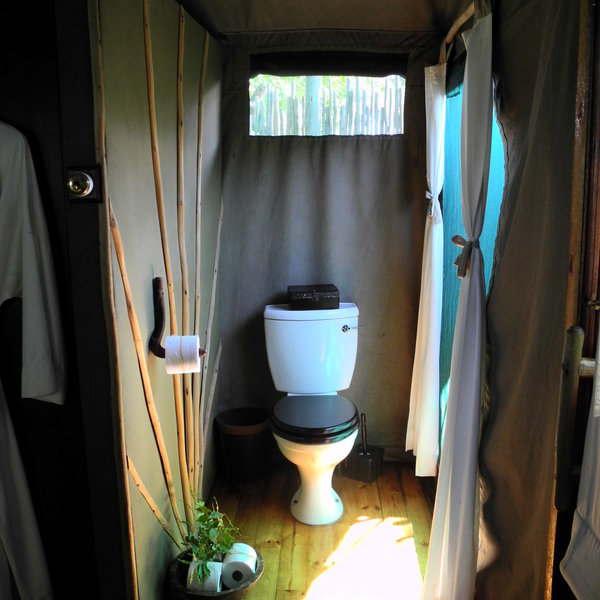
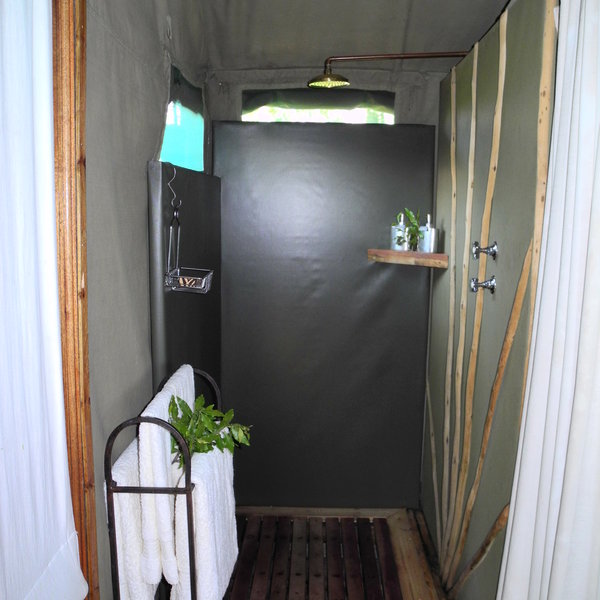
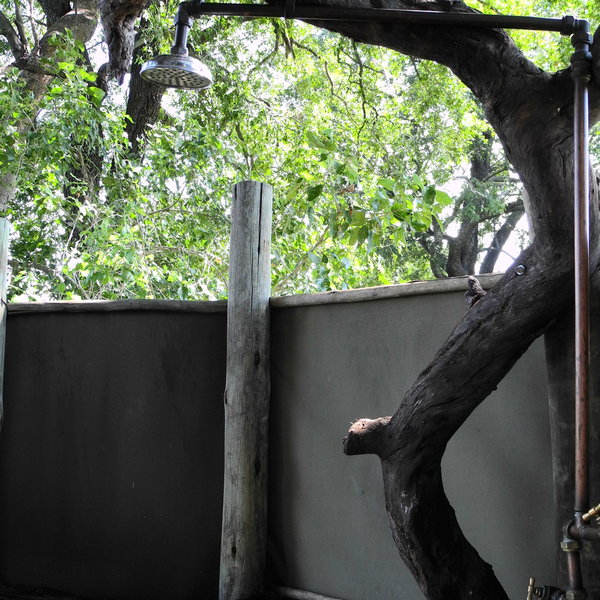
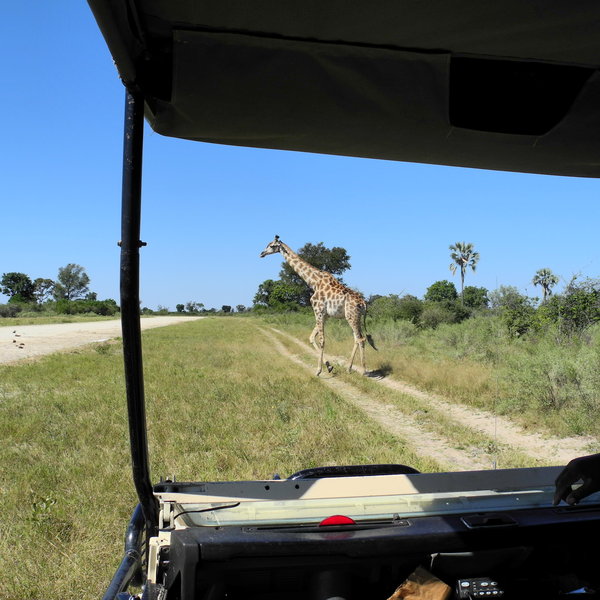
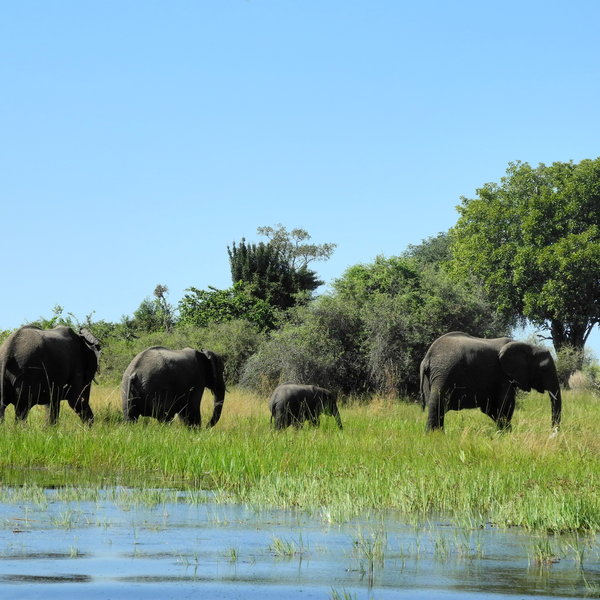
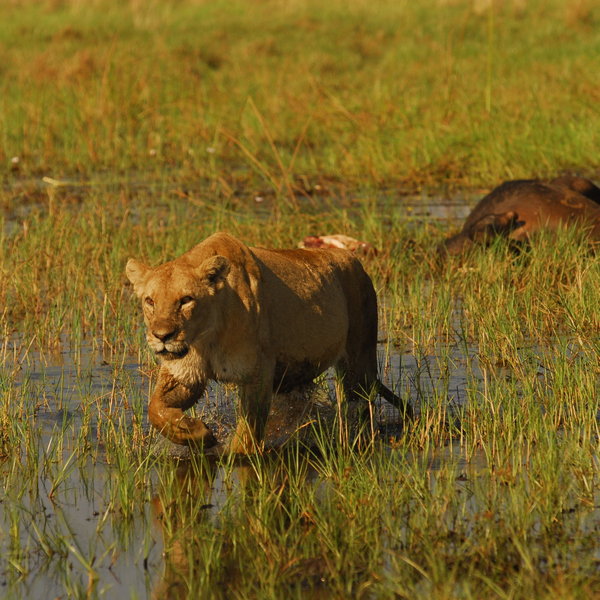
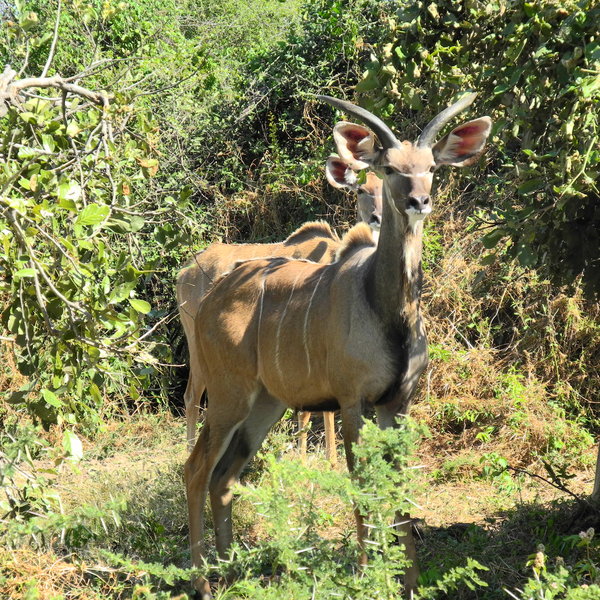
Expert Africa's gallery
When we travel we take lots of photos ourselves to give you a real and un-edited view of the safaris. See our 40 pictures and 1 videos of Duba Plains Camp to get the candid view.
View gallerySafaris visiting Duba Plains Camp
Just ideas, we'll always tailor-make a trip for you
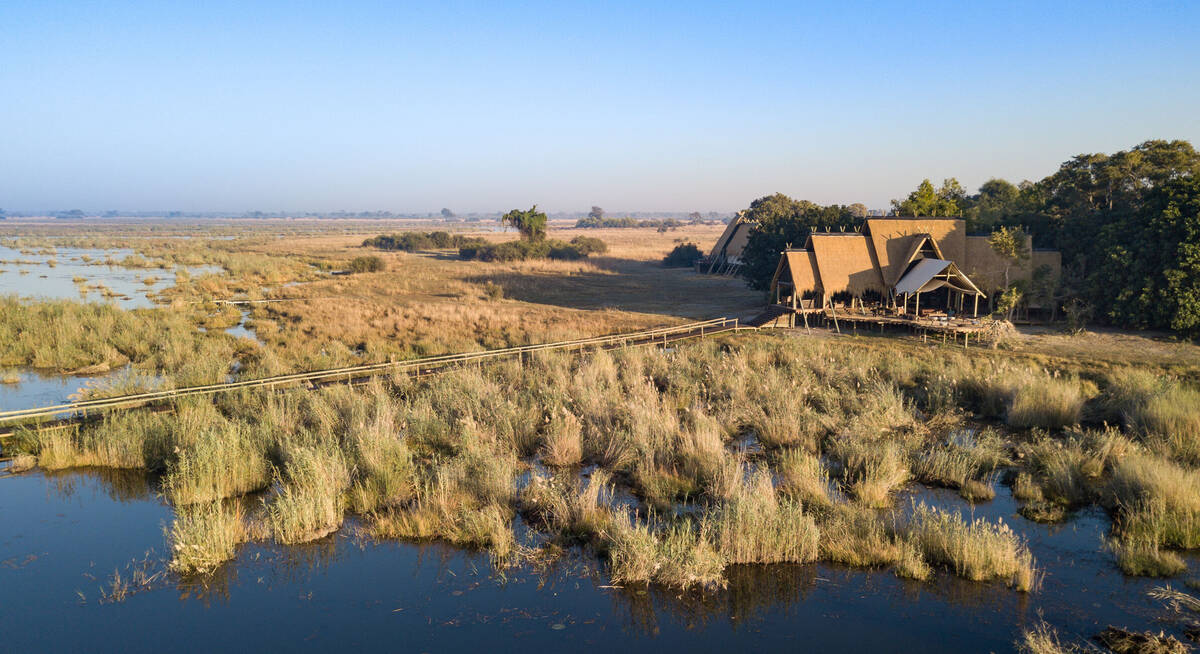
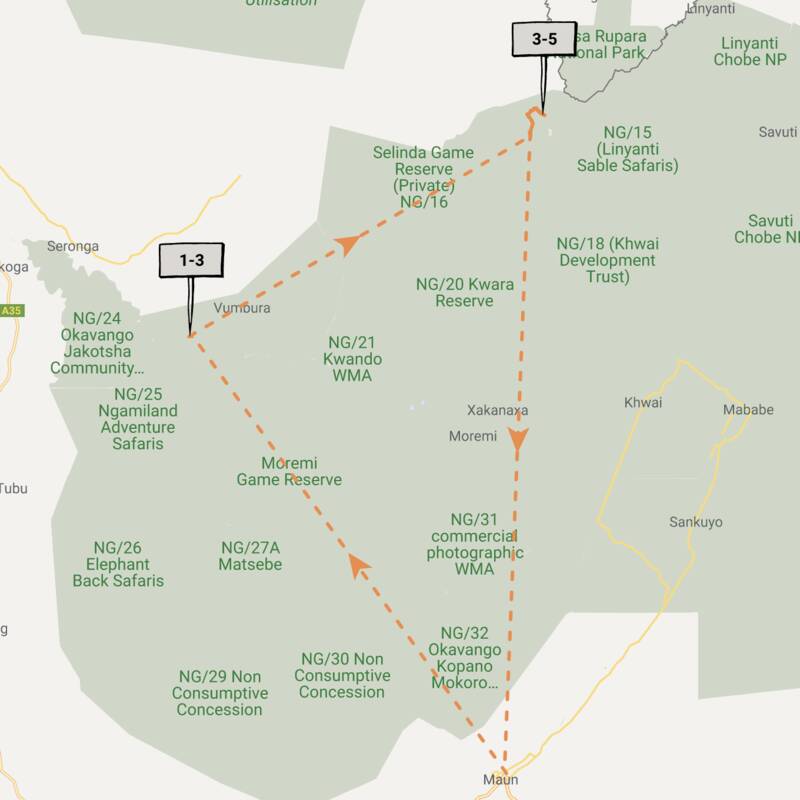
Wildcat Safari
4 days • 2 locations • 1 country
MAUN AIRPORT TO MAUN AIRPORT
A short, high-quality safari staying at two lavish camps with excellent hospitality and guiding standards. The journey takes you from the wildlife-rich, lush Okavango Delta to dry open plains split by the meandering Selinda Spillway.
Visiting Kwando-Linyanti, Okavango Delta
US$9,700 - US$17,570 per person
Duba Plains Camp: Our full report
Situated on a private reserve in the northern Okavango Delta, Duba Plains Camp has long been one of our favourites.
Looking out over floodplains interlaced with watery channels that are a haven for wildlife. It’s also where renowned wildlife photographers and filmmakers Dereck and Beverley Joubert made their now famous documentary, (Relentless Enemies).
In 2017 this intimate tented camp – along with the separate two-bedroom Duba Plains Suite – was completely rebuilt, retaining its traditional style but adding an even greater level of luxury.
The rebuilt camp retains just five tented rooms, as well as the separate Duba Plains Suite. All are raised on recycled railway sleeper decking and offer guests superb views of the surrounding floodplain and the steady stream of wildlife parading past.
Inside, ceiling fans and an environmentally friendly air-conditioning system over the guests’ bed work with careful tent design to maintain a comfortable ambient temperature. As well as a luxurious bath, beautifully appointed en-suite facilities consist of a flush toilet, double basins and indoor and outdoor showers.
Each tent also has a lounge area, which incorporates a place to write and do your photographic downloads, and offers the opportunity for private dining. The attention to detail even extends to the provision of a long-lens camera and binoculars in each tent, to enhance your wildlife experience.
Outside, beyond their veranda, guests can enjoy their own private plunge pool with a view, or head for their shaded sala, where two daybeds invite relaxation.
The main area consists of a large, raised dining area and a comfortable lounge with private dining areas, wine cellar and library. There’s ample space for guests to either get away and be private or be all together if they want to. There is a small camp shop, and guests can request in-room treatments with the on-site masseuse.
Entirely separate from the camp, the two-bedroom Duba Plains Suite takes privacy to another level. The camp's centre-point is the gathering place of all bush experiences – the fireplace on an extended deck over the marshes.
Guests in the suite enjoy the services of their own guide, with a private game-drive vehicle, as well as a private butler and chef.
Activities for all guests at Duba Plains centre around day and night safari drives. They also offer boat cruises, depending on water levels. Note that at some times of the year (usually May–September), the water levels can be very high and require a short boat transfer from camp to the game-drive vehicles. This in turn can limit the possibility of night game drives, and the higher water levels can also increase the chances of getting stuck in some areas of the reserve. That said, the vehicles at Duba Plains are specifically adapted to these environments and we understand that the likelihood of getting stuck in these is now quite low (but certainly not impossible)!
Within the 330km2 Duba Plains Reserve, the camp prides itself on its extraordinary wildlife, from lions and leopards to elephants and buffalo and almost everything in between. Duba Plains is unique in that the camp is home to one of the Okavango’s highest concentrations of Red Lechwe. For many years it was known almost exclusively for the interactions of lion and buffalo, which resulted in the Jouberts’ documentary, Relentless Enemies – chronicling the battle for survival between the lions and buffalo on the plains, and how each species has adapted to this unusual way of life.
In 2014, however, the main lion pride split. Now the smaller prides prey mostly on red lechwe, and more leopards have moved into the area.
On one visit, members of the Expert Africa team watched with bated breath as a herd of some 700-strong buffalo surrounded the date-palm islands where a pride of 14 lions were hiding. They described the scene as nothing less than dramatic, as angry buffalo tried to flush out the lions only to be repelled with much snarling and growling.
That said, Duba’s reputation for lion sightings remains well founded. On our January 2024 visit we were aware of one lioness with three small cubs, and we witnessed two dominant males mating with two different lionesses. We also witnessed a full lion hunt: stalk, chase and kill.
Intriguingly, it was the general animal behaviour here that we found fascinating. A herd of 14 kudu walking past metres from our sundowner spot; a mother warthog trotting past the same drinks stop: I held my breath expecting her to charge off when she realised her proximity to us. The animals showed that they were totally relaxed around the vehicles, a testament to Duba’s great guiding and the respect that the guiding teams have shown the wildlife over the years.
Birdwatching at Duba is excellent, with flocks of egrets, herons and cormorants to be seen, along with bee-eaters, kingfishers and eagles. On our January visit we were also lucky enough to see some of the rarer species – the rosy-throated longclaw, white-backed pelicans and secretary birds.
Geographics
- Location
- Okavango Delta Safari Reserves, Botswana
- Ideal length of stay
- Three or four nights is ideal here. At certain times of the year the camp offers a “pay 3 stay 4” deal.
- Directions
- Guests usually fly by light aircraft from Kasane (1hr 25 mins) or Maun (40 mins) into Duba Plains. It is about a five-minute transfer by 4WD vehicle from the airstrip to camp.
- Accessible by
- Fly-and-Transfer
Food & drink
- Usual board basis
- Full Board & Activities
- Food quality
- Duba Plains, like its sister camps – Zarafa Camp and Selinda Camp – has an executive chef and a hand-picked wine list drawn from a cellar stocked by winemaker friends of the Jouberts.
On our most recent stay in January 2024, we were once again impressed with the food at Duba Plains. Vegetarians and most other dietary requirements can be catered for on request.
A light breakfast is served before heading out on the morning game drive. This is usually quite a straightforward buffet of cereals, fruit, yoghurt, freshly made muffins, tea and coffee.
Brunch, which is served on returning from the morning activity, was varied and tasty. Our choices included a Waldorf salad, a spicy butter bean and tomato dish, sweetcorn and couscous salad, a green salad and a steak salad. A selection of cooked options such as bacon and eggs can be prepared on request. Alternatively, it is not unknown for guests to be out on a particularly busy and exciting game drive, and for the camp to arrange for a “bush breakfast” or packed brunch to be driven out to them!
The afternoon tea at Duba was absolutely delicious on our last visit, from the savoury homemade shortbread to small fruit salads and sweeter tartlets, accompanied by fresh lemonade and iced tea. During tea time, the evening's dinner menu is announced by the chef.
Dinner, which usually incorporates a choice of two or three main courses, can be served around one long table, or to private tables. During our most recent stay we enjoyed the traditional BBQ meal. This started with a coconut and cauliflower soup with a freshly made bread roll. The main course was a selection of meats, from the traditional seswaa (pounded beef) and a delicious goat curry to beef fillet and boerewors (a type of South African sausage), all accompanied by carrots, peppers, courgettes and sautéed new potatoes. Amarula ice cream with honeycomb rounded off the meal, together with a good selection of cheeses and wines. - Dining style
- Mixture of group dining and individual tables
- Dining locations
- Indoor and Outdoor Dining
- Further dining info, including room service
- None
- Drinks included
- All drinks that are stocked in camp, including premium brand spirits and champagne.
Each room is provided with glasses and a flask of filtered drinking water that is replenished daily. Although plastic bottles of water are available, guests are encouraged to top up from the filtered water in the camp's main area.
Special interests
- Birdwatching
- Duba Plains is located deep in the Okavango among a matrix of palm-dotted islands, floodplains and woodland. Birders in Botswana will find a rich and varied birdlife, with good numbers of typical Okavango specials such as Pel's fishing owl, slaty egret and wattled crane.
- See ideas for Birdwatching in Botswana
- Wildlife safaris
- Duba Plains, historically famous for its lion and buffalo interaction, which can be very exciting to say the least! Staying a few nights here will give you the best chance of seeing this spectacle.
- See ideas for Wildlife safaris in Botswana
- Private villas & houses
- The two-bedroom Duba Suite is perfect for those looking for exclusivity on a Botswana safari. Set almost in a world-class wildlife reserve, it combines luxury with a traditional style, and benefits from a private guide and game vehicle, a private chef and a butler.
- See ideas for Private villas & houses in Botswana
- Luxury
- In the heart of the Okavango Delta, Duba Plains Camp’s six opulent tented rooms each features a private plunge pool, outdoor sala and air conditioning. Superb guiding, excellent food and a hand-picked wine list round off the luxury experience on a Botswana safari.
- See ideas for Luxury in Botswana
Children
- Attitude towards children
- Children over the age of 12 years are welcome at Duba Plains.
- Property’s age restrictions
- The camp may accept children between the ages of six and 12 years old, but a private vehicle must be booked, and this will be at an extra cost.
Children younger than six may be accepted by special arrangement, but then only if the entire camp is reserved for exclusive use. - Special activities & services
- Great Plains Young Explorers program introduces children to the wilderness as Conservation Ambassadors, with activities as diverse as cooking, birding and tracking wildlife.
- Equipment
- The two-bed Duba Plains Suite can accommodate a family of five.
- Generally recommended for children
- We would not recommend Duba Plains Camp for children below the age of 16 years, unless staying in the suite. The game viewing can be intense and the atmosphere is very adult. In addition, children may find it particularly upsetting to watch a kill first-hand. If staying at Duba with children younger than 16 years, we would recommend booking a private vehicle for greater flexibility and enjoyment.
- Notes
- Duba Plains is not an ideal camp for children. Dangerous game is known to move through camp on a regular basis. The rooms themselves are raised on decks, with a steep drop from the verandas. The camp is also open to water in front for much of the year, and the pool is not fenced. Children must be under the constant supervision of their parents.
Our travellers’ wildlife sightings from Duba Plains Camp
Since mid-2018, many of our travellers who stayed at Duba Plains Camp have kindly recorded their wildlife sightings and shared them with us. The results are below. Click an animal to see more, and here to see more on our methodology.

100% success

100% success

100% success

100% success

75% success

50% success

50% success

33% success

25% success

25% success

0% success

0% success

0% success

0% success

0% success
Communications
- Power supply notes
- Solar and generator.
- Communications
- WiFi is available in each suite, but there is no cellphone reception.
- TV & radio
- There is no TV or radio.
- Water supply
- Borehole
- Water supply notes
- Hot and cold running water is supplied to the en-suite bathrooms, which also have flushing toilets.
Sustainability
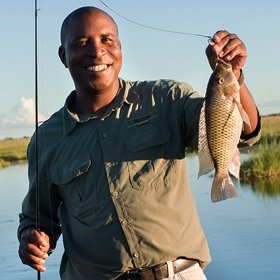
Growing together with the locals
The team at Duba Plains is committed to build a long-lasting and fruitful relationship with the local communities who lease the land the camp is built on. Locals make up for 80% of the staff employed and in addition to financial benefits and training, they are offered the chance to engage in the two projects aimed at socioeconomic development of their villages in Gudigwa and Seronga.
In collaboration with Great Plains Conservation and Pack for Purpose, the camp facilitates the Conservation Education Program in Botswana by mentoring children at the primary school in Gudigwa about the benefits and importance of protecting wildlife.
Another initiative in the villages of Gudigwa and Seronga is promoting traditional skills. Aimed at empowering women, the project creates employment opportunities that lead to an increase in family income and self-growth. The women create items such as traditional basketwork, hand-sewn and embroidered products and hand-beaded glass and food nets, which are sold in the curio boutiques of the camp. The project has helped women acquire additional skills such as communication or even knowledge about entrepreneurship and how to open and run a small business.
Guests are encouraged to participate by donating general supplies such as notebooks, pens or reading material for children or fashion and crafting magazines, acrylic paints and brushes for local artisans.
See more great sustainability projects in Botswana
Health & safety
- Malarial protection recommended
- Yes
- Medical care
- The nearest doctor is in Maun. All management and guides are first aid trained and medical evacuation is available in case of emergencies. There is a nurse on call (via radio) 24 hours a day. Please note that it is only possible to fly out of camp during daylight hours as the bush airstrips do not have any lighting at night.
- Dangerous animals
- High Risk
- Security measures
- Guests are escorted to their rooms after dark, as dangerous wildlife is known to wander through the camp. A safety briefing is given on arrival. “Fog horns” are provided in the rooms to sound the alarm in case of an emergency.
- Fire safety
- There are extinguishers outside all the rooms and in the main area.
Activities
4WD Safari
Birdwatching
Boat trip
Fishing
Guided walking safari
Helicopter
Mokoro
Night drive
Private activities
Extras
- Disabled access
- On Request
- Laundry facilities
- A laundry service is included at Duba Plains Camp. Laundry is collected in the morning and usually returned the same day, weather permitting. For cultural reasons, the staff do not wash underwear. Detergent is provided in each room for guests who wish to do a little hand washing.
- Money
- No exchange facilities are offered. There is a safe in each of the rooms.
- Accepted payment on location
- Mastercard and Visa credit cards are accepted; Diners and Amex are not. Cash may be used in the form of South African rand, GB sterling, US dollars, euros and Botswana pula.
Plan and book your trip with Expert Africa
All of our trips are tailor-made, so we'll always adapt them to suit you. Talk to an Expert and let us plan and arrange your perfect trip.

Talk to an Expert
Call or email us now! We’ll match you with the Specialist in our team who is best suited to help you. Then together we can start planning your trip.

Set up your itinerary
Based on our experience and your ideas, your specialist will create a detailed, costed itinerary. We’ll refine it together, until we have a trip that you’re perfectly happy with.

Prepare for your trip
The same Specialist will make the seamless arrangements for your trip, send you detailed travel documents, and be available to answer any questions before you depart.

Travel with peace of mind
After you set off, you’ll be cared for by our partners in Africa, most of whom have worked with Expert Africa for decades. And if you ever need us urgently, we’re available 24/7.

When you return
We love to learn about your trip, and so will always be grateful if you’ve the time to give feedback to your Specialist when you return.
Duba Plains Camp's location
Look closer at the environment and surroundings of Duba Plains Camp.
Excursions from Duba Plains Camp
Optional extra day-trips and excursions possible whilst you're staying at Duba Plains Camp. Talk to us: these are usually best arranged before you go.
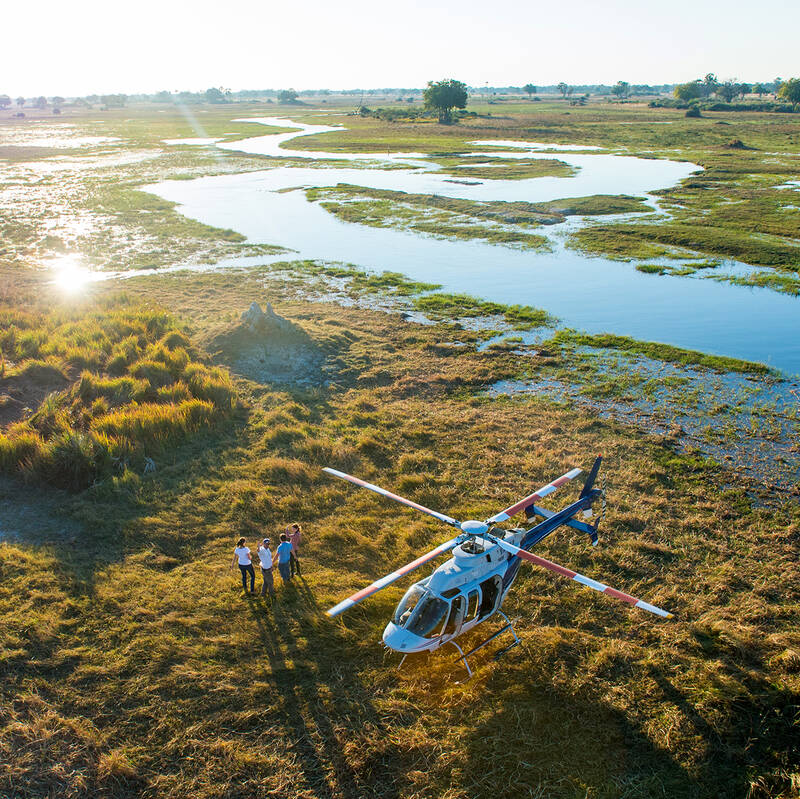
Helicopter Flight - Botswana
Various: from 30 minutes to half a day.
Low-flying, agile and offering superb views, helicopters are an ideal way to move around the Okavango Delta.You can use them instead of fixed-wing inter-lodge transfers or as an addition to other wildlife watching activities, and of course, helicopters can hover to allow that perfect pic, whereas fixed-wings can’t.
More about Helicopter FlightOther lodges in Okavango Delta Safari Reserves
Alternative places to stay in this same area.
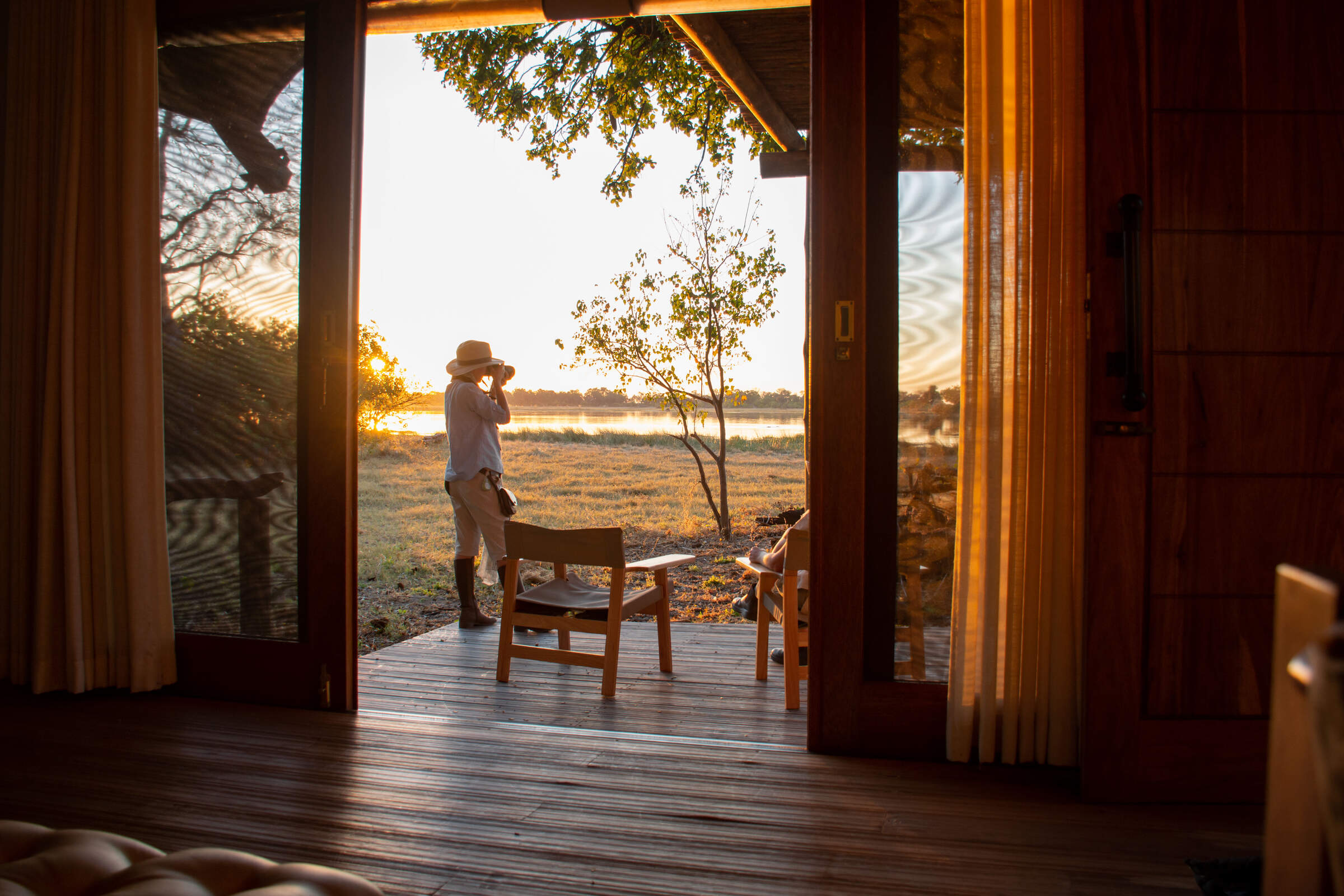
Kwara Camp
Kwara Camp's private reserve boasts land and water activities year-round, with excellent game-viewing opportunities and access to permanent channels of the north-east Okavango Delta.
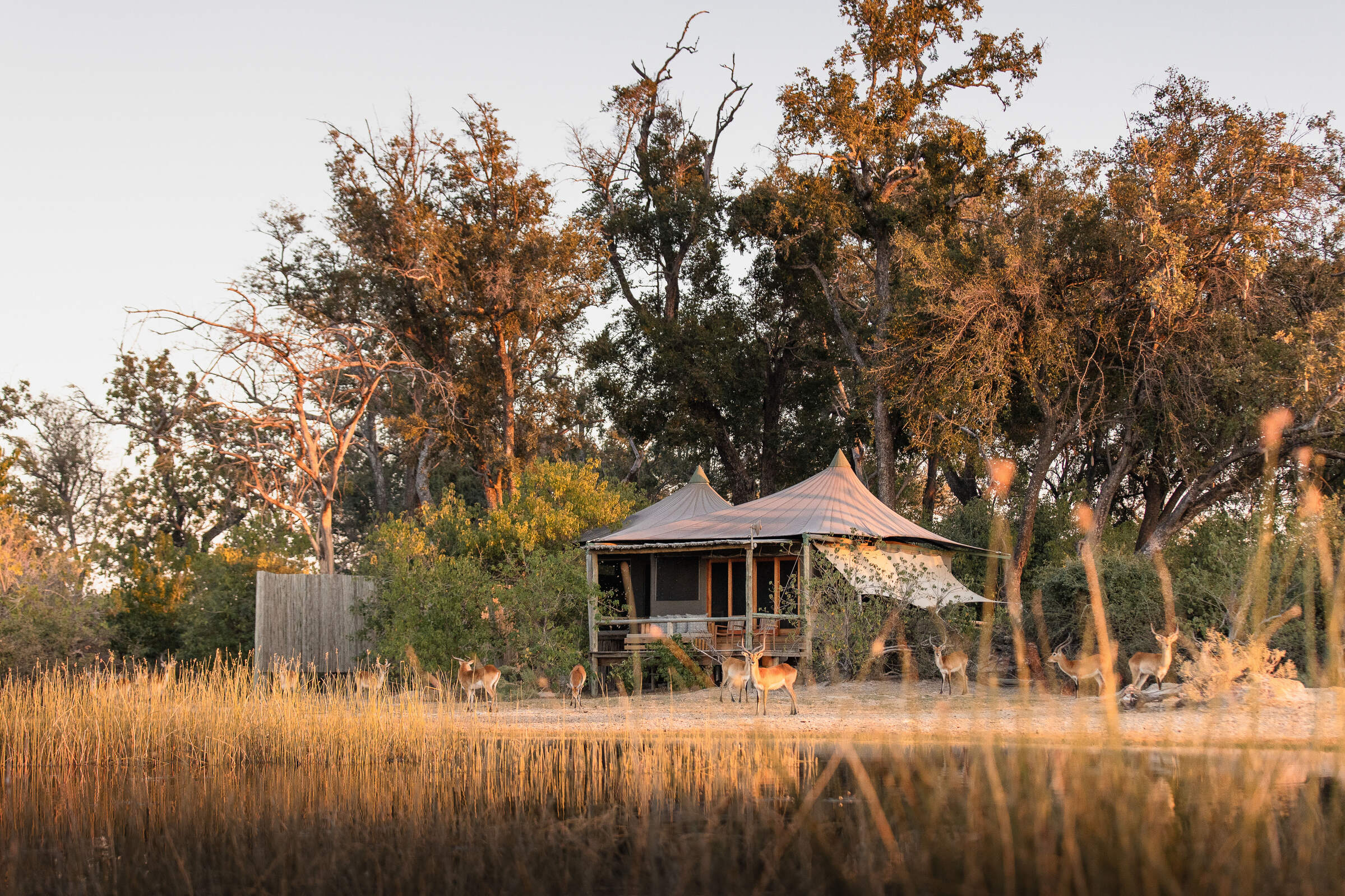
Little Vumbura
On a secluded island within a private reserve, Little Vumbura combines superb game viewing with a broad diversity of habitats in a truly picturesque setting.
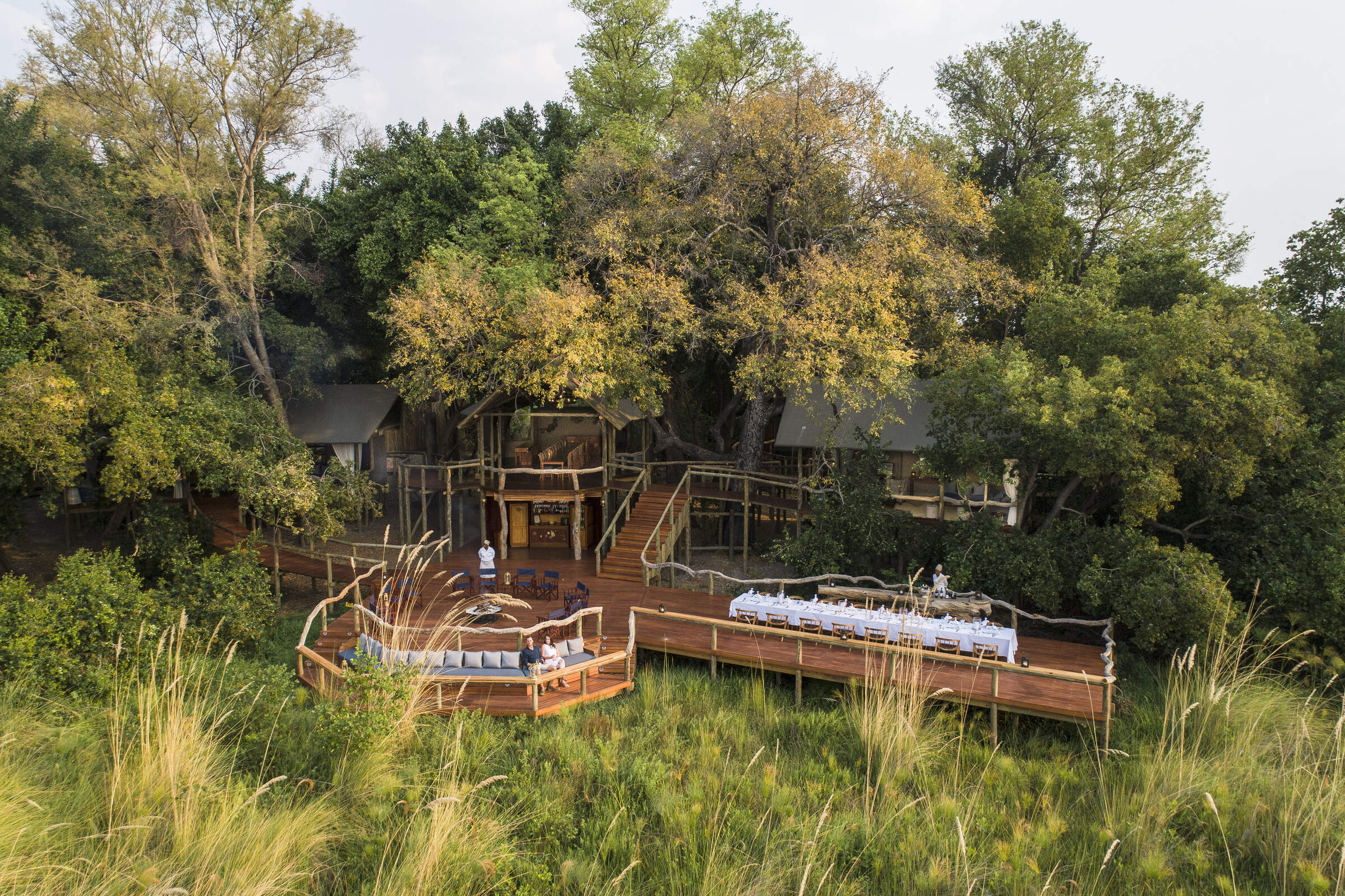
Shinde Camp
With experienced staff and a wealth of activities, Shinde offers a traditional safari in an exceptionally varied and wildlife-rich environment.
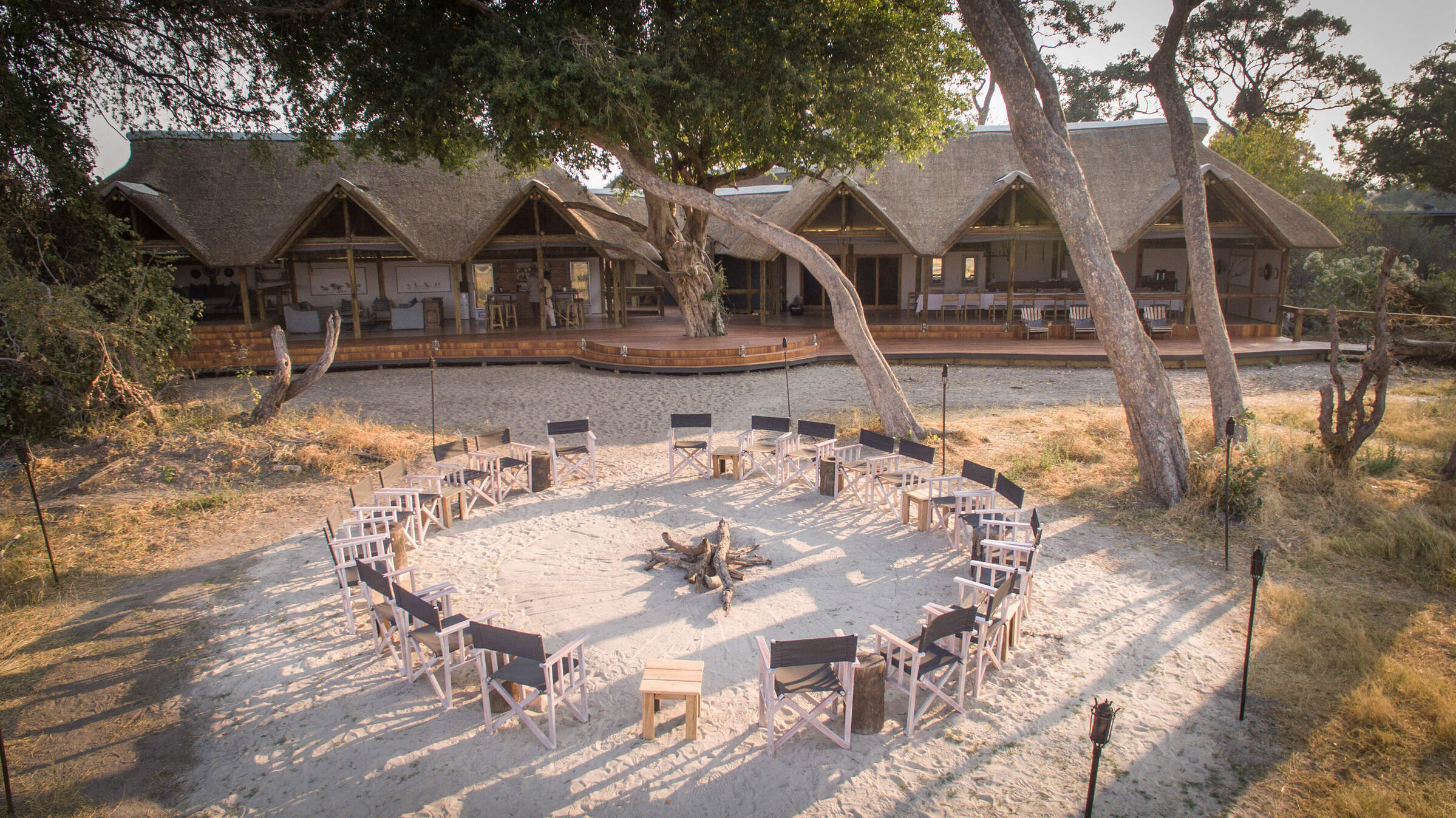
Splash Camp
Set in the Kwara Reserve, offering superb wildlife viewing year-round, Splash offers both land and water activities led by guides with a particular knack for tracking big game.
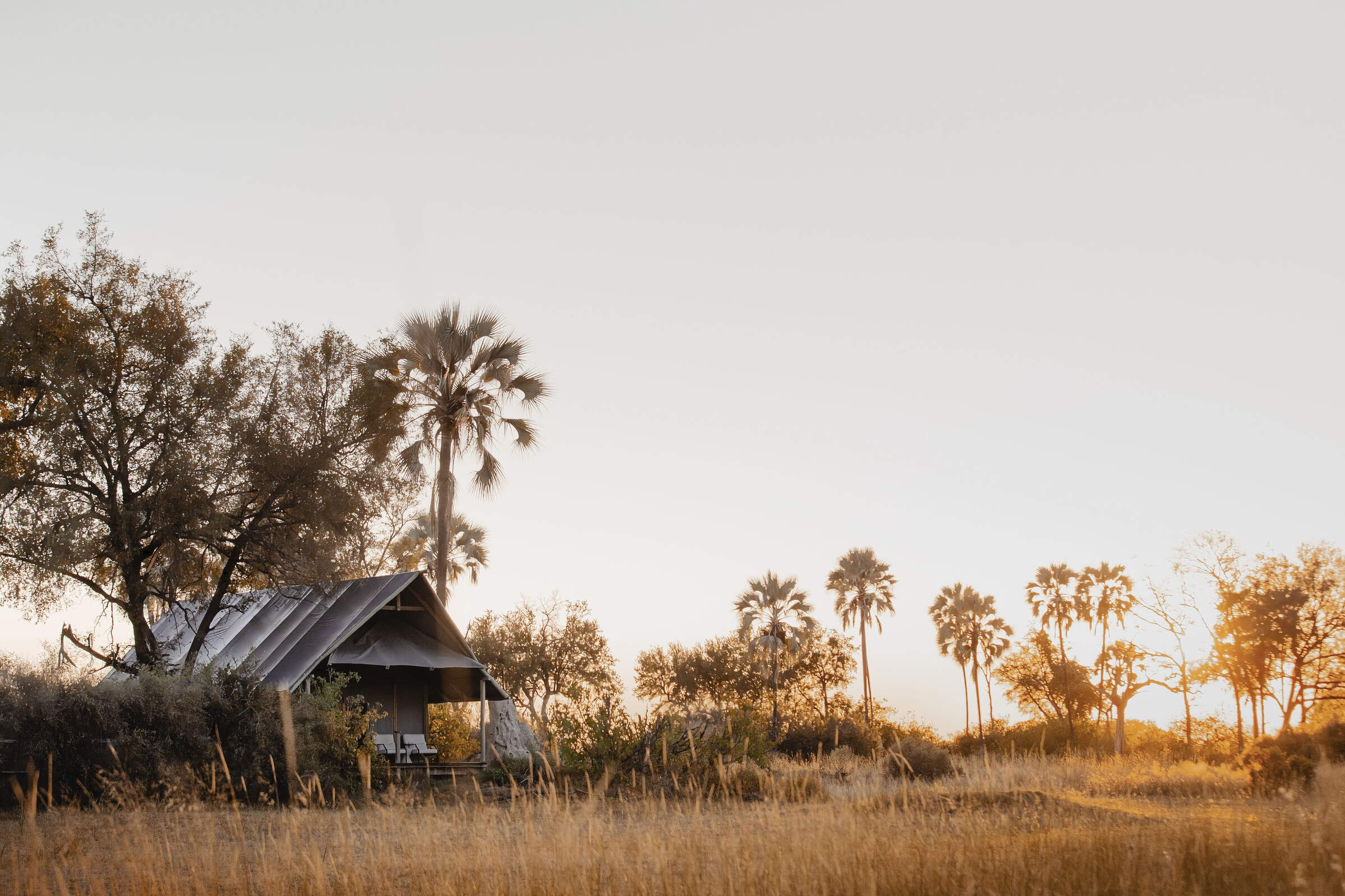
Chitabe Lediba
Chitabe Lediba, in Botswana's southern Okavango Delta, is a small family friendly safari camp; it offers great dry-land safaris and in our experience consistently delivers good game sightings.
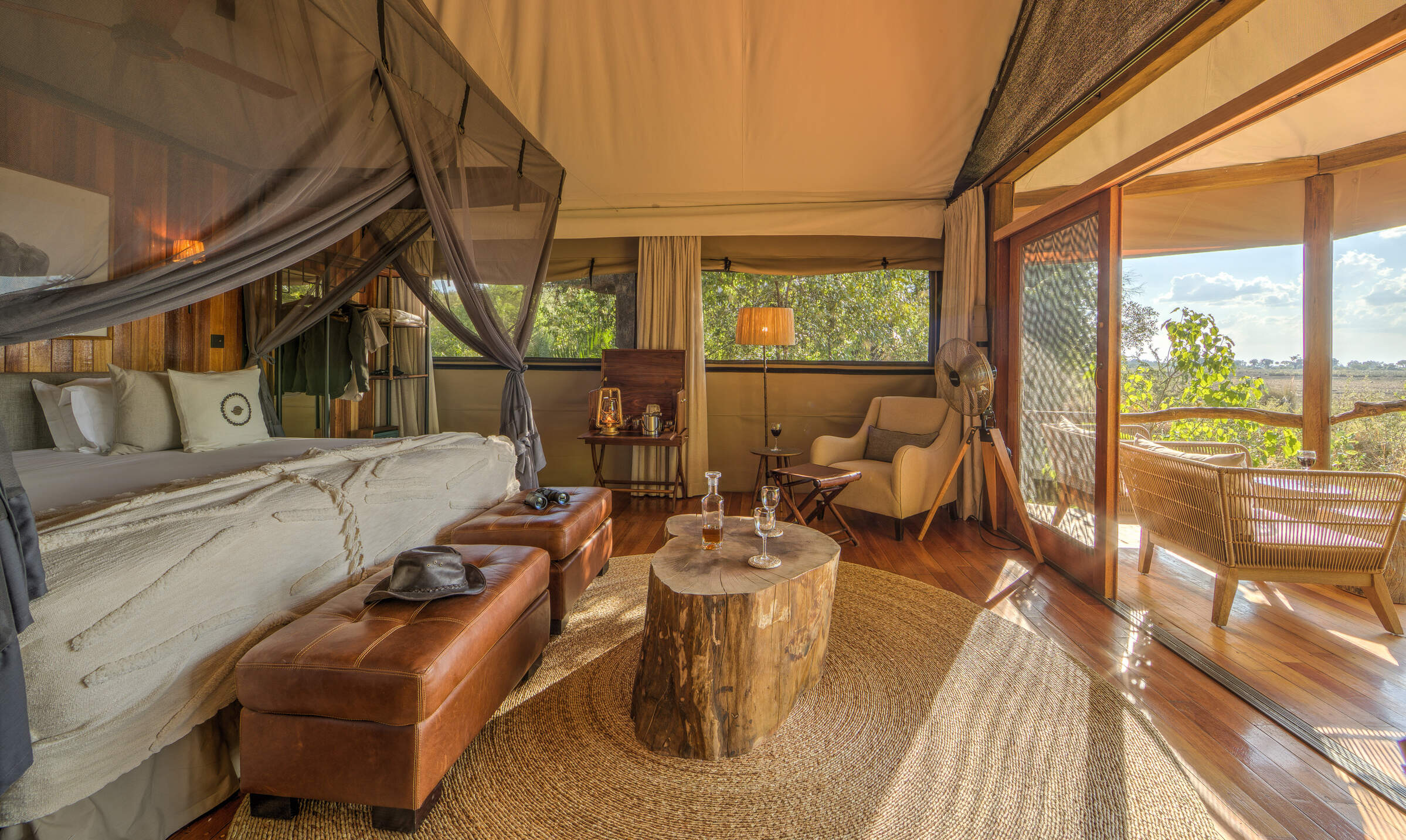
Kanana
In a beautiful part of the Delta, Kanana focuses on fantastic water activities and birding – including exclusive access to an impressive heronry.
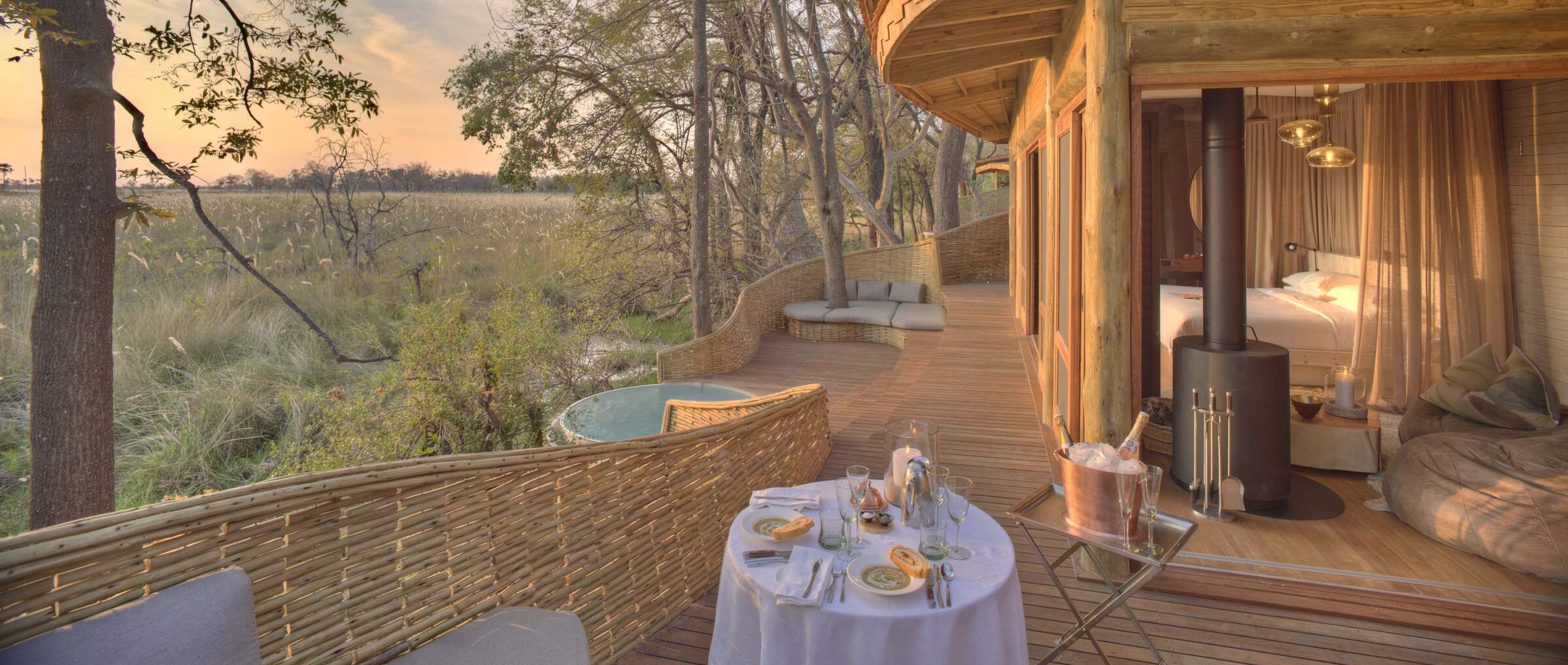
Sandibe Safari Lodge
The luxurious Sandibe Okavango Safari Lodge lies in a private concession in the heart of the Okavango Delta, beside Moremi Game Reserve, with superb big-game viewing.
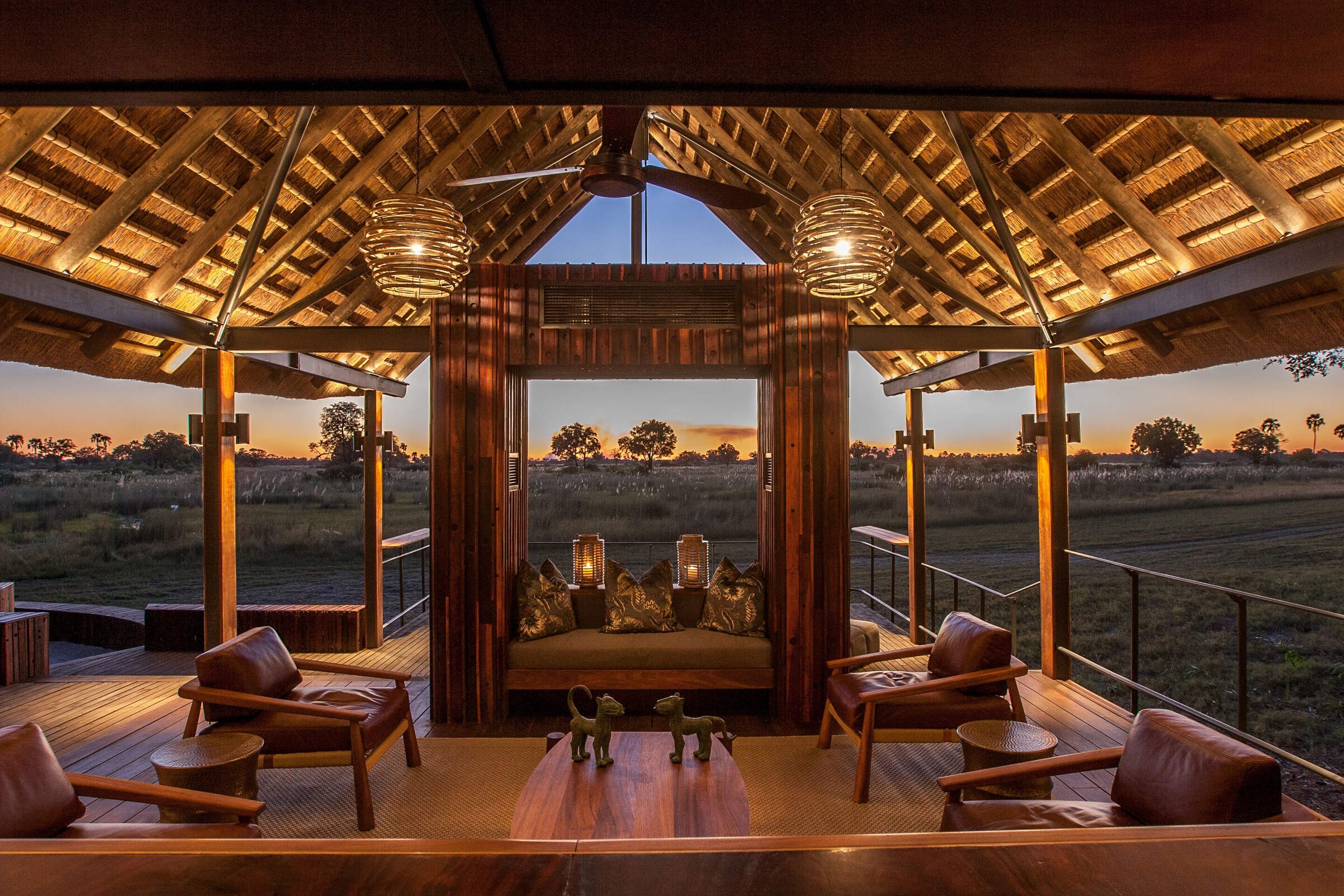
Chitabe Camp
In the southern Okavango Delta, the excellent Chitabe Camp concentrates on dry-land safaris in an area that we've found particularly good for wild dog sightings.
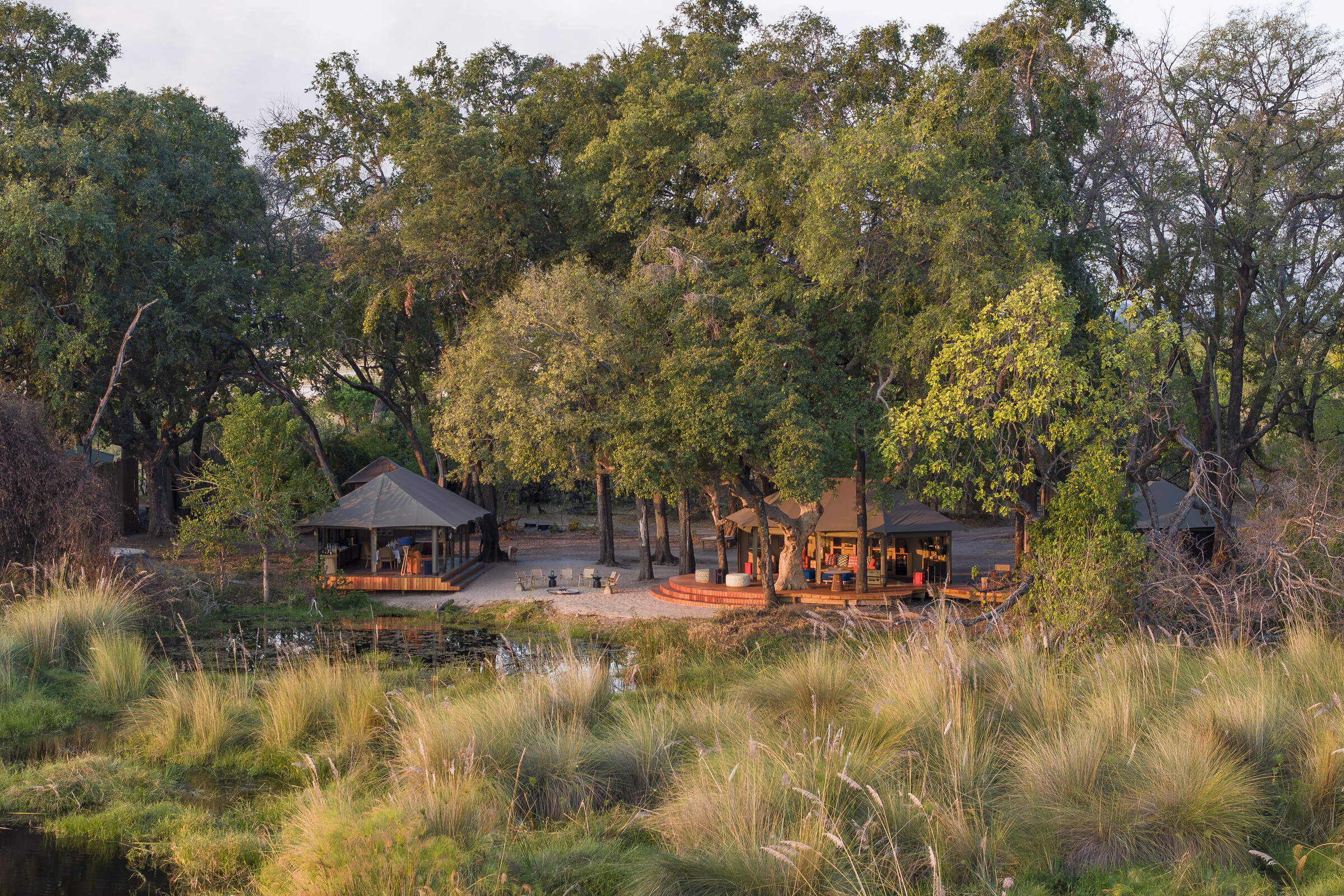
Shinde Footsteps
Small and simple, but comfortable, Shinde Footsteps focuses on walking safaris as well as game drives; it also runs a special children's programme so is particularly suitable for families.
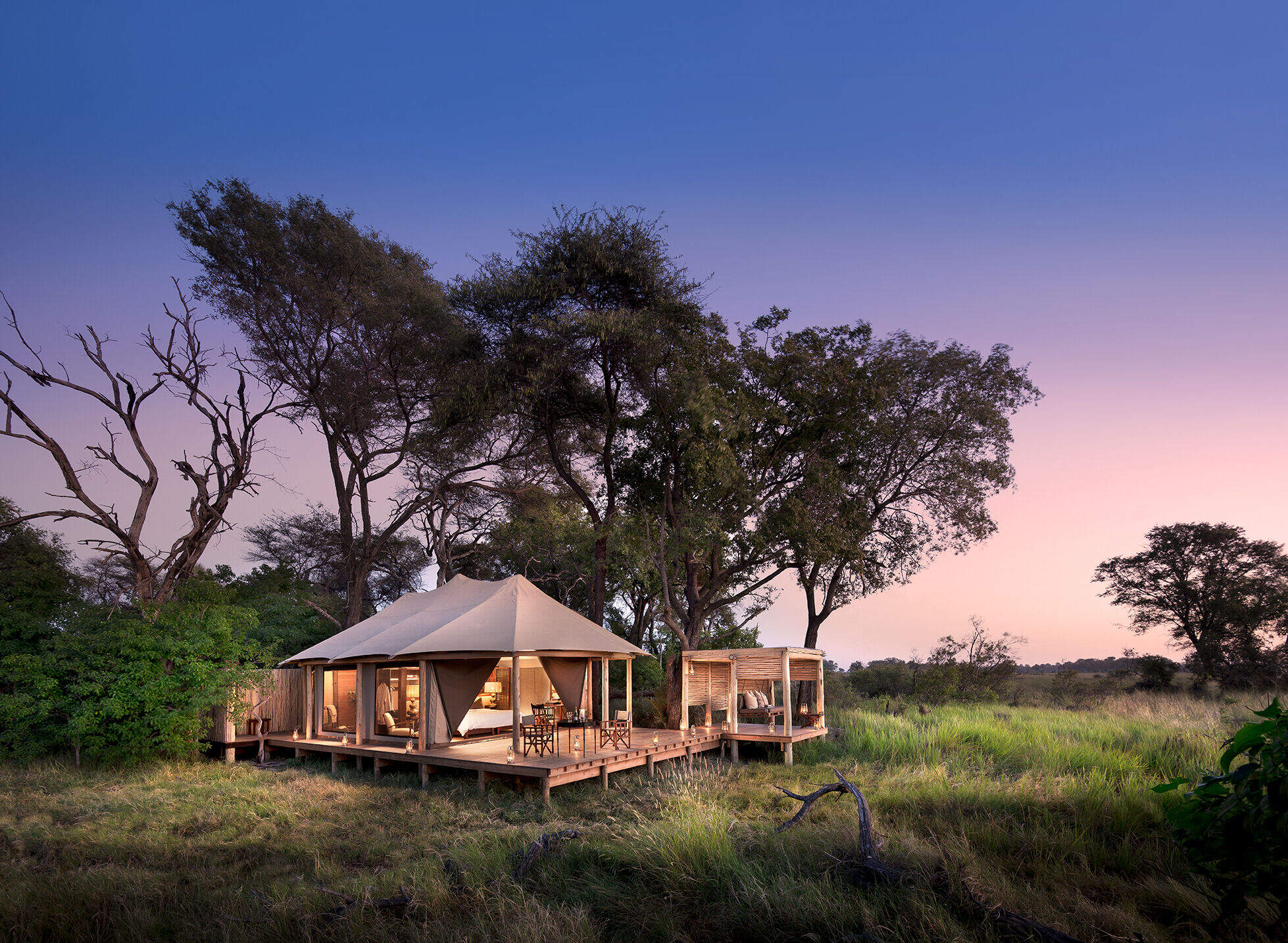
Nxabega Tented Camp
Nxabega offers a selection of both land- and water-based activities, plus very good guiding, food and service, but game viewing can be somewhat erratic.
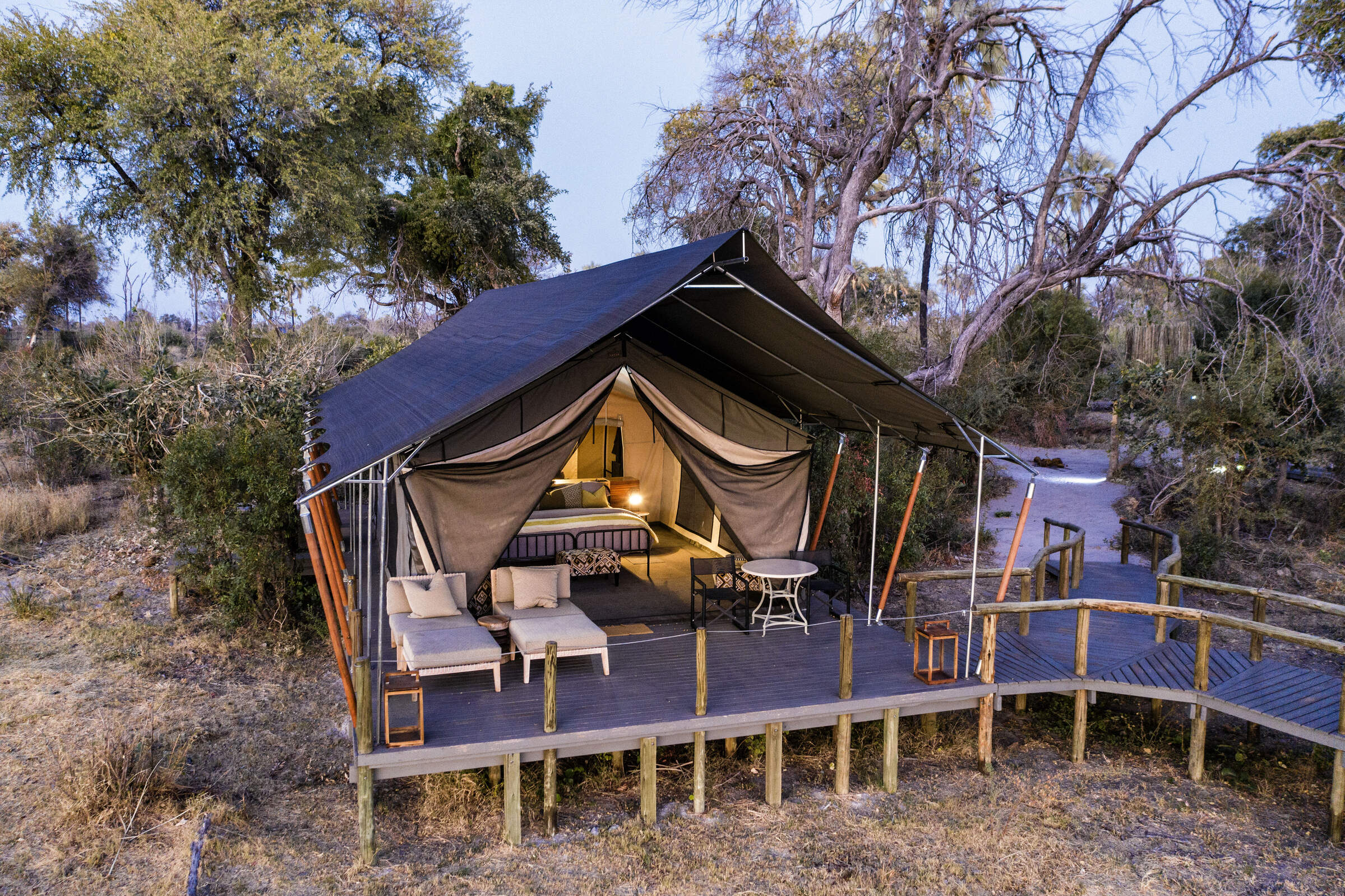
Gomoti Plains
Overlooking a tributary of the Gomoti River, Gomoti Plains Camp is a classically designed camp with very comfortable tents in a good game-viewing area.
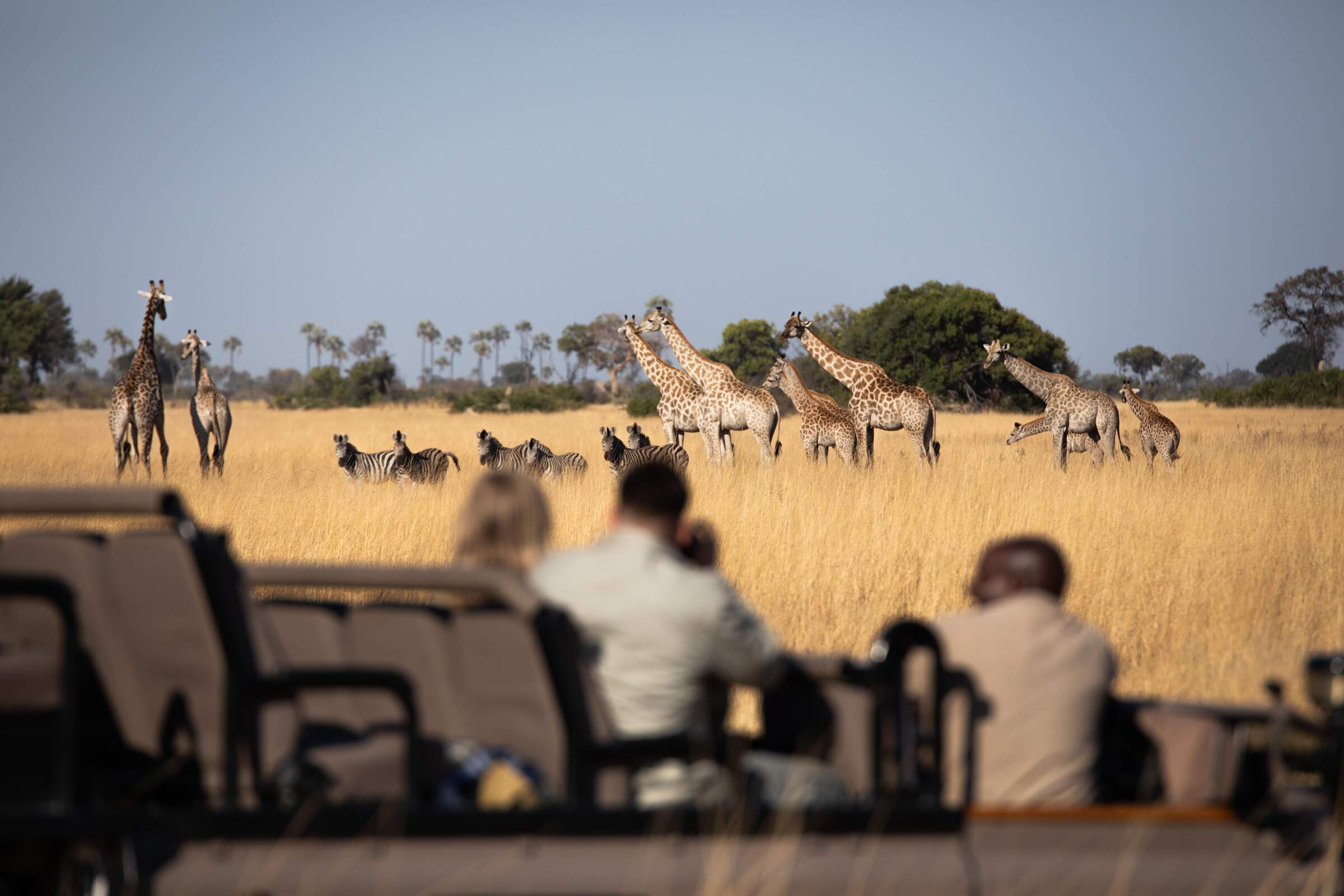
Tubu Tree Camp
A traditional tented camp with a distinctive tree-house feel, Tubu Tree offers some of the best game viewing in the Jao Reserve.
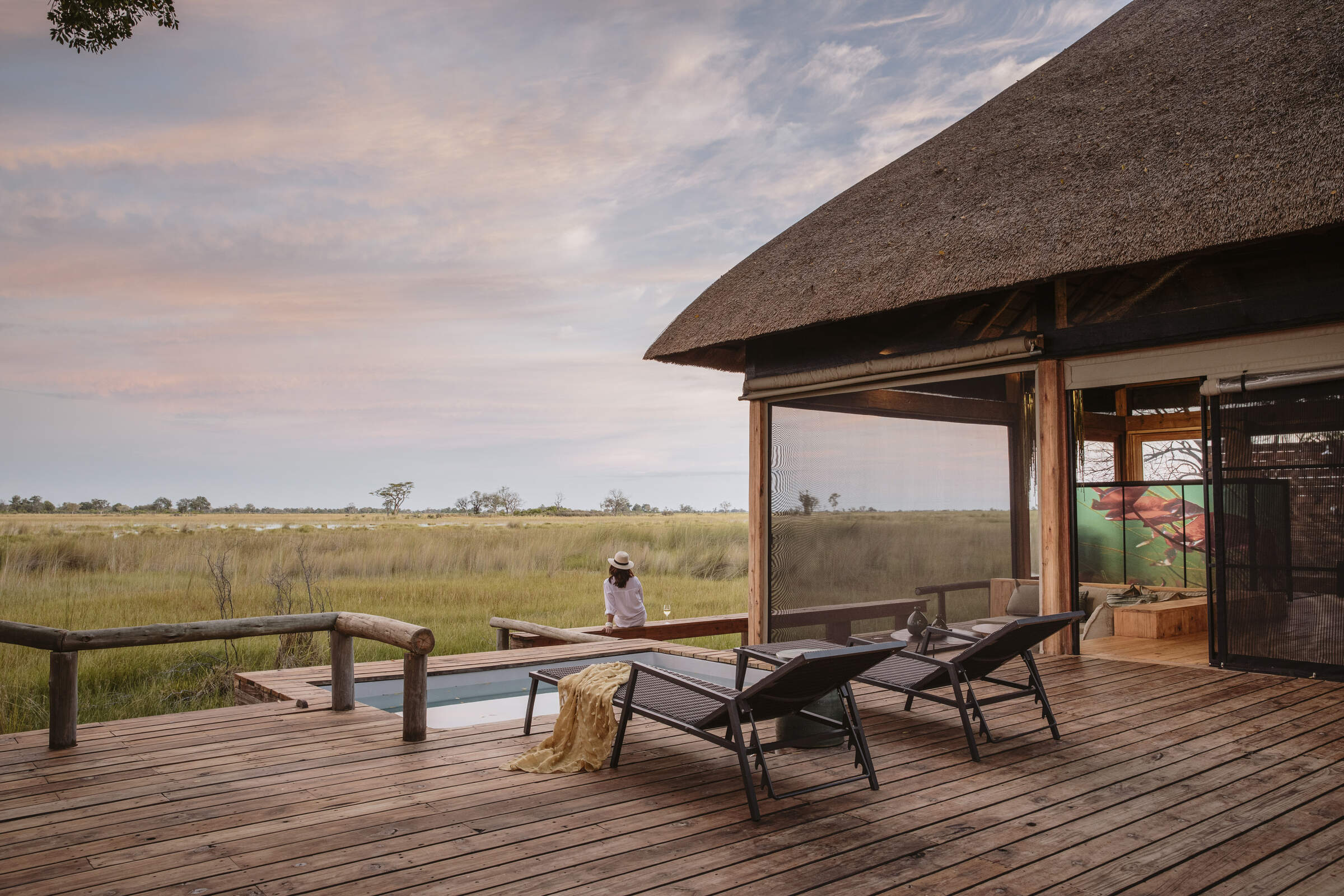
Vumbura Plains
Indulgently stylish and luxurious, Vumbura Plains offers superb game viewing and birding on an exceptionally varied private reserve.
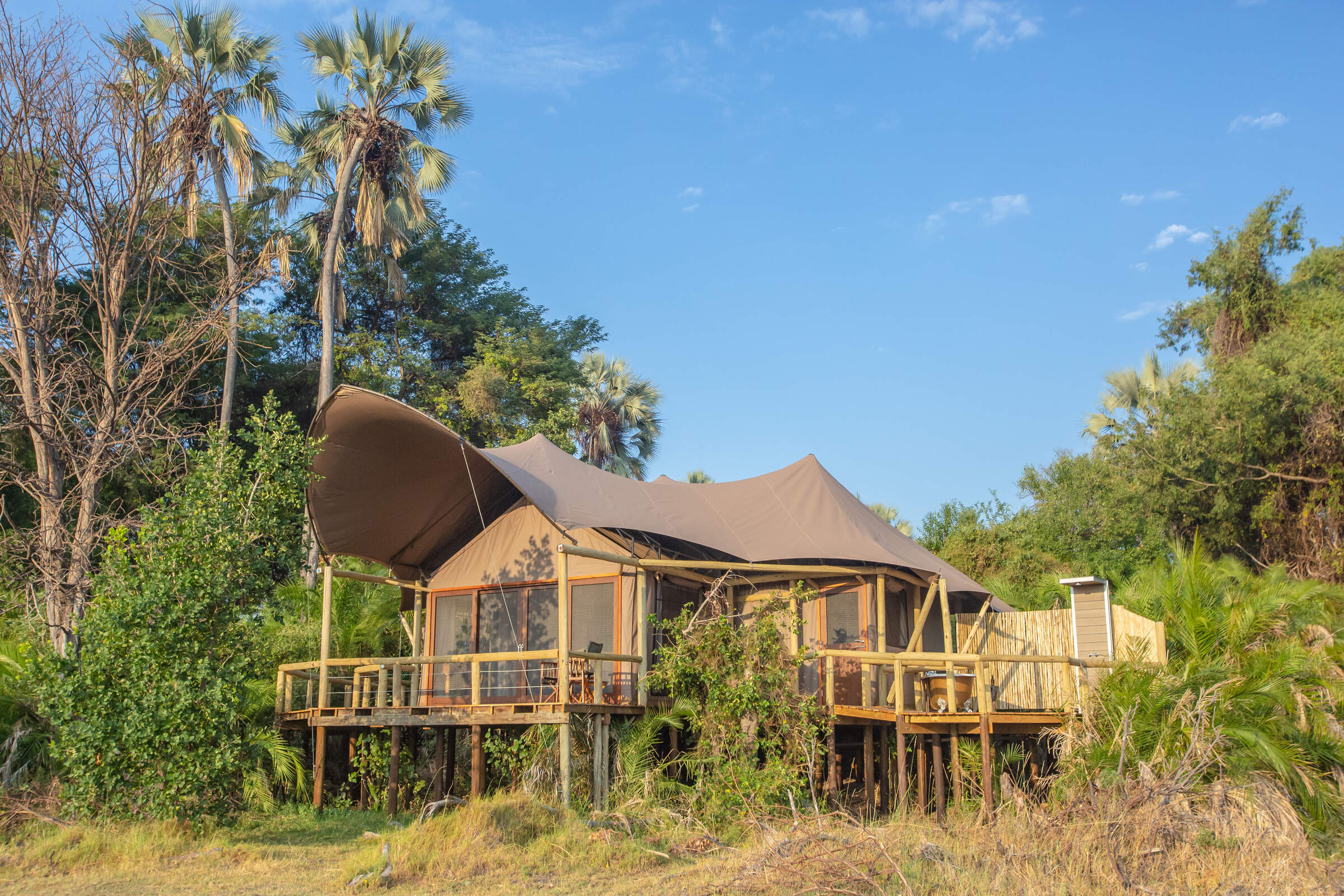
Jacana Camp
Jacana Camp is a small safari camp with an informal island feel; it is ideal for water-based activities in the Delta and offers excellent birdwatching.
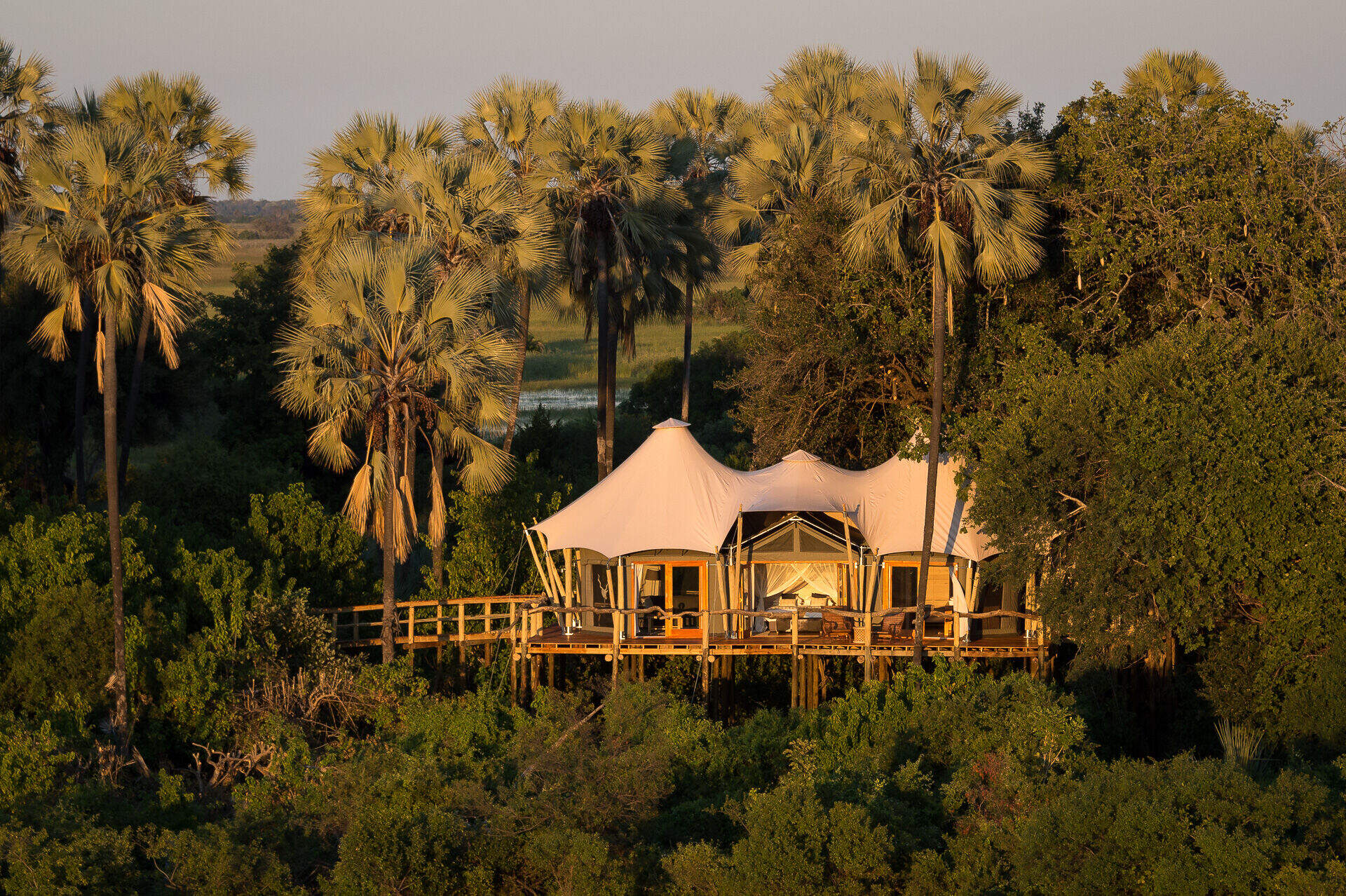
Kwetsani Camp
Deep in the Delta, overlooking a floodplain, Kwetsani Camp is a small, high-end camp with good access to areas for land and water-based activities.
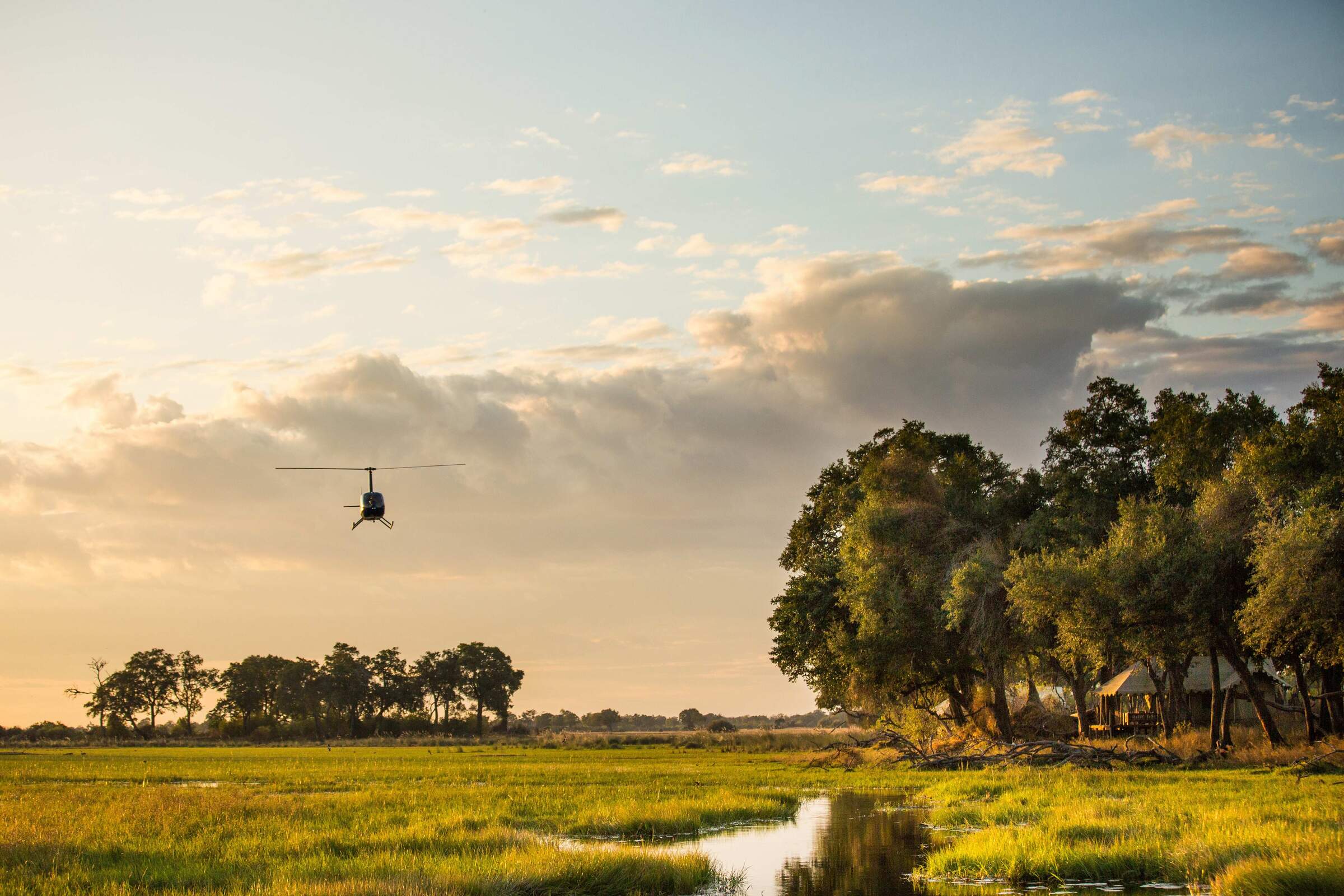
Duba Explorers Camp
Intimate and elegant, Duba Explorers Camp promises a firm safari focus in a remote corner of the Okavango, led by a team who value the highest guiding and hosting standards.
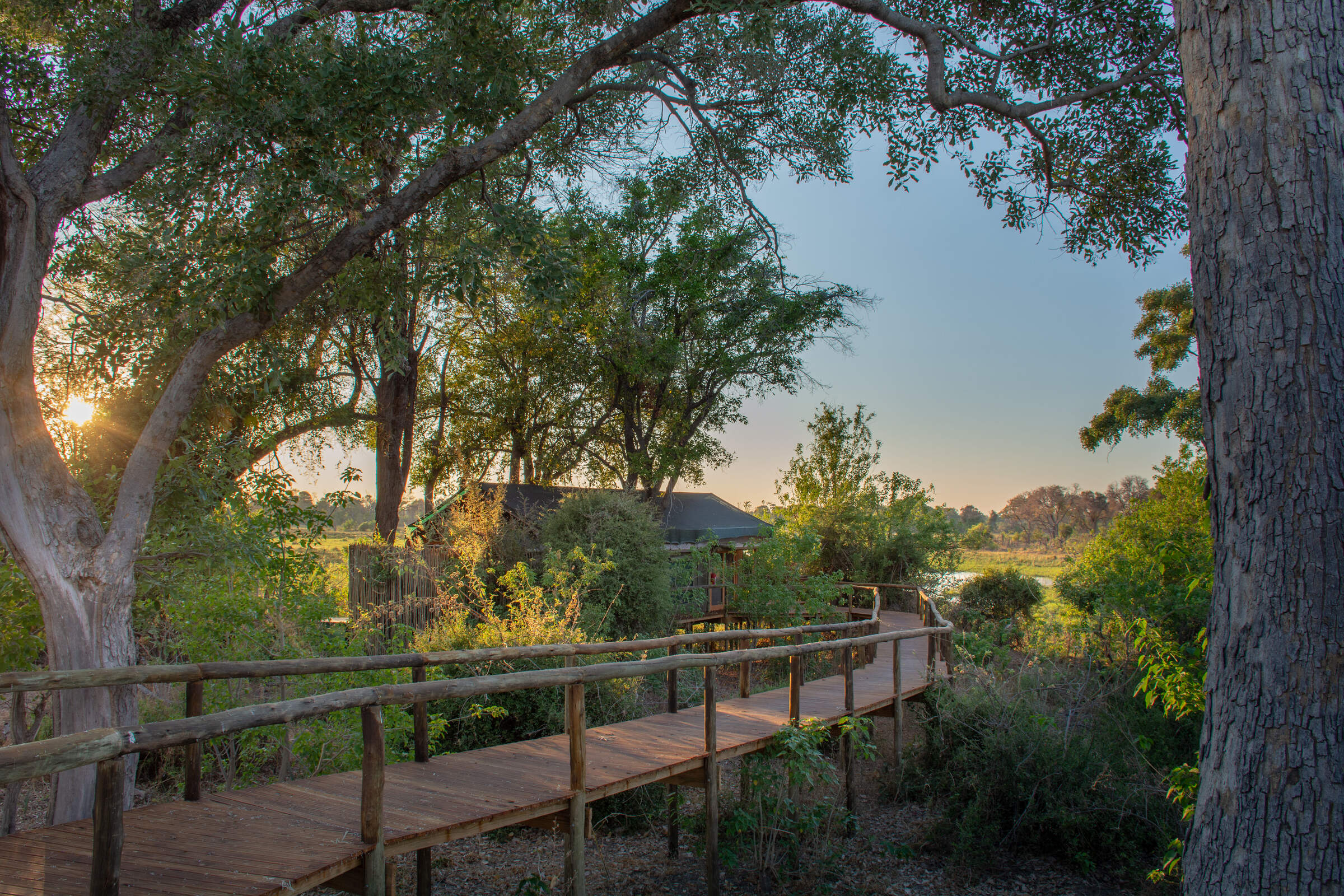
Mma Dinare
Beautifully located in a private concession overlooking the Gomoti River, the traditional Mma Dinare is very well-priced for the Okavango Delta.
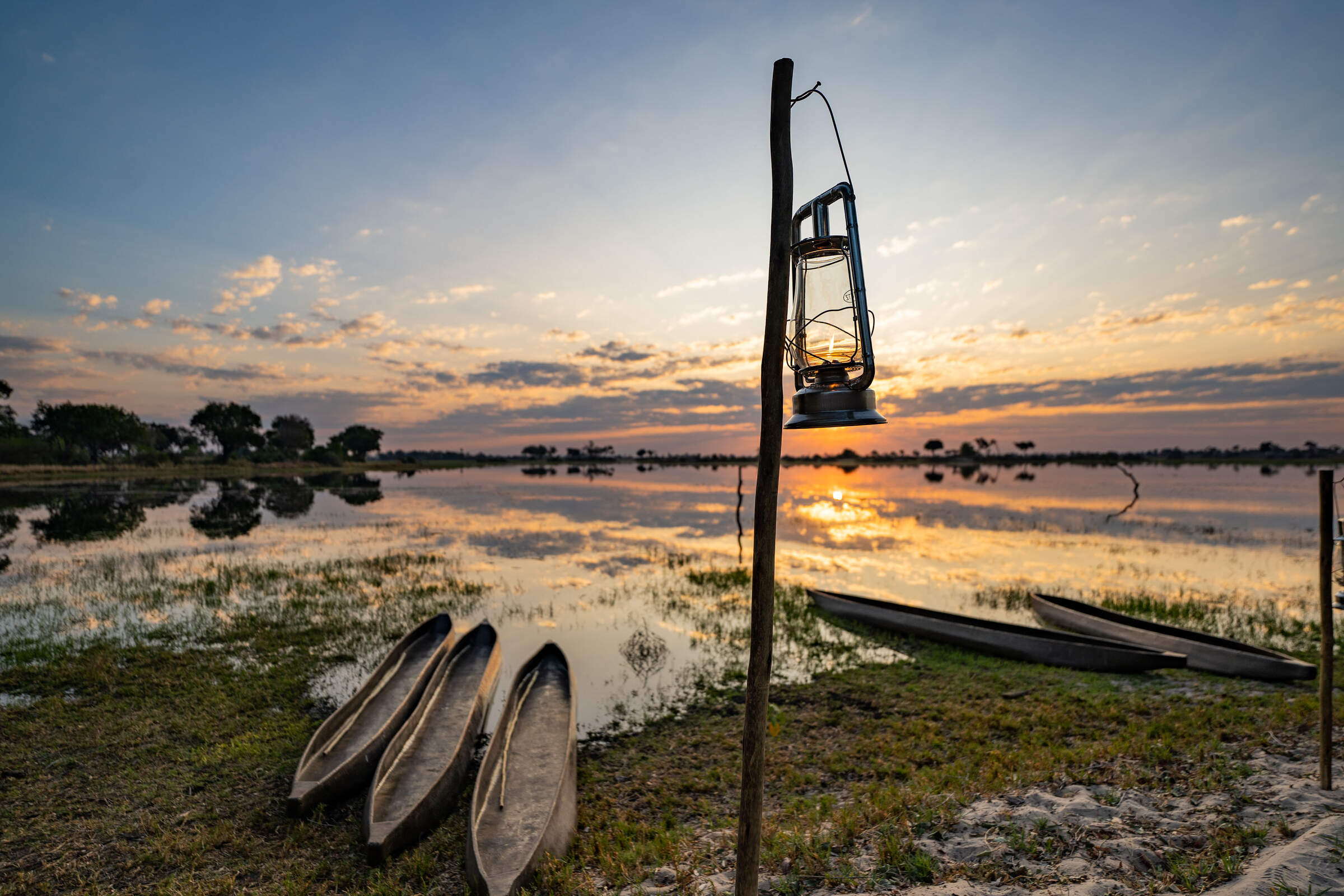
Pom Pom Camp
Amidst stunning Okavango Delta scenery, Pom Pom offers idyllic mokoro trips in season, great birdwatching, and increasingly good big-game sightings, especially leopards.
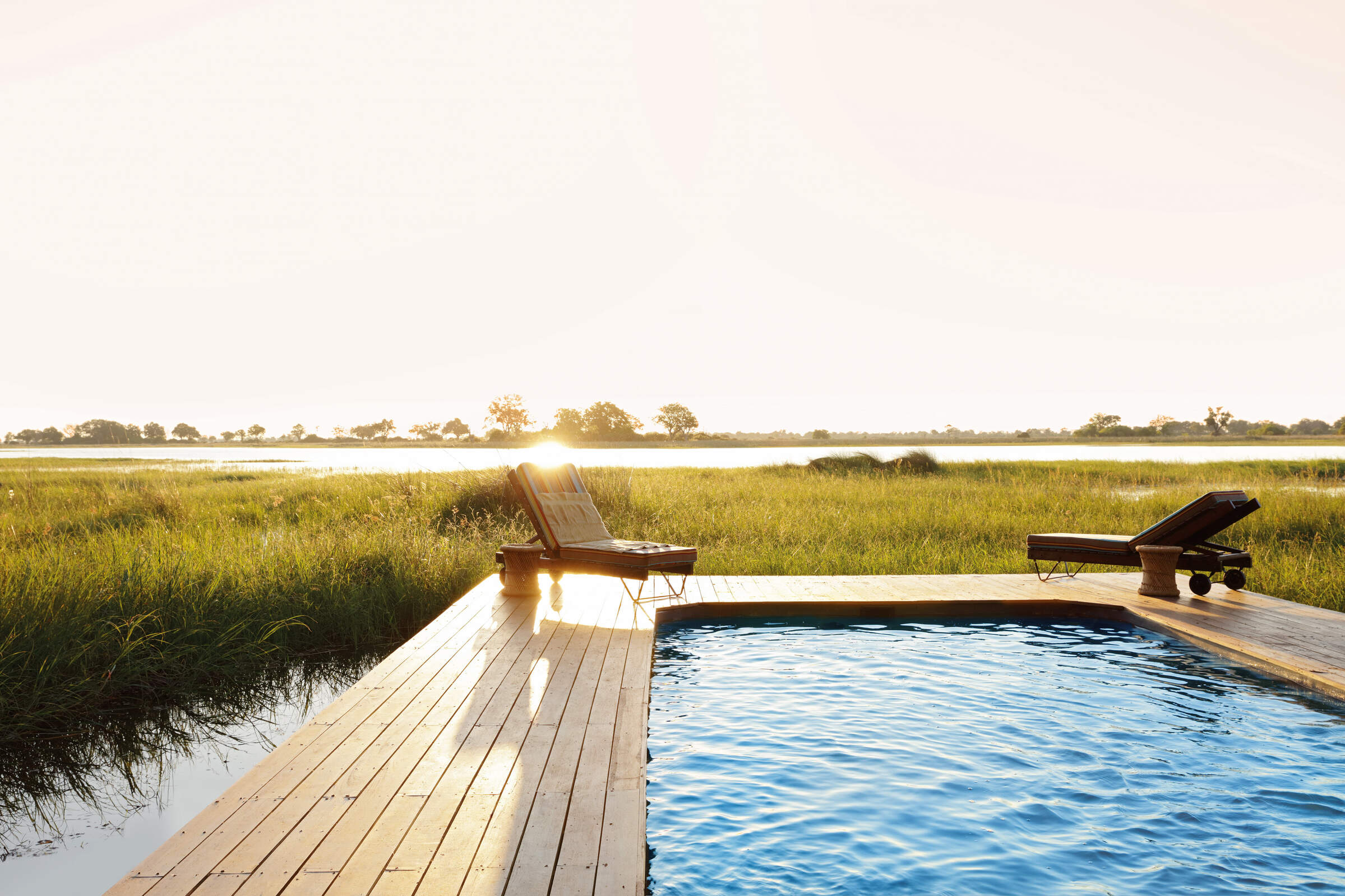
Mapula Lodge
For an affordable yet varied safari encompassing a range of eco-systems, the traditional Mapula Lodge takes a lot of beating.
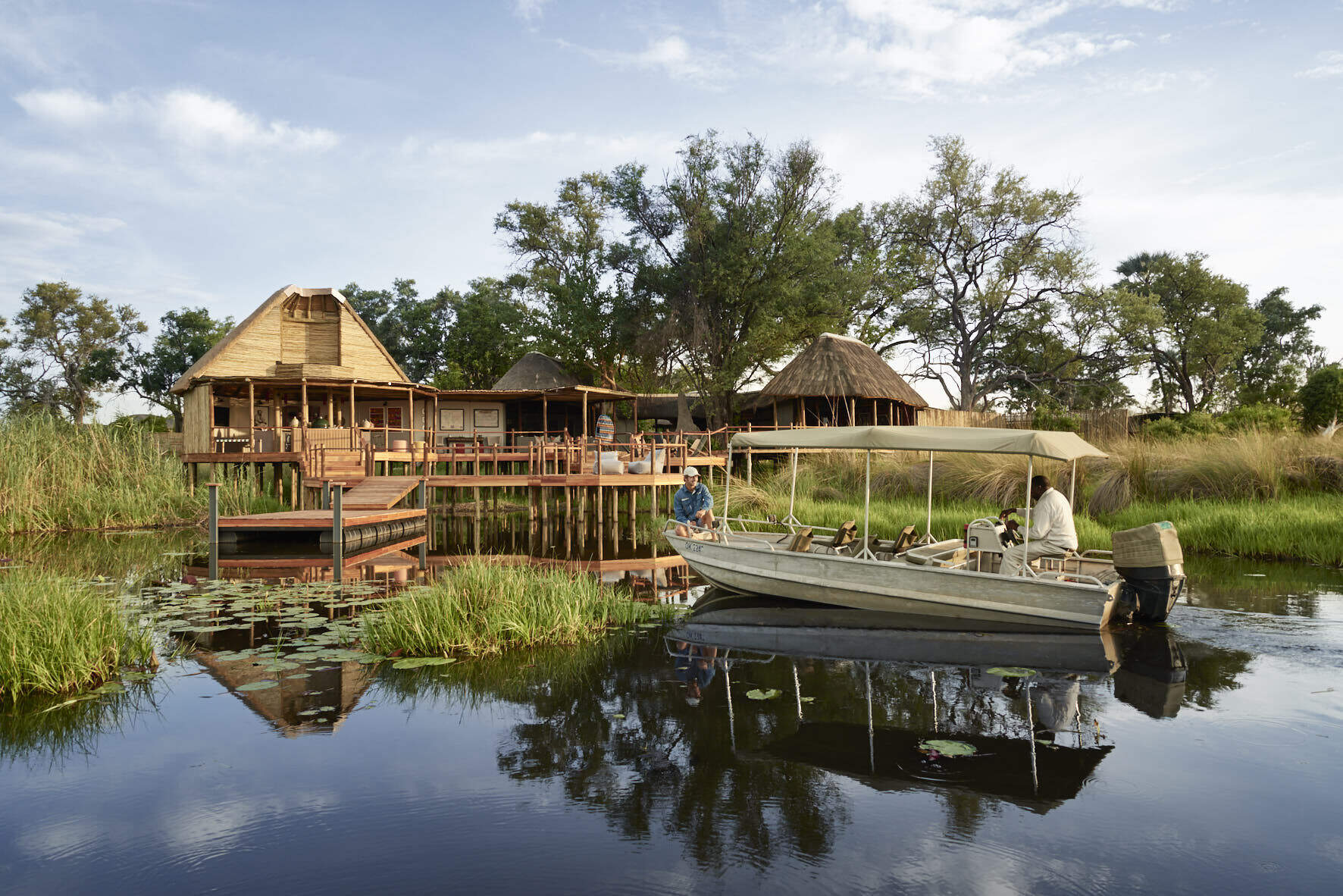
Baines' Camp
Baines' Camp is a well-run, intimate camp in a pretty part of the Okavango, offering a range of activities and the option to spend a morning walking with elephants.
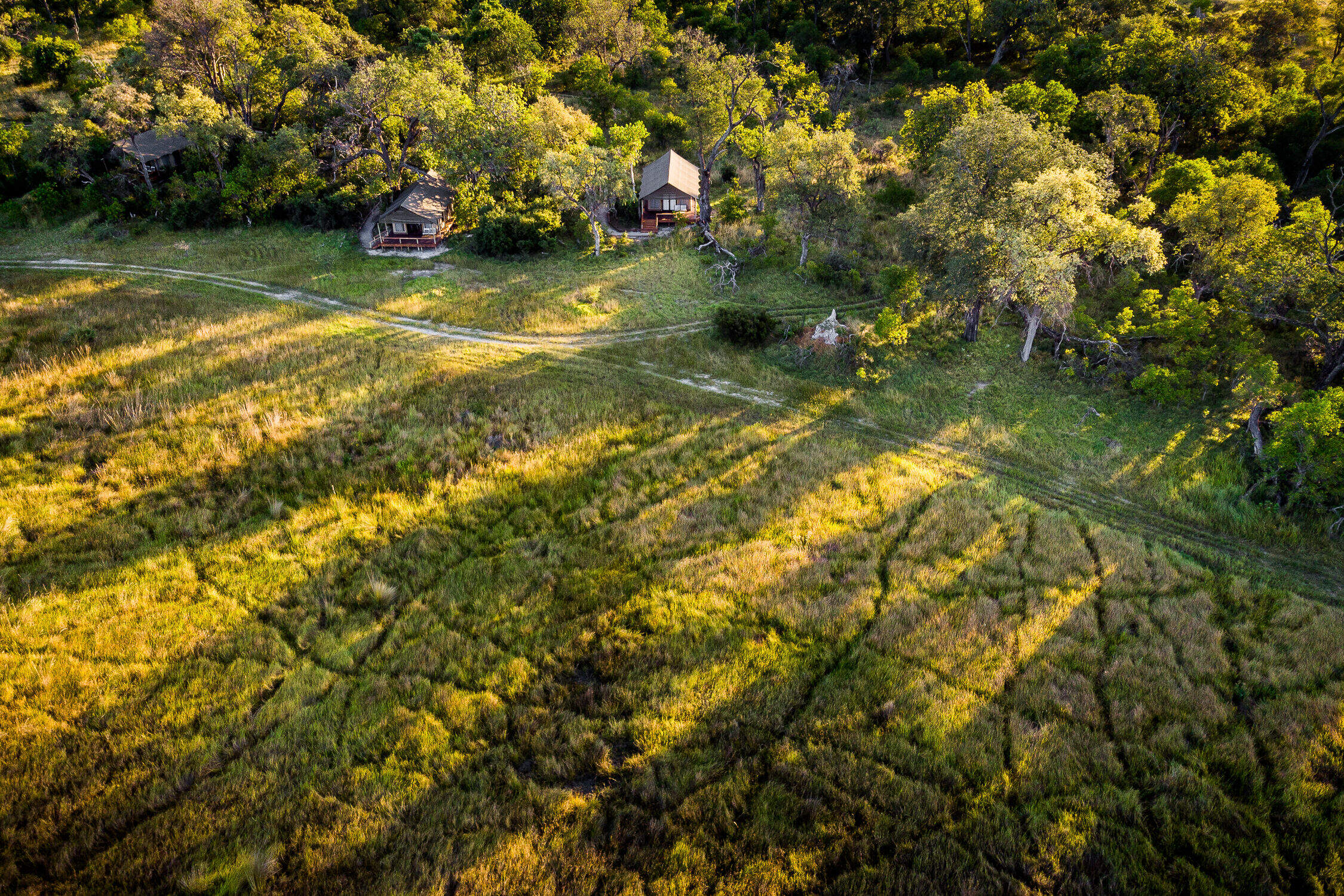
Stanley's Camp
In a private concession south of Moremi Game Reserve, Stanley's Camp offers 4WD game drives, seasonal water activities and a superb elephant interaction.
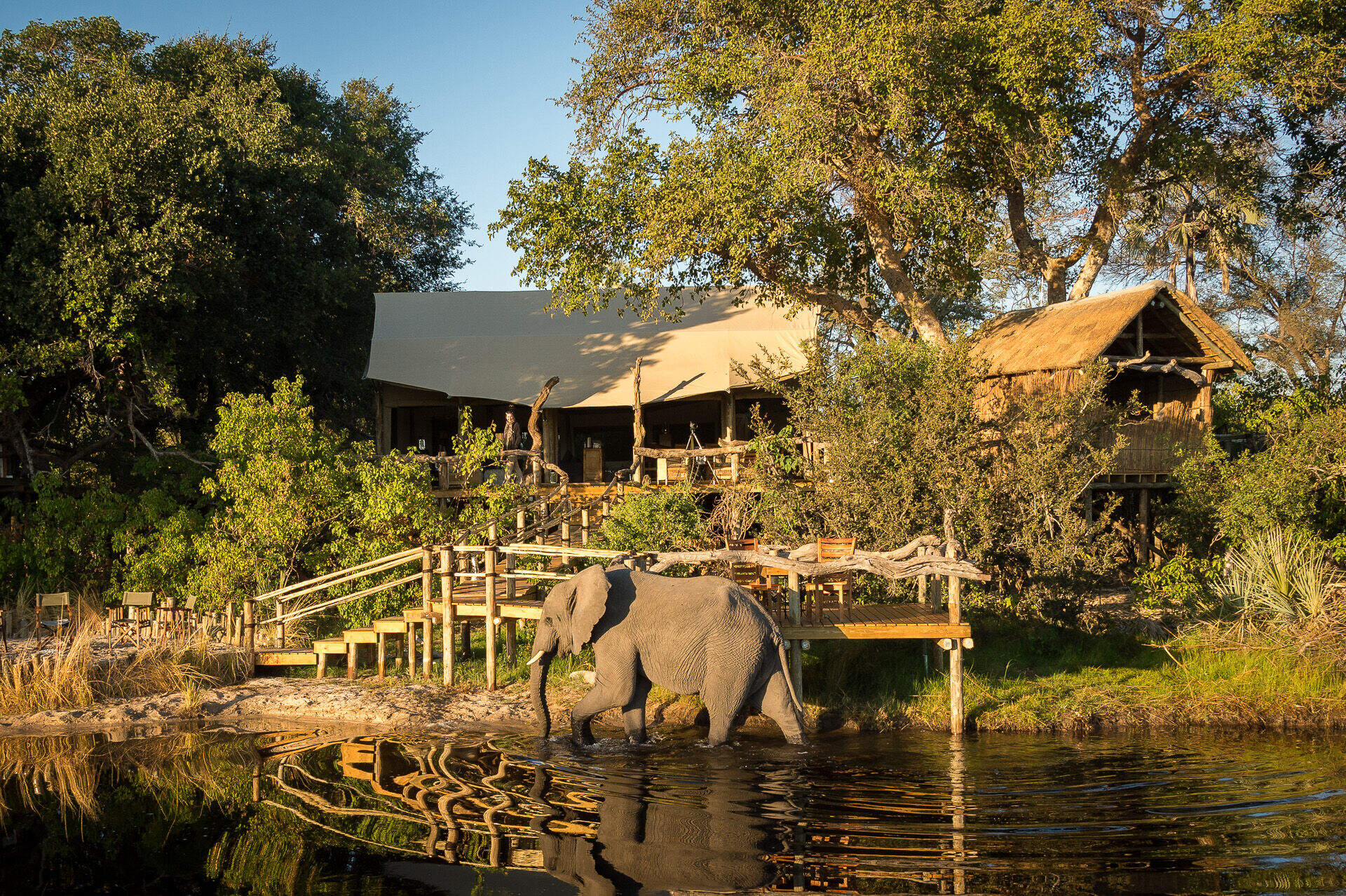
Little Tubu
Little Tubu is a new, traditional camp with just three tented chalets and a distinctive tree-house feel. The areas around it can be explored by water and land-based activities year round.
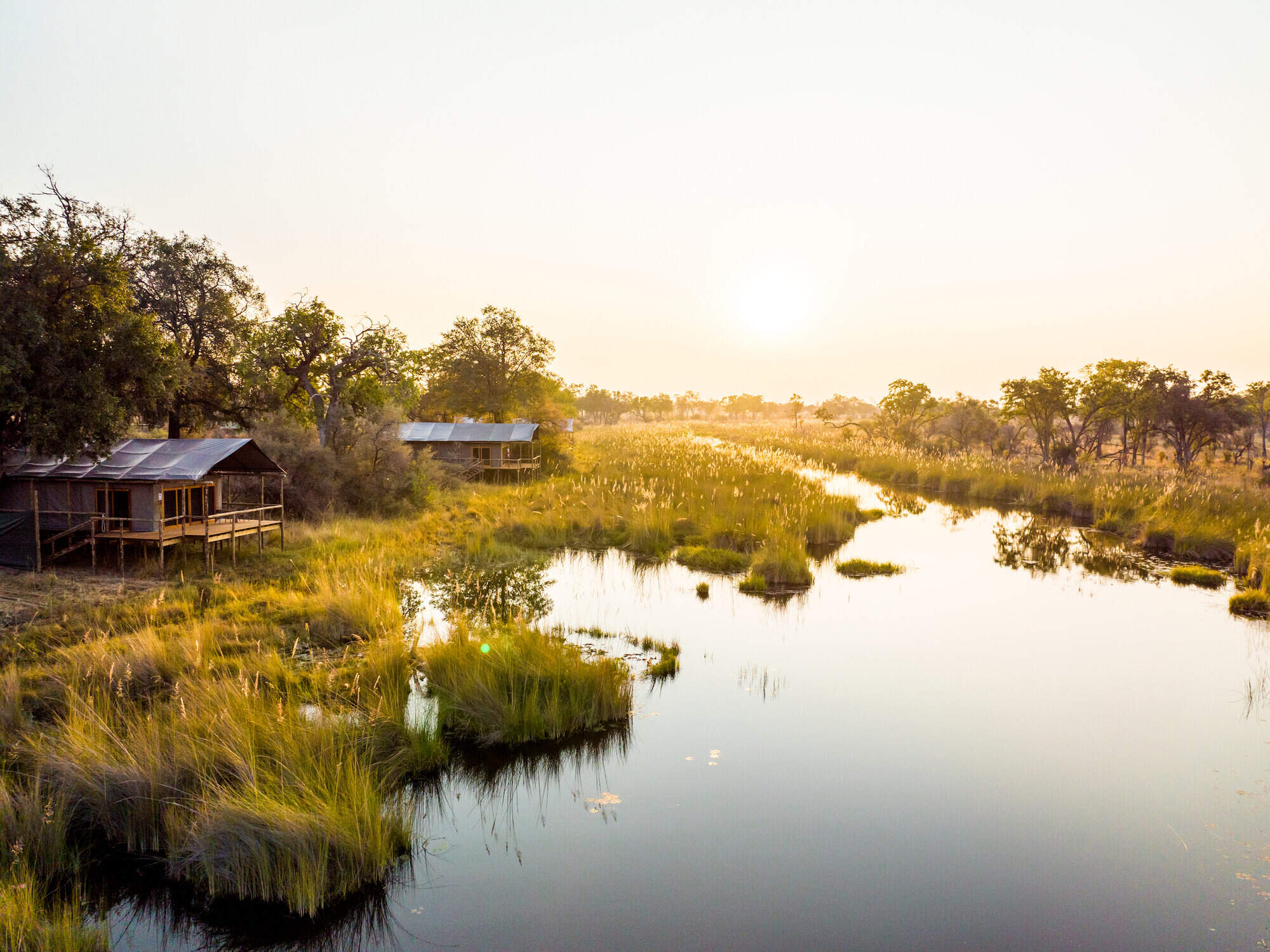
4 Rivers
4 Rivers is a new camp in a previously in accessible area of the excellent Kwara concession.
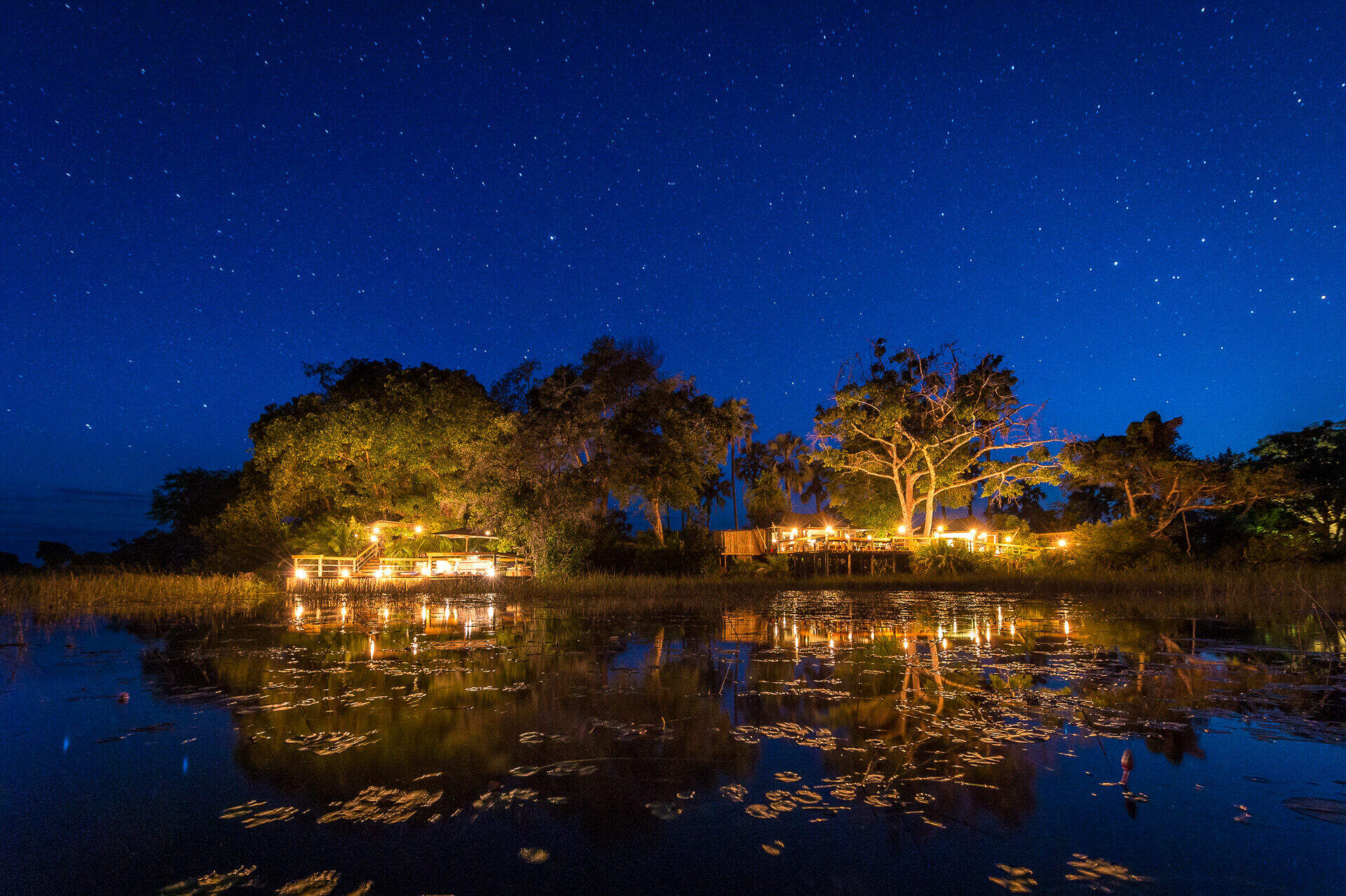
Pelo Camp
In a pristine wilderness environment deep in the Okavango Delta, the seasonal Pelo Camp is tented yet comfortable, with activities focusing on excursions by mokoro.
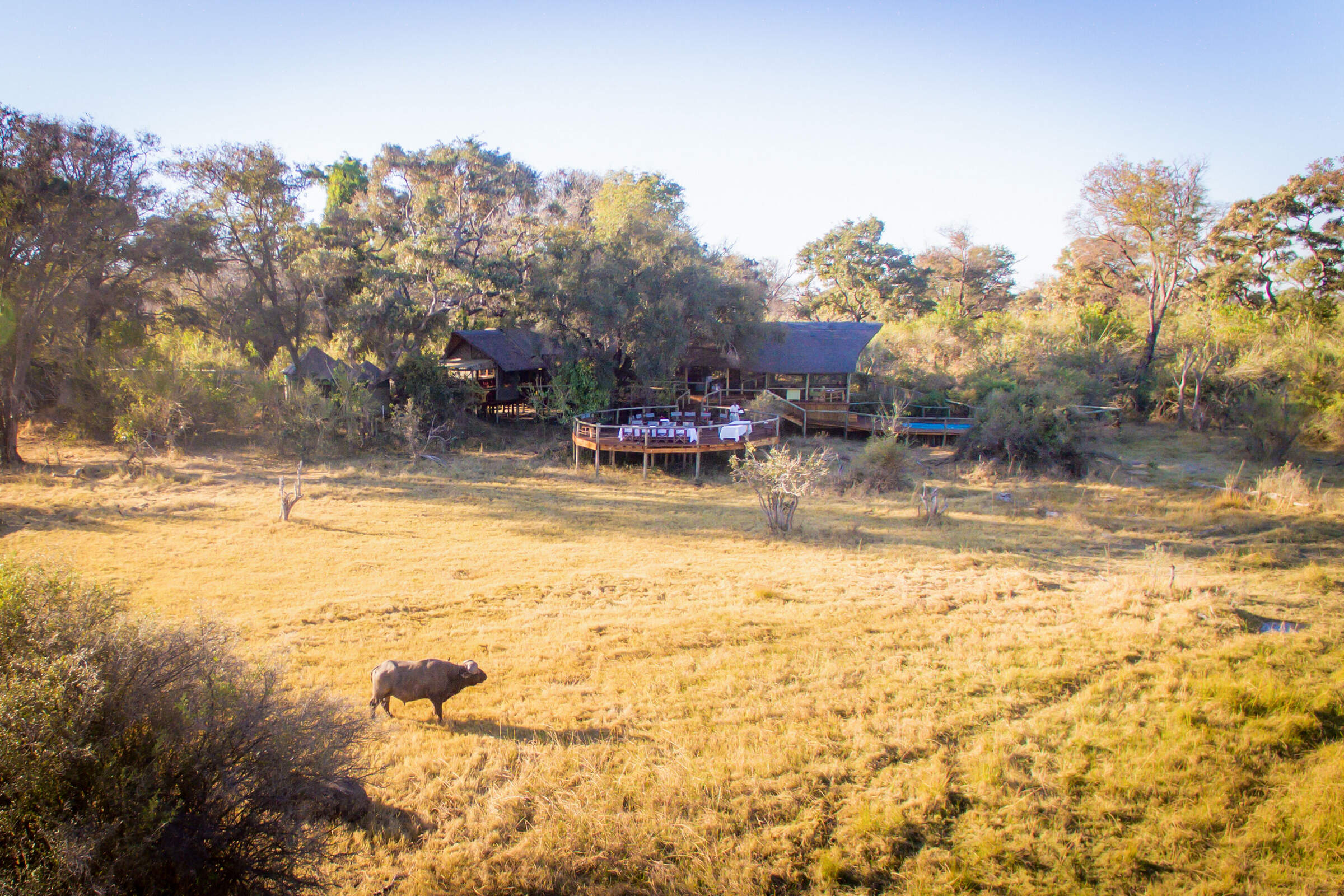
Rra Dinare
Located in a private concession in the southern reaches of the Okavango Delta, overlooking the Gomoti River, Rra Dinare is a traditional-style, well-priced camp.
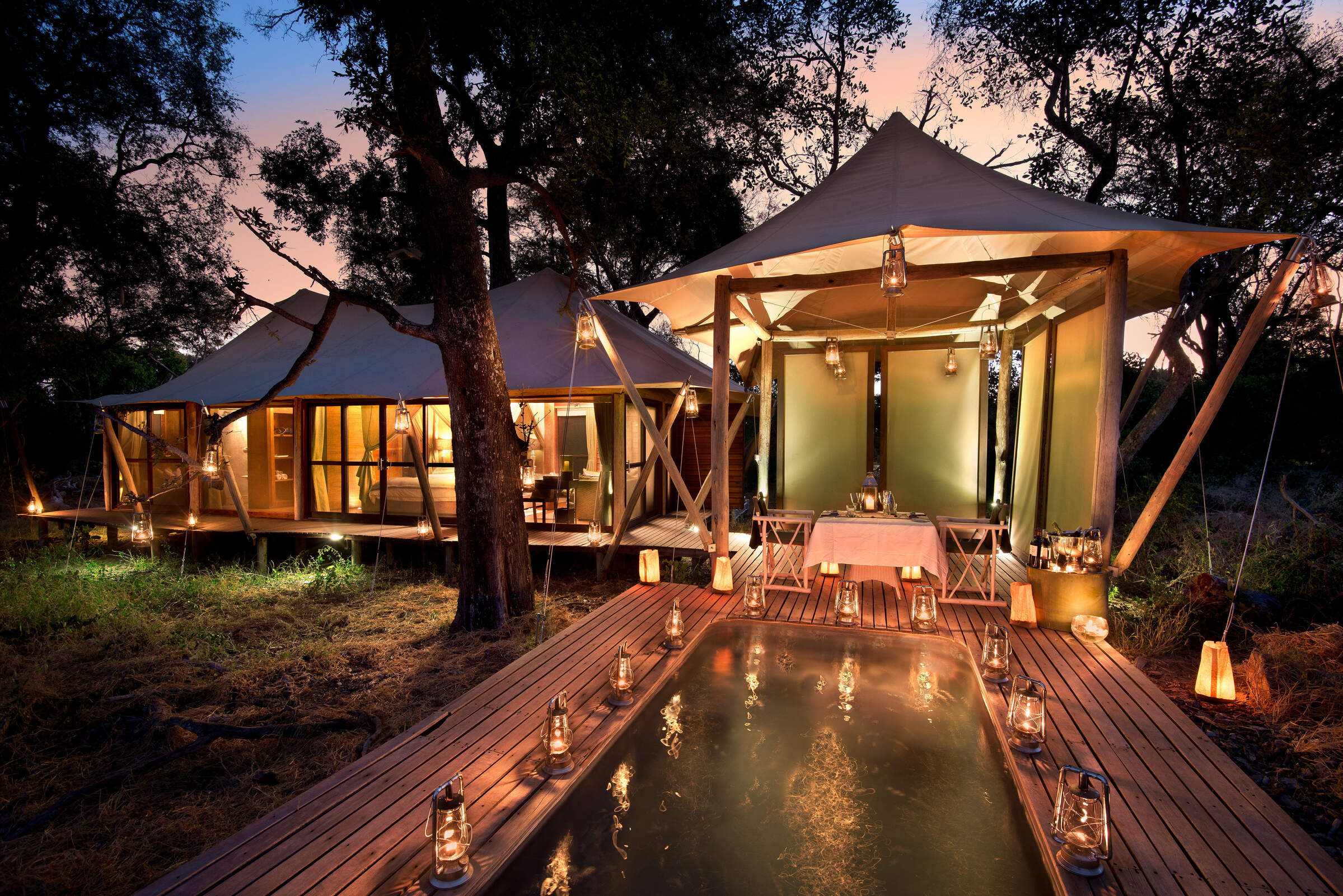
Xaranna
Xaranna is a plush tented camp amongst the idyllic waterways and islands of the Delta. Each air-conditioned tent has a plunge pool. Water activities and pampering are the focus here.
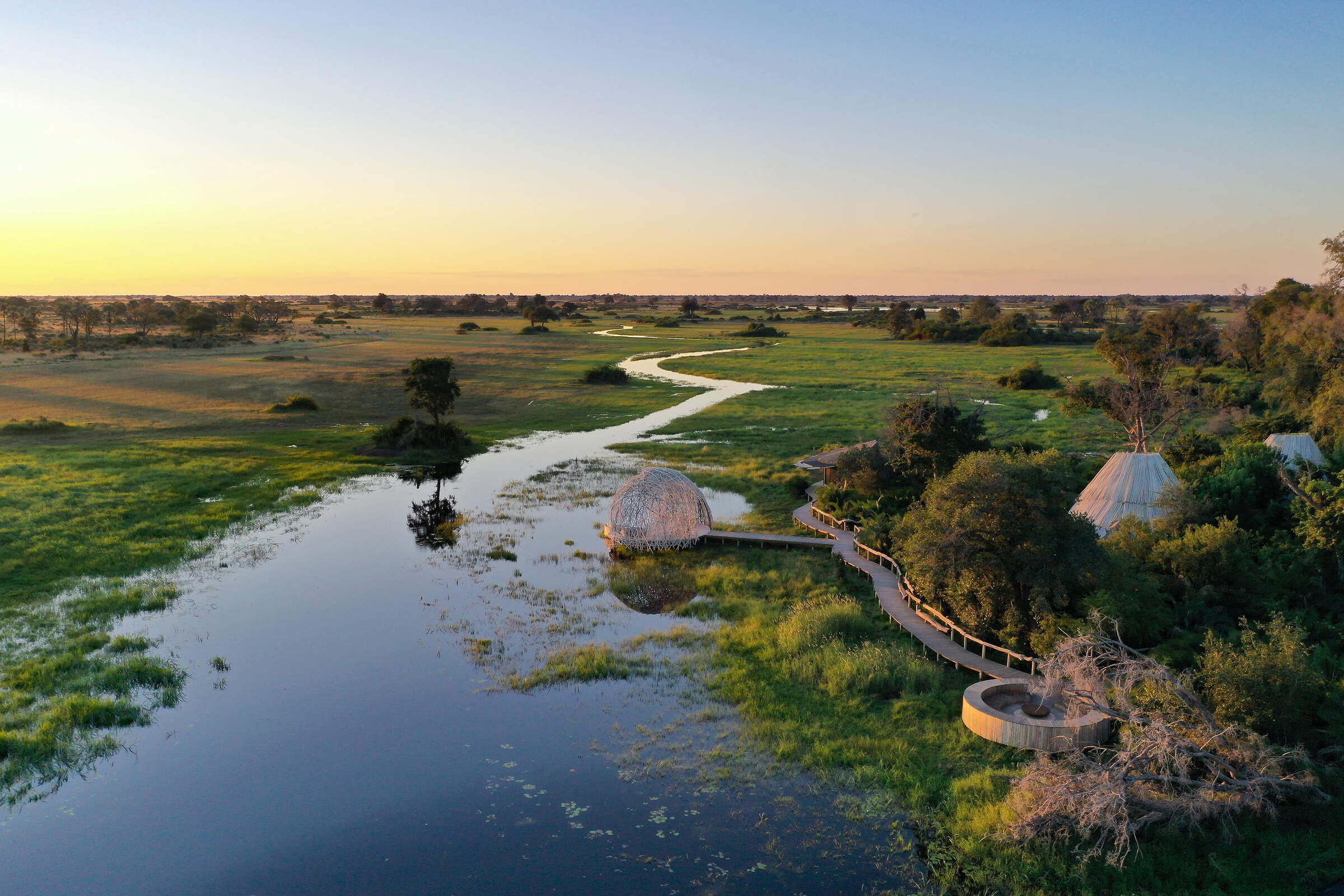
Jao Camp
In a beautiful area with fantastic water activities, Jao combines an idyllic location with high levels of luxury and service, and a top-end spa.
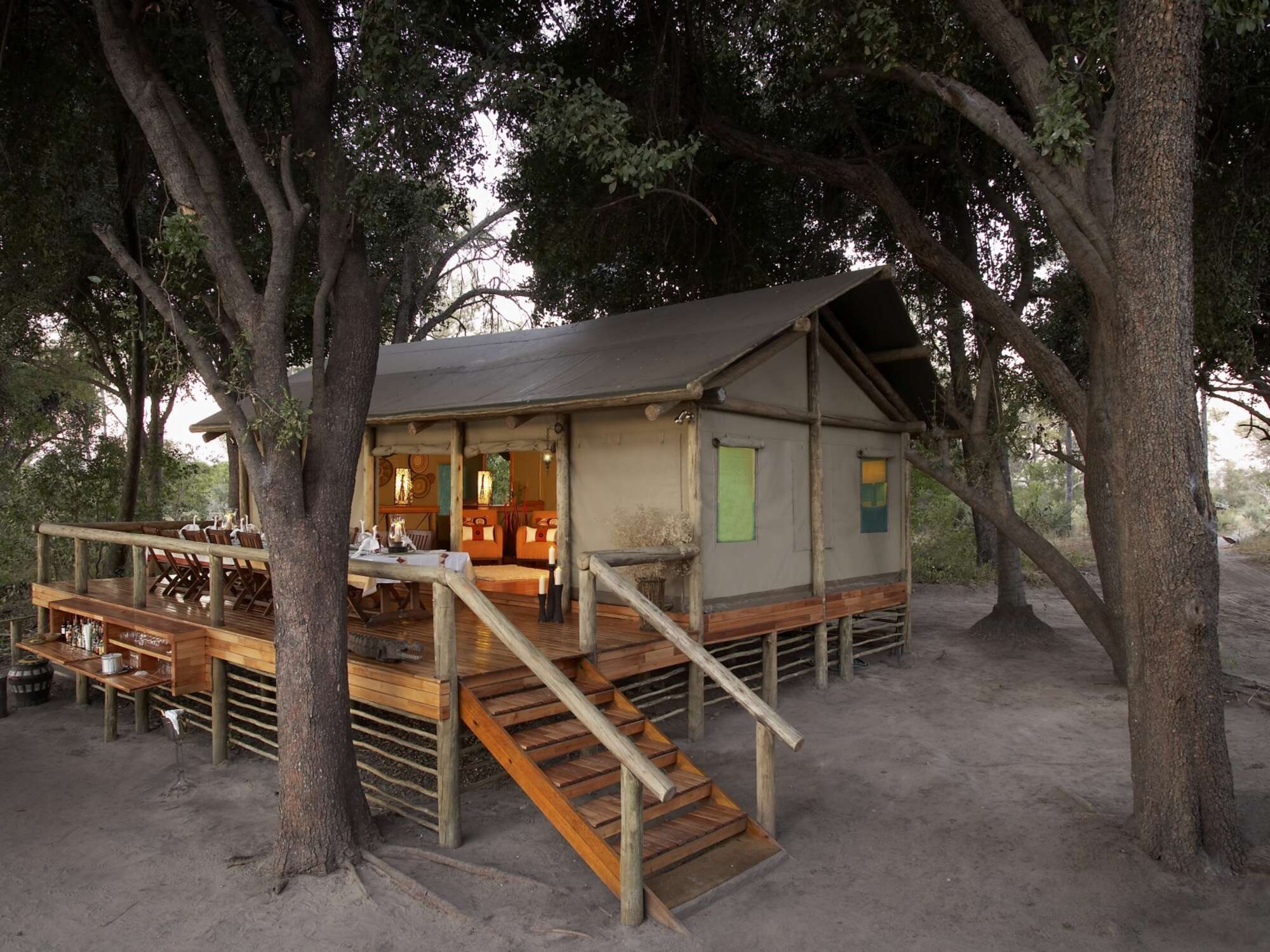
Seba Camp
Seba Camp is a luxury camp in a lovely location that offers the full range of water and land safari activities, depending on the time of year. This camp is particularly suitable for families.
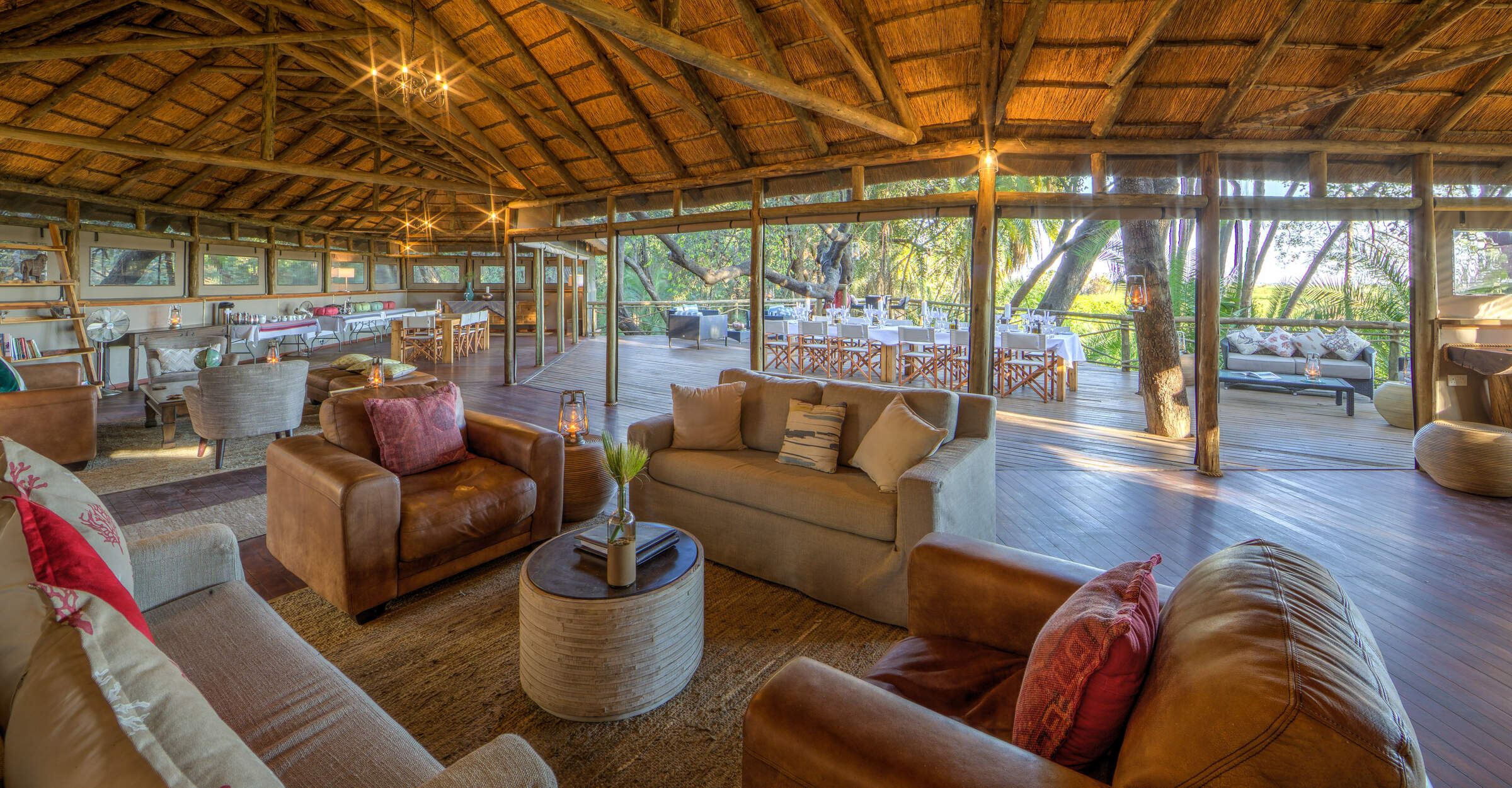
Setari Camp
Setari Camp stands on an island dotted with palm trees, close to the base of the Okavango’s ‘Panhandle"
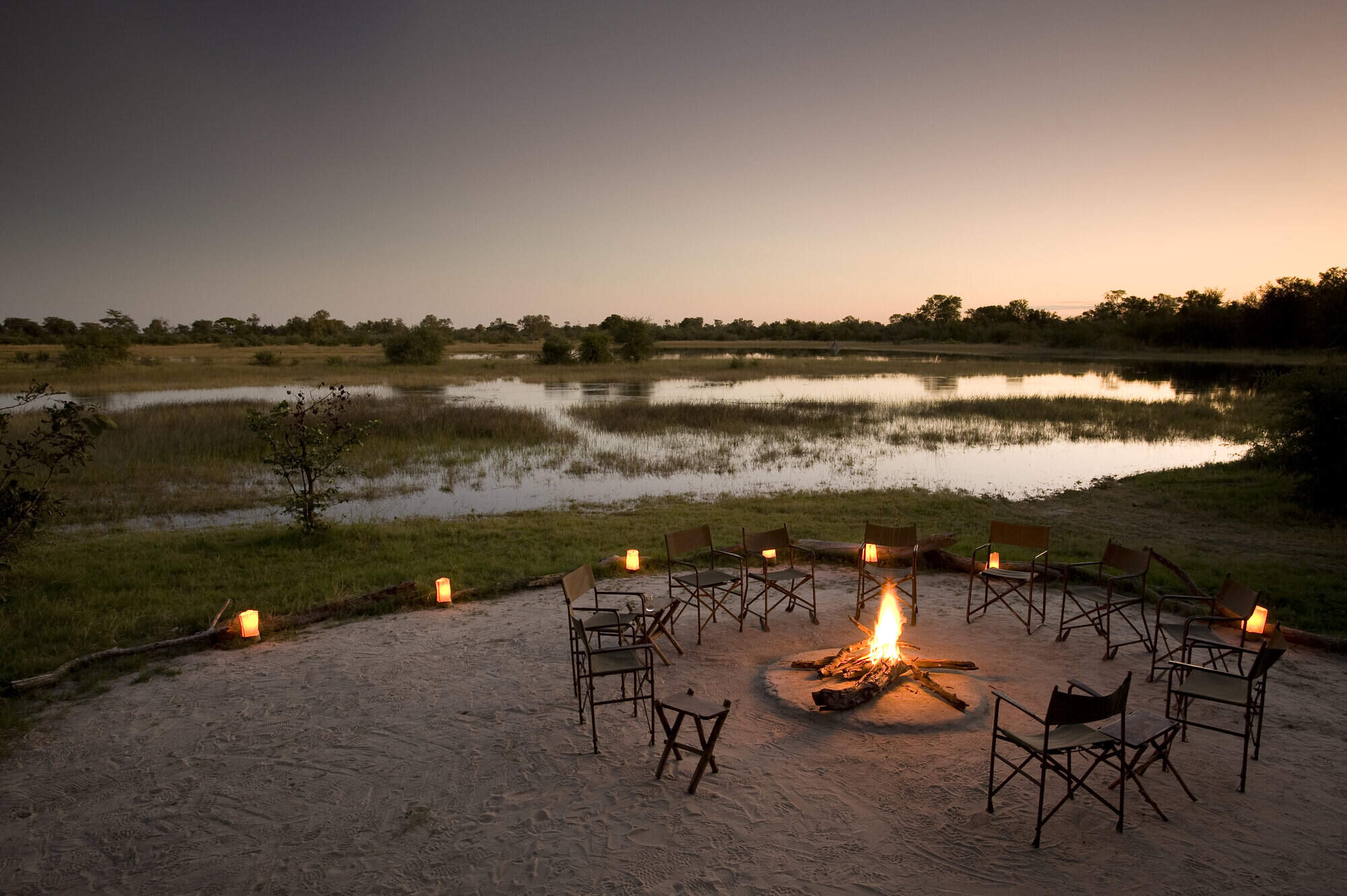
Okavango Explorers
The traditional, tented Okavango Explorers Camp offers a mix of walking, canoeing and game drives led by great guides in a wildlife-rich area.
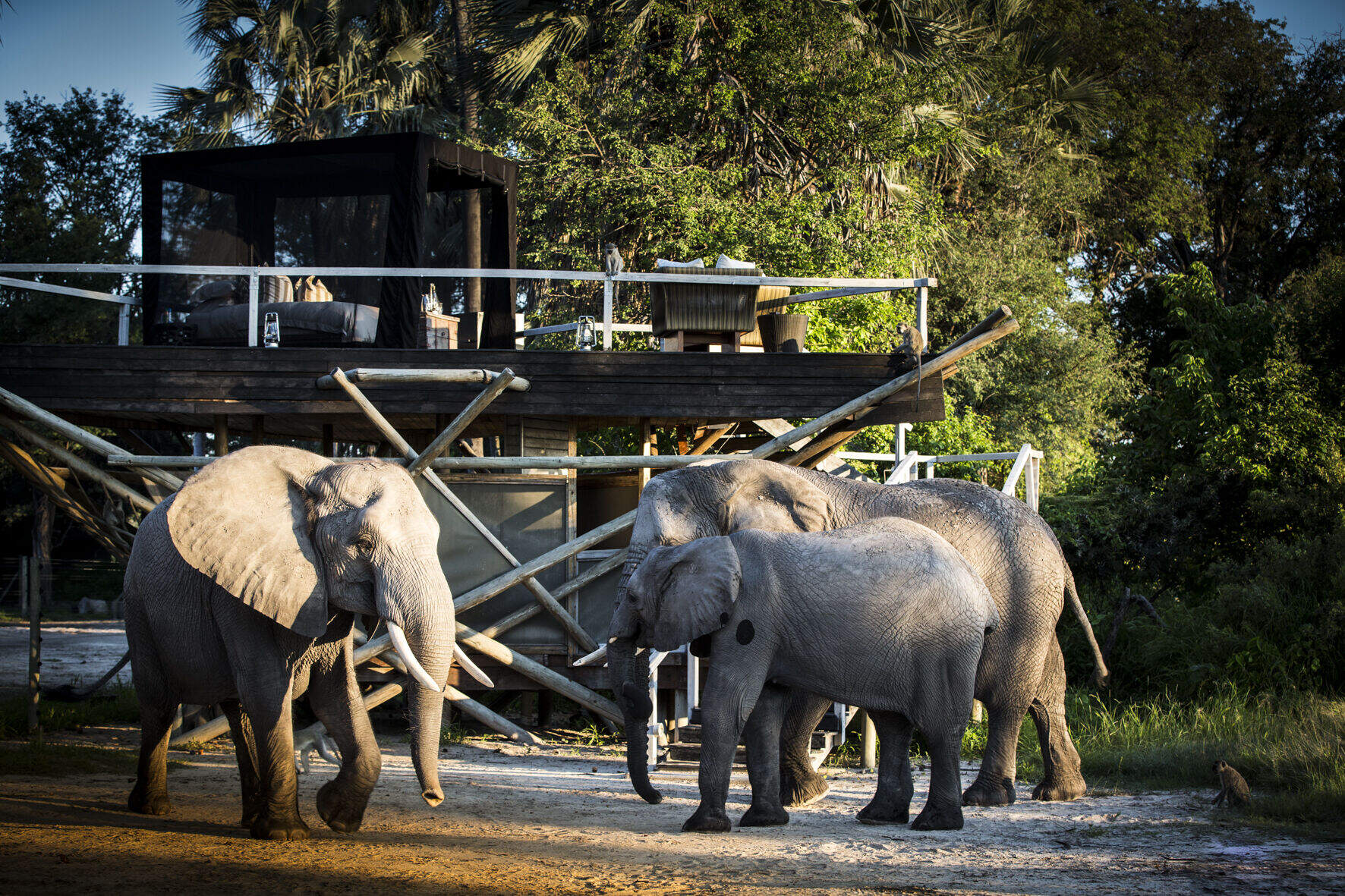
Abu Camp
Abu Camp is an exclusive safari camp on the western side of the Botswana's Okavango Delta - offering superb elephant-back safaris and opportunities to walk with them too.
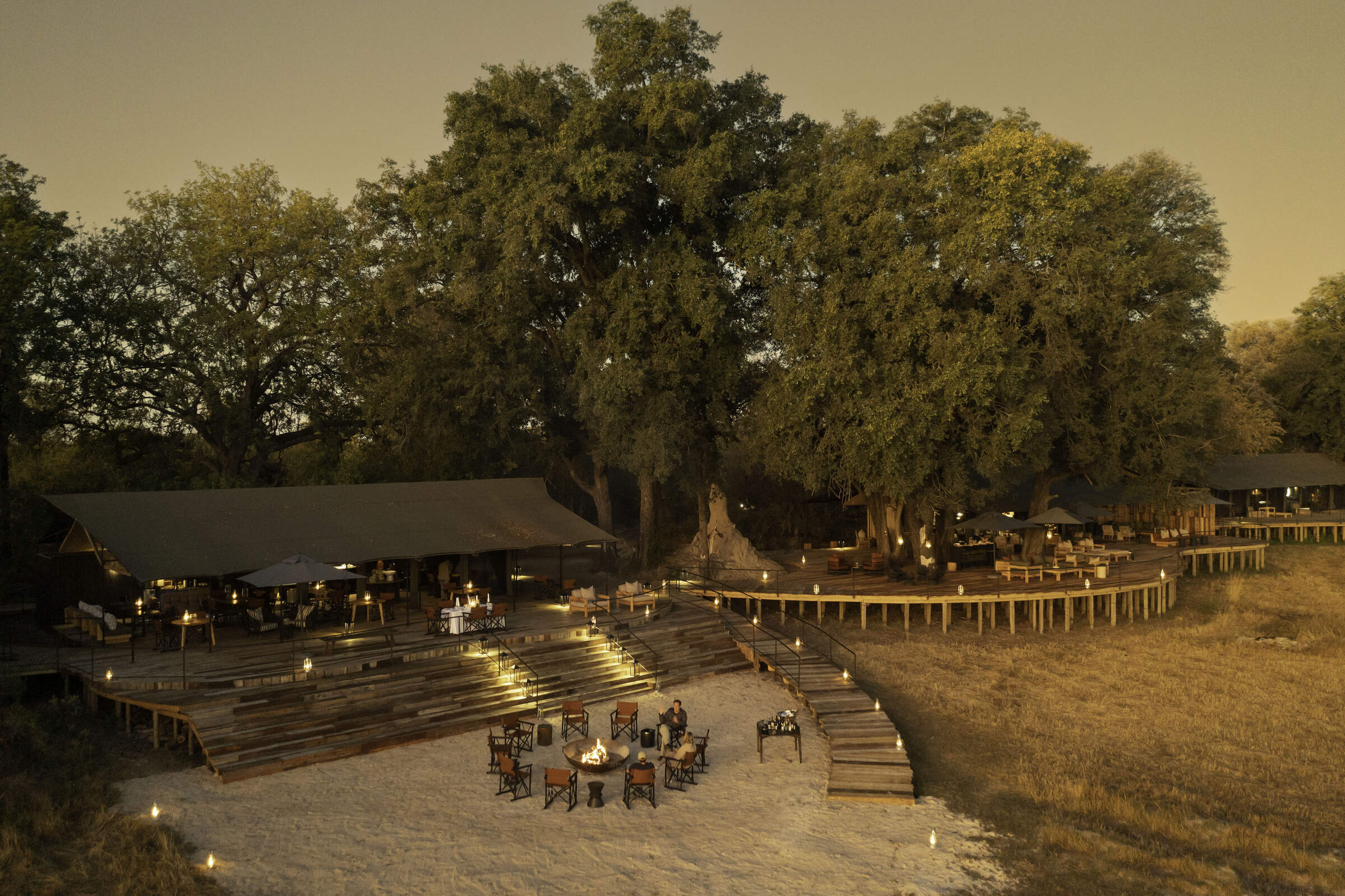
Kiri Camp
Kiri Camp is the latest Okavango offering from the excellent team behind Machaba. In an exciting new location in the heart of the Delta we cannot wait to visit this new camp.
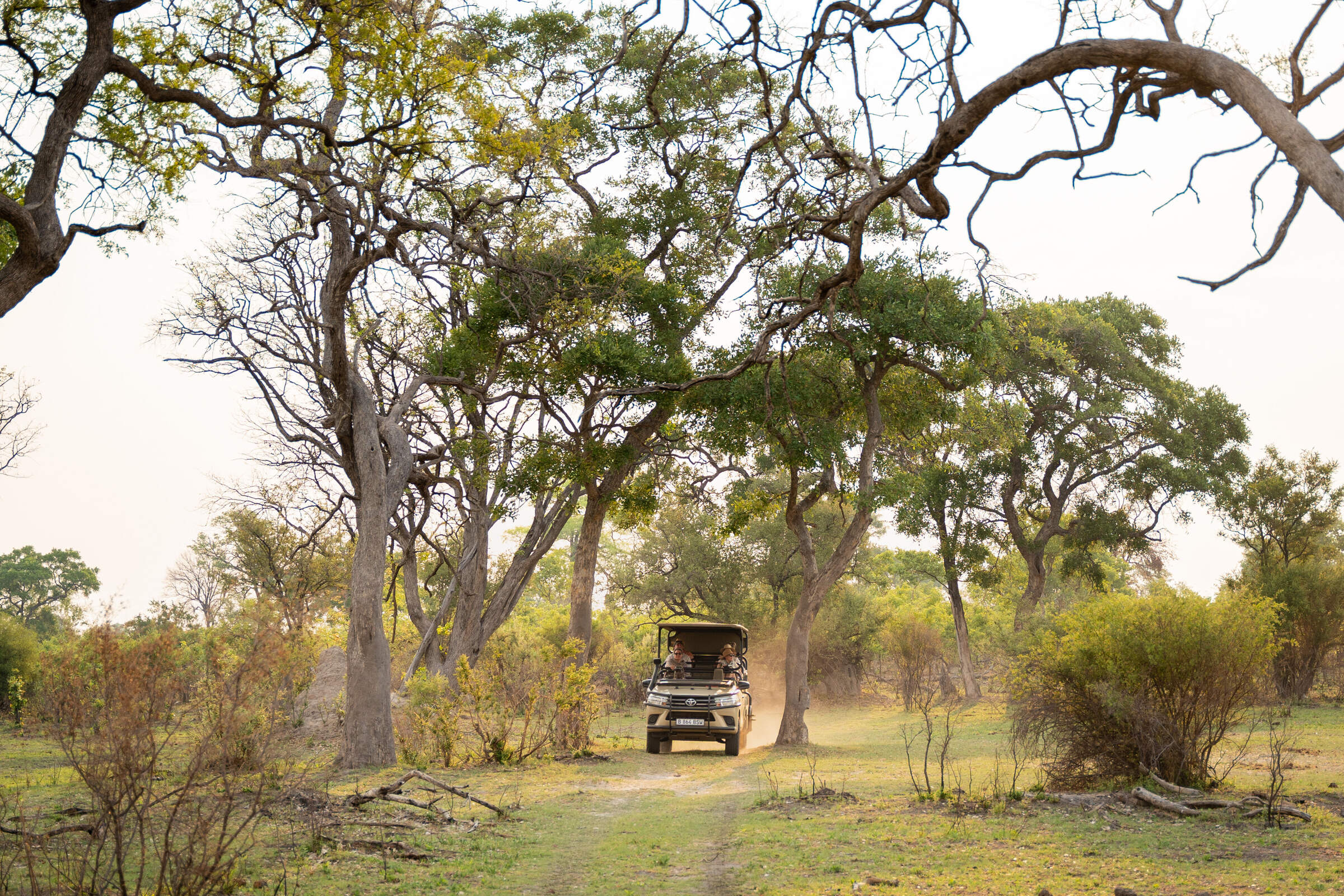
Karangoma
New for 2024, Karangoma is a classic, tented camp offering walking, canoeing and game drives, in partnership with the local Bukakwe San clan.
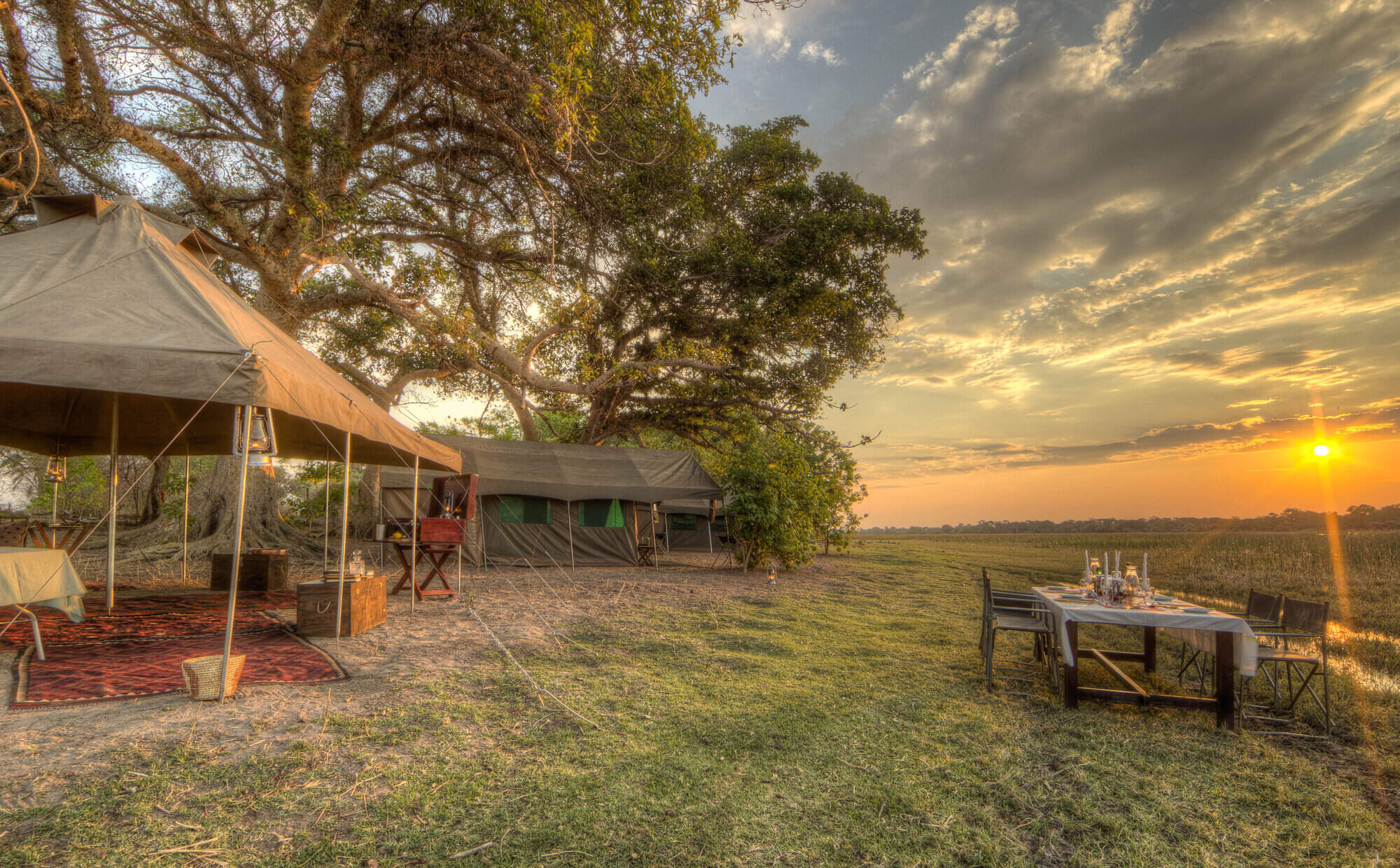
Okavango Walking Safari
The Okavango Delta Walking Safari camps in a secluded Okavango Delta Reserve where there are few roads; the ideal location for a walking trail led by an expert guide.
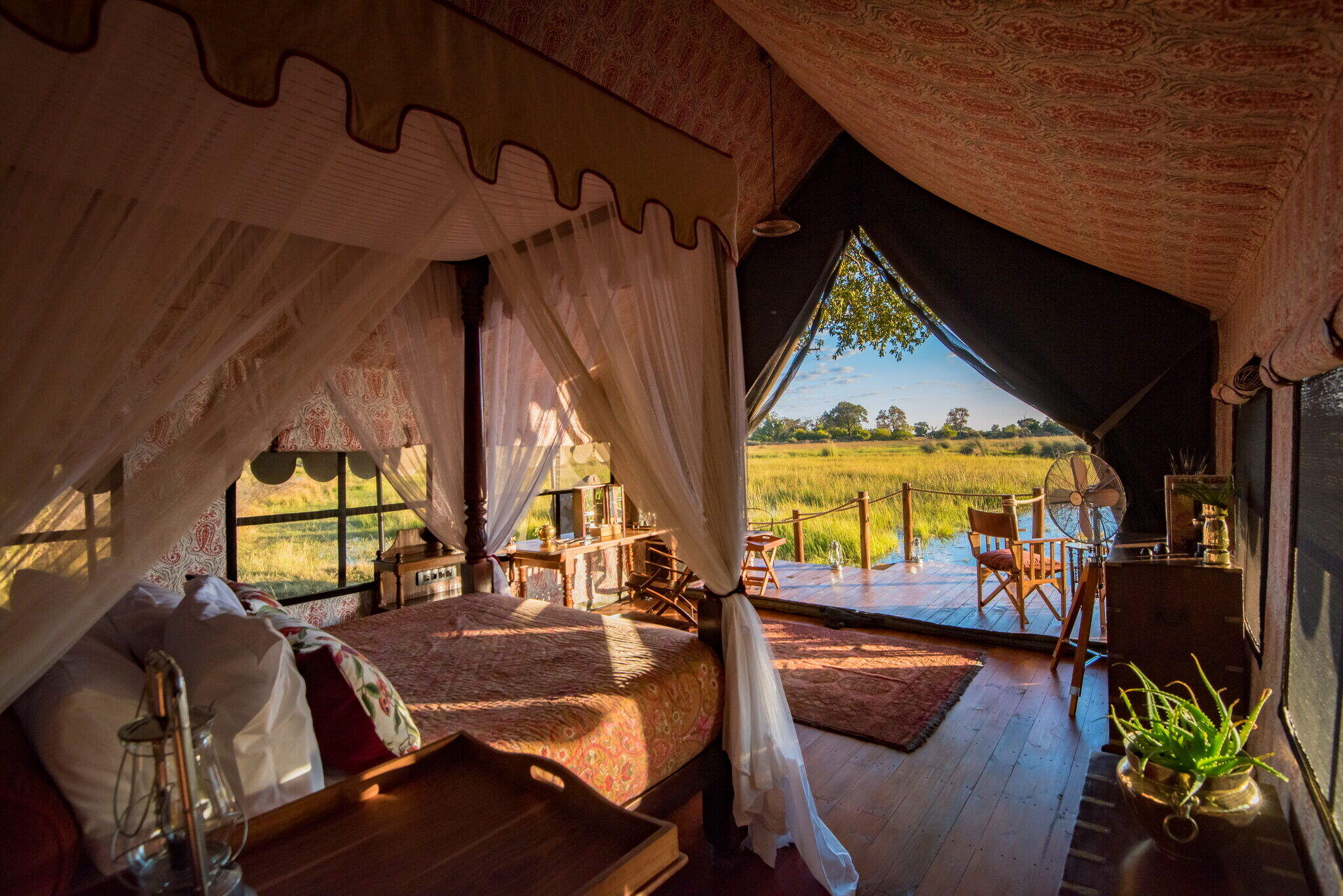
Duke’s Camp
On a remote island within a large concession, the romantic Duke's Camp and smaller Duke’s East are nestled among mature trees overlooking wildlife-rich plains and waterways of the Okavango.
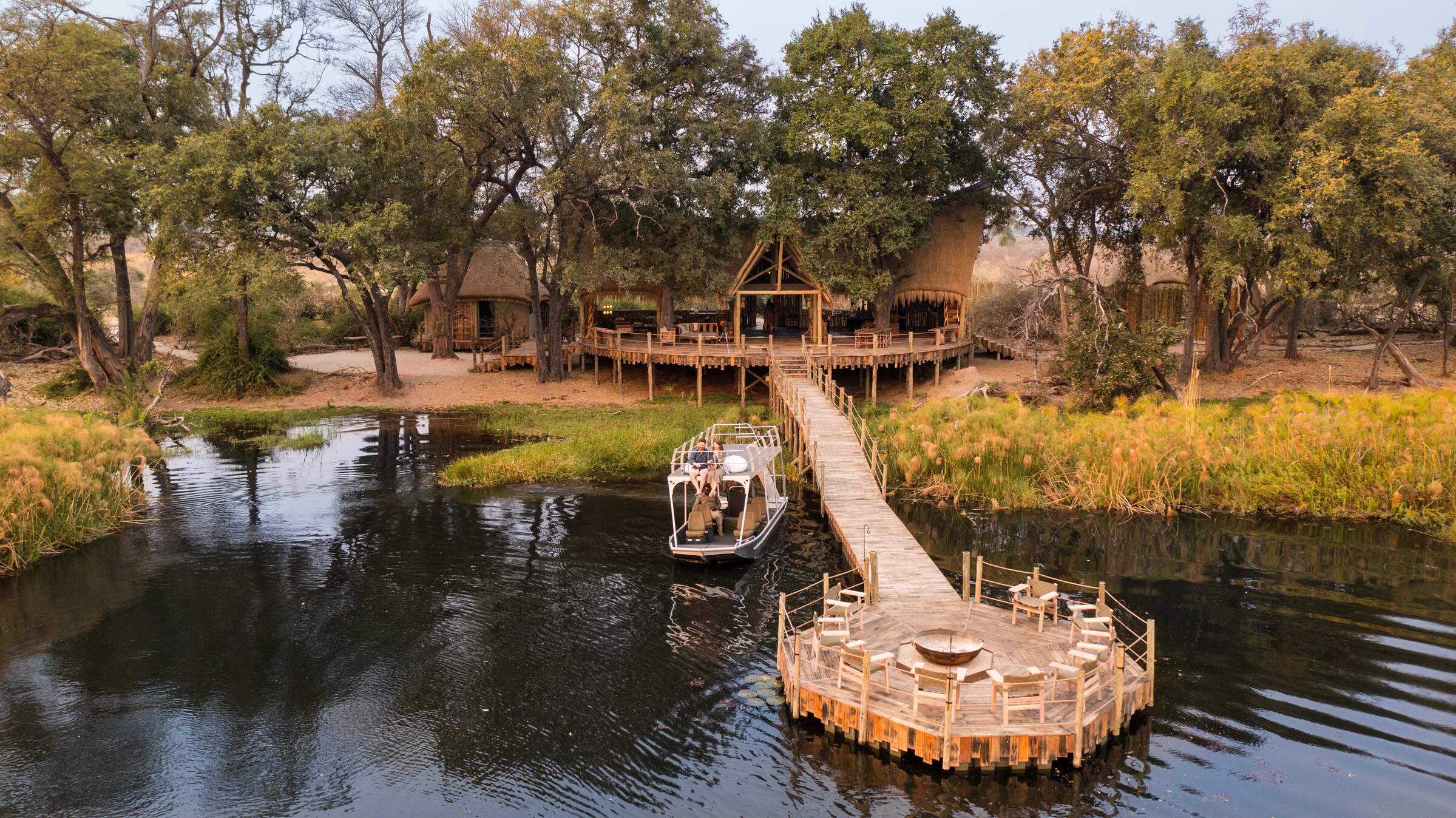
Sitatunga Island Camp
Tucked away in a pristine corner of the Okavango Delta, the exclusive Sitatunga Private Island is a water-based camp offering boating, mokoro trips and fishing.
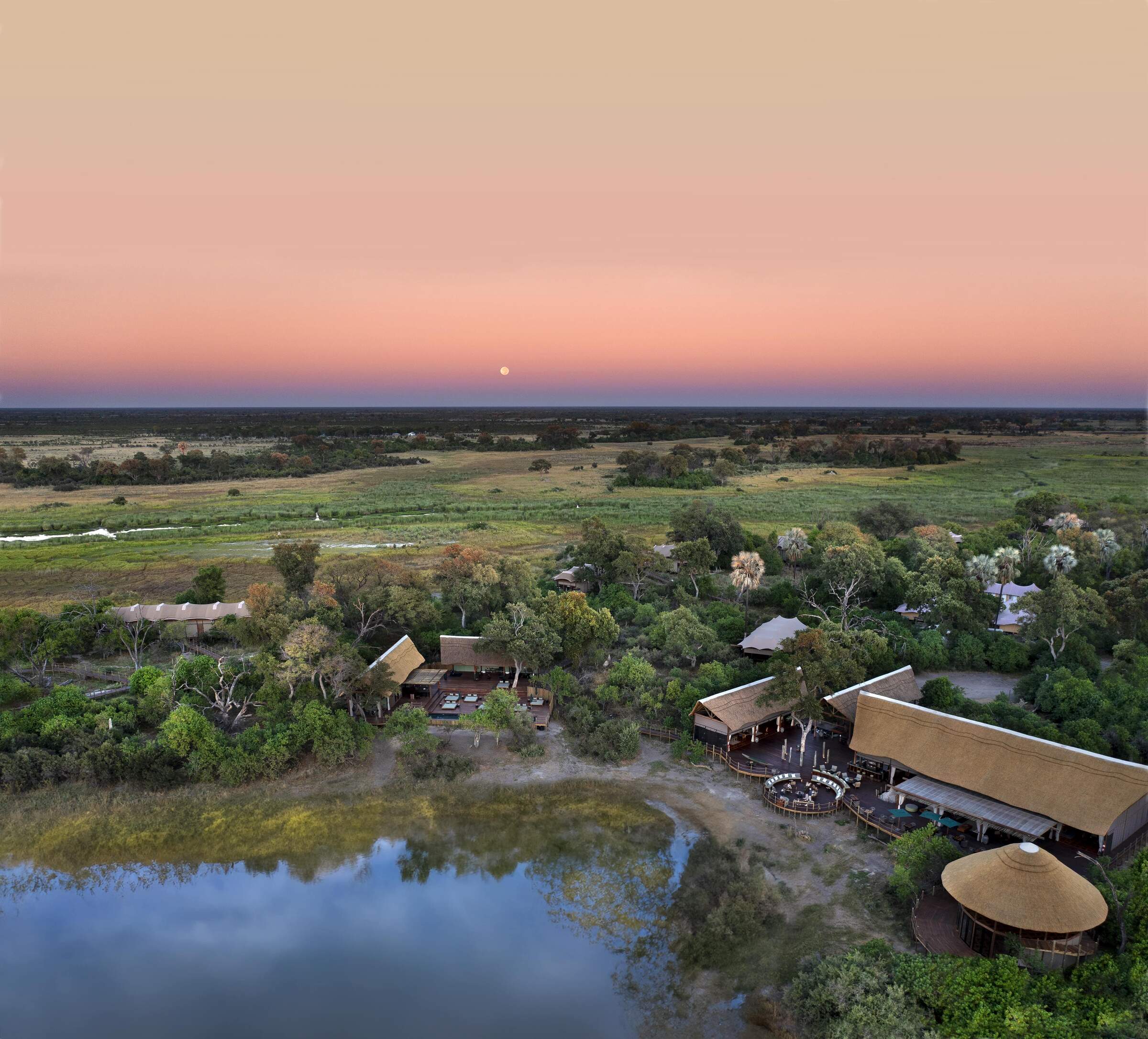
Atzaro Okavango
With a high level of tasteful luxury promised at Atzaro, we think it will be best suited to travellers seeking a touch of pampering alongside their safari.
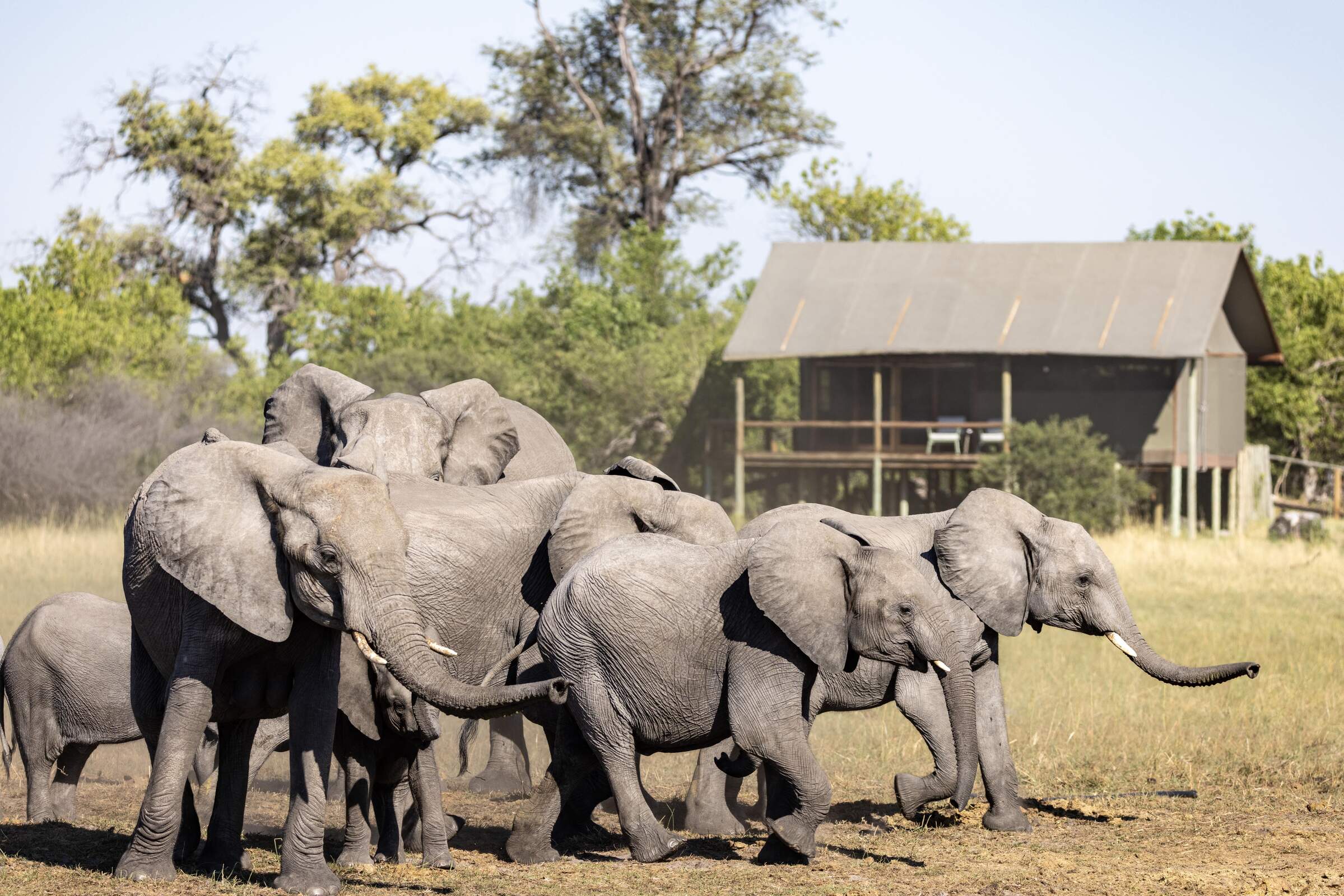
Mokolwane
Deep in the heart of the Okavango, the simple Mokolwane focuses on wildlife viewing in a large, untouched area.
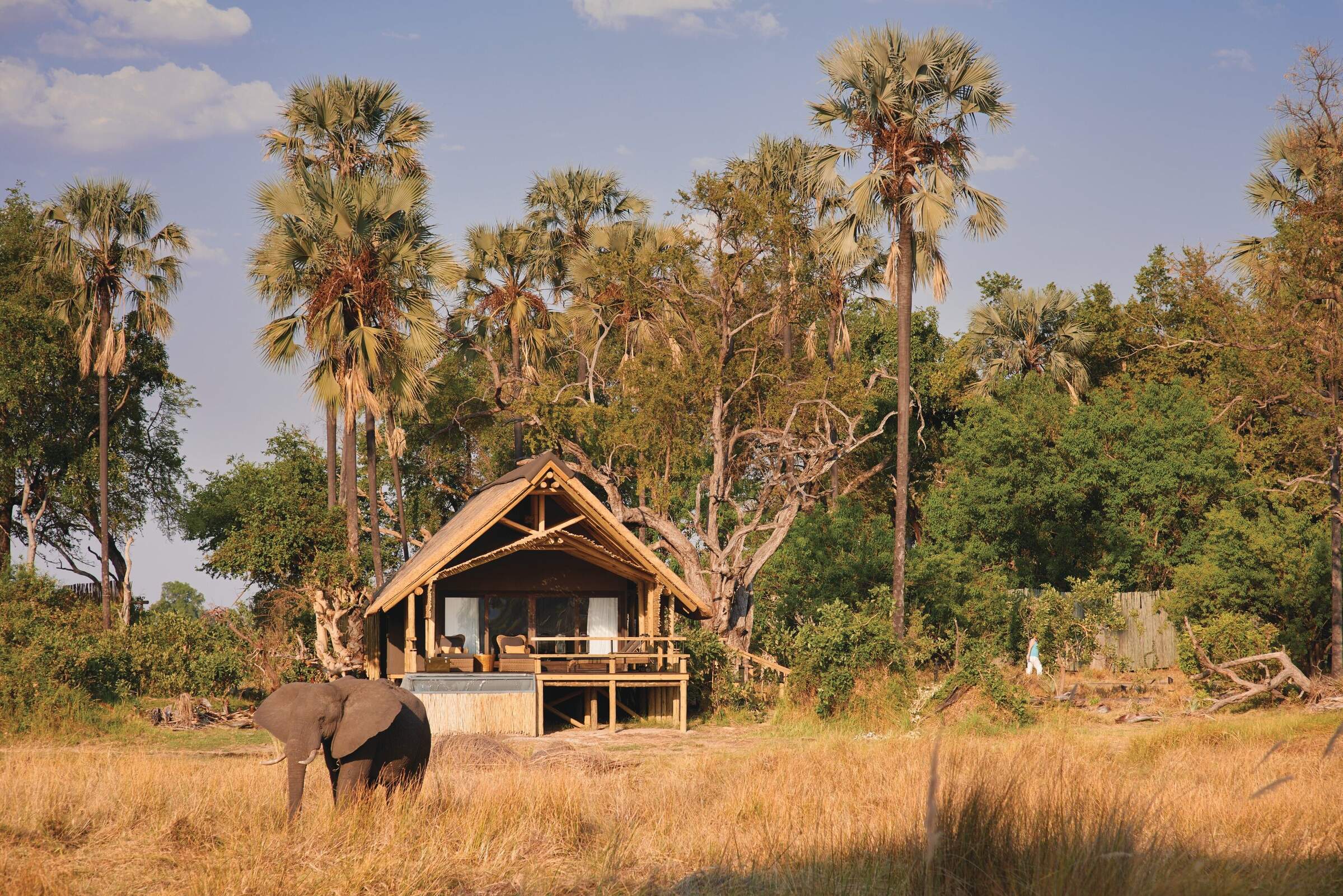
Eagle Island Lodge
Eagle Island Lodge is a luxurious camp with international-style facilities including air conditioning and intercom in each room; offering water based activities in the Okavango Delta.
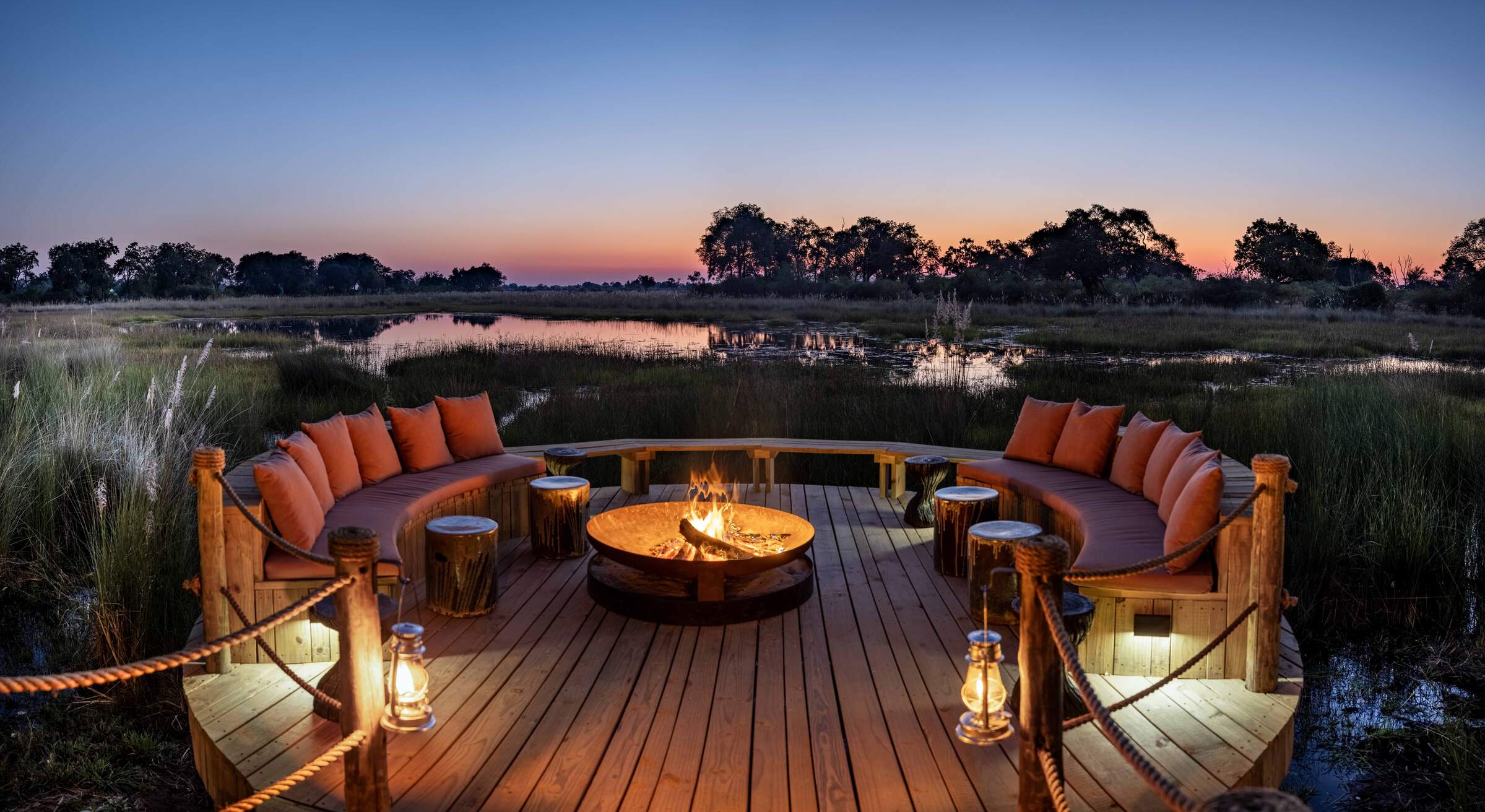
North Island Okavango
Deep in quintessentially “Okavango” territory, between deep-water and dry-land habitats, North Island focuses on a luxury safari experience with very good wildlife viewing opportunities.
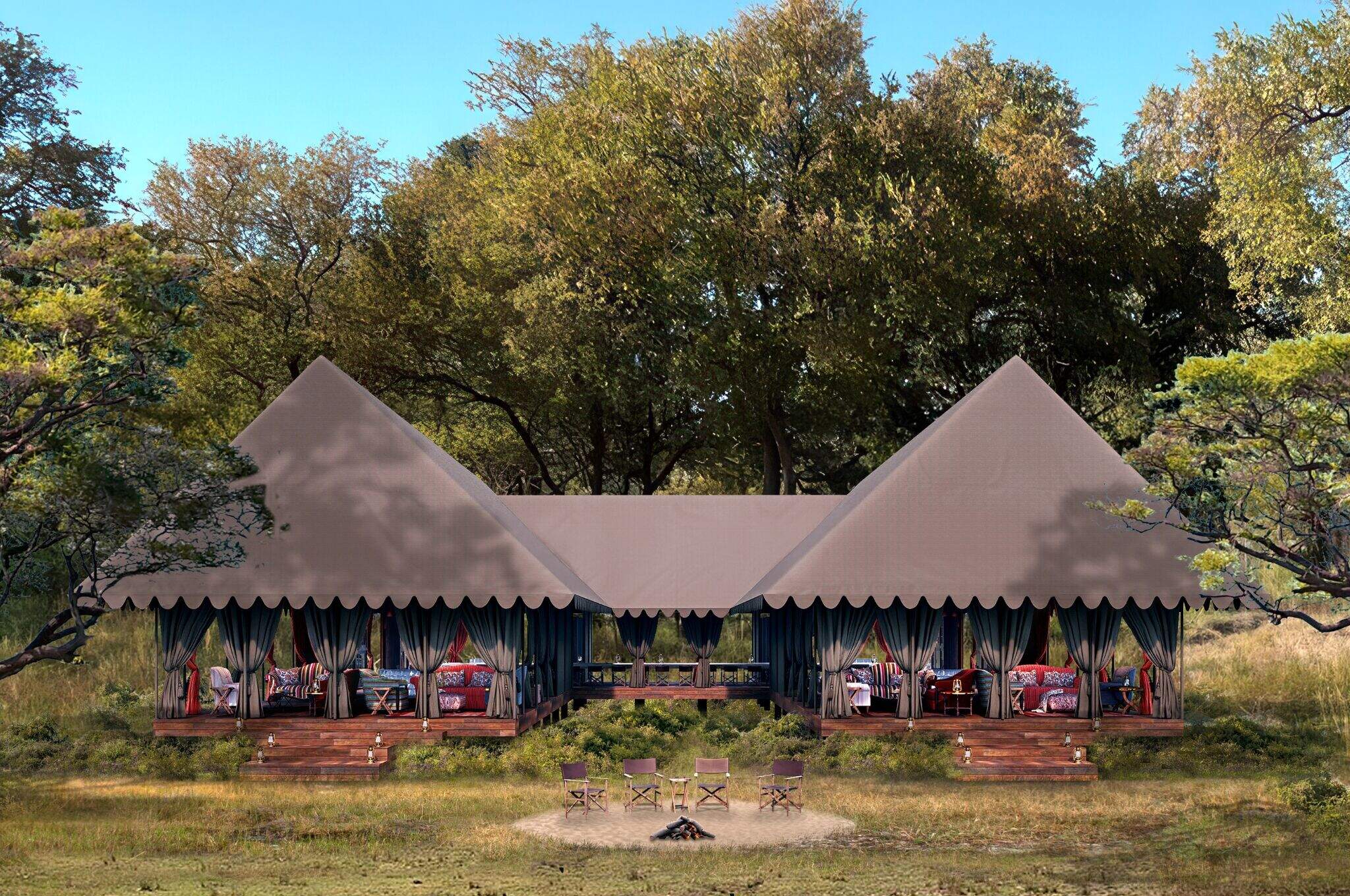
Mbamba
Deep within the northern Okavango, the classically styled Mbamba is set to open in a wildlife-rich private concession in April 2025.
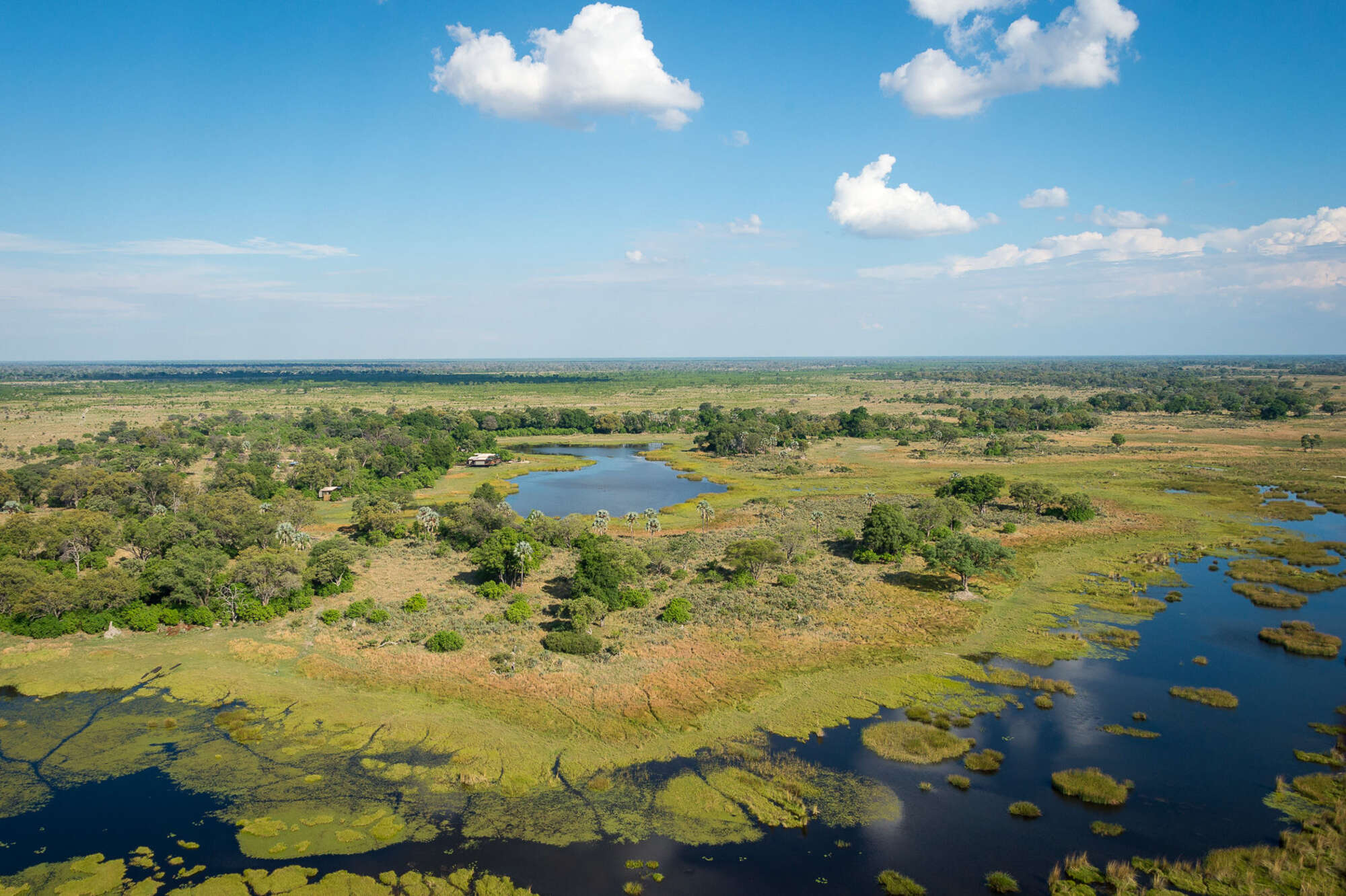
Qorokwe Camp
Luxurious and contemporary, the relatively new Qorokwe Camp is a gem in the Okavango Delta, offering land- and occasionally water-based activities in a prime wildlife area.
When to go to Okavango Delta Safari Reserves
Our month by month guide: What it's like to visit Duba Plains Camp in Okavango Delta Safari Reserves
Jan
Feb
Mar
Apr
May
Jun
Jul
Aug
Sep
Oct
Nov
Dec
Okavango Delta Safari Reserves in January
January marks the peak of the rainy season in the Okavango Delta. Evening rains are often short but heavy, accompanied by occasional dramatic thunderstorms. Temperatures remain high, although cooler than the preceding months of October to December. Wildlife can be harder to spot as animals spread out across the lush floodplains.
This month is a birdwatcher’s paradise, with migratory species in abundance over flooded areas. Rising water levels in parts of the Delta make mokoro safaris possible, offering serene and immersive experiences. The vibrant greenery and dramatic skies provide stunning opportunities for photography. With relatively low rates and fewer visitors, January is ideal for those seeking a quieter, budget-conscious Botswana safari.
- Warm temperatures with frequent evening showers
- Birdlife at its most spectacular in the Delta
- Wildlife dispersed, but insects and smaller creatures abound
- Excellent availability in Delta lodges and camps
Our view
A good time to visit, with pros & cons
Weather in January
Okavango Delta Safari Reserves in February
February mirrors January’s weather patterns, with heavy rains and slightly cooler temperatures. The Delta’s landscape is at its greenest and teeming with life. Smaller animals, insects, and vibrant birdlife dominate, as many species raise their young. The rains create temporary pools and waterholes, further dispersing larger game, while thick vegetation and tall grass adds to the challenge of spotting big wildlife.
However, Moremi Game Reserve and select areas of the Delta still offer excellent game viewing opportunities. Rising water levels enhance water activities, with boat safaris providing unique access to the Delta’s watery beauty. February is particularly rewarding for photographers seeking lush landscapes and dramatic skies and birdwatchers, with many migratory species present.
- Warm with occasional thunderstorms
- Many animals with young in the Delta
- Big game dispersed throughout wetlands
- Big game dispersed, but viewing improves in drier areas
- Lower visitor numbers and great lodge availability
Our view
This is not a great time to visit
Weather in February
Okavango Delta Safari Reserves in March
March marks the gradual end of the main rainy season in the Okavango Delta. Sunny days become more frequent, with occasional afternoon thunderstorms. The Delta remains lush and vibrant, with wildlife activity increasing as animals finish raising their young and begin congregating around permanent water sources.
Rising water levels make boat safaris a highlight, offering intimate access to the Delta’s waterways. Birdwatching is excellent, with both resident and migratory species thriving. With fewer visitors, March offers a quieter, more personal safari experience.
- Rains taper off but temperatures remain warm
- Occasional small thunderstorms in Delta
- Wildlife begins congregating around water sources
- Ideal conditions for boat safaris
- Few tourists and attractive rates at camps
Our view
A good time to visit, with pros & cons
Weather in March
Okavango Delta Safari Reserves in April
April brings clearer skies to the Okavango Delta, with the landscape remaining green and lush. Night temperatures begin to drop, especially in the southern Delta. The annual floods from Angola start to flow through the northern Delta, filling channels and lagoons, creating ideal conditions for water-based activities like boat safaris.
Wildlife viewing improves as vegetation thins and predator activity increases with cooler evenings. Moremi Game Reserve and the private concessions offer rewarding game drives, and walking safaris on the larger islands, such as Chief’s Island, become popular during this time. Birdwatching remains excellent, with many migratory species still present. April’s combination of pleasant weather, wildlife activity, and relatively low rates makes it a rewarding time to visit.
- Cooler evenings and occasional light showers
- Floodwaters begin to fill Delta channels
- Predator-prey interactions increase
- Ideal for walking safaris and boat trips
- Popular shoulder season, rates fairly low
Our view
A good time to visit, with pros & cons
Weather in April
Okavango Delta Safari Reserves in May
May is a popular time to visit the Okavango Delta, marking the last month of the shoulder season. The annual floods continue to spread through the Delta, transforming the landscape. Cooler mornings and evenings encourage predator activity, while thinning vegetation makes wildlife spotting easier, though some tall grasses may still obstruct views.
May offers excellent photographic opportunities with clear, crisp air. It's a favourite time for many visitors, combining good wildlife sightings with pleasant weather. Camp bookings throughout the Delta fill up quickly during this period.
This is a perfect month for scenic flights, offering breathtaking views of the advancing floodwaters. Mokoro trips through the Delta’s tranquil waterways provide a unique perspective on the environment. Camps start to fill quickly as the Delta’s combination of pleasant weather and excellent wildlife sightings makes it a favourite among safari-goers.
- Cool mornings and evenings with little rain
- Improved game viewing as Delta grasses thin
- Predator activity increasing in drier areas
- Scenic flights and water activities highly recommended
- Last month of shoulder season for camps
Our view
A very good time to visit
Weather in May
Okavango Delta Safari Reserves in June
June signals the start of the dry season in the Okavango Delta. Days are warm, with clear skies, while mornings and evenings can be cold, occasionally reaching freezing temperatures. The annual floods reach their peak, creating spectacular conditions for water-based activities like boat safaris along the Khwai River and in private concessions.
Wildlife concentrates around permanent water sources as surface water dries up, improving game viewing. The thinning vegetation and crisp, clear air make June perfect for photography. High demand for camp bookings reflects its popularity, as this month combines great game viewing and pleasant weather.
- Warm days, cold mornings and nights
- Peak floodwaters make boat safaris unforgettable
- Wildlife congregates around permanent water sources
- Excellent conditions for photography
- High demand for camps and lodges
Our view
Fantastic: the very best time to visit
Weather in June
Okavango Delta Safari Reserves in July
July offers cool mornings and evenings with warm, sunny days, making it ideal for wildlife viewing. The floodwaters remain at their peak, providing excellent opportunities for boat safaris. Vegetation continues to thin, enhancing visibility on game drives in Moremi Game Reserve and the Okavango’s private reserves.
Large herds of elephants and buffalo are common sights as they gather near water sources. Predator sightings, including lions and leopards, increase as prey concentrates. Birdwatching is rewarding, and the crisp winter air creates stunning photographic conditions. July is one of the most popular months to visit, with many lodges fully booked well in advance.
- Comfortable days, cold mornings and nights
- Excellent game viewing and predator activity
- Moremi and Khwai areas become busy
- Private concessions offer exclusivity
- High season rates; advance bookings essential
Our view
Fantastic: the very best time to visit
Weather in July
Okavango Delta Safari Reserves in August
August remains a highly sought-after month for visiting the Okavango Delta. Nights are cool, while daytime temperatures rise gradually. Wildlife viewing is exceptional as animals concentrate near water sources, while the Delta’s floods are typically at their peak, offering picturesque settings for excellent boat safaris.
Walking safaris and game drives in areas like Moremi Game Reserve and Chief’s Island are particularly rewarding. Large herds of elephants and buffalo are common sights, and predator activity is high, with increased chances of seeing lions, leopards, and wild dogs hunting. The clear skies and lack of humidity create excellent stargazing conditions. With many travellers visiting during European and North American holidays, lodge availability can be challenging.
- Dry, warm days and cool nights in the Delta
- Fantastic wildlife viewing near water sources
- Excellent opportunities for game drives and boat safaris
- Cloudless skies, spectacular stargazing
- High demand for accommodation – book early
Our view
Fantastic: the very best time to visit
Weather in August
Okavango Delta Safari Reserves in September
September is a favourite for many safari-goers in the Okavango Delta. Daytime temperatures rise, but nights remain cool. The landscape transforms as greenery fades, and hazy conditions create dramatic sunsets. Wildlife viewing peaks as animals cluster around permanent water sources, with especially large numbers of elephants and buffalo. This concentration of prey attracts predators, increasing chances of witnessing exciting hunts.
The return of migratory birds enhances birdwatching. Water levels begin to recede, but boat cruises are still possible. Dusty conditions may challenge photographers, but the stunning landscapes and wildlife action more than make up for it.
- Warm days, cool nights in the Delta
- Prime month for Okavango wildlife viewing
- Migratory birds return, enriching birdwatching
- Spectacular sunsets and dramatic scenery
- High season rates, many Delta camps full
Our view
Fantastic: the very best time to visit
Weather in September
Okavango Delta Safari Reserves in October
October is the hottest and driest month in the Okavango Delta. Wildlife concentrates around the last remaining water sources, creating some of the most dramatic game viewing opportunities of the year. Predator-prey interactions are frequent and visibility is excellent, making for thrilling safaris.
Walking safaris are particularly rewarding, especially on smaller islands, but early starts are essential to avoid the midday heat. Towards the end of the month, the first rains may bring relief and begin rejuvenating the parched landscape. Despite the heat, October offers excellent big-game viewing and dramatic photographic moments of animal interactions.
- Hot days, with late-month chances of rain
- Outstanding big-game viewing near water sources
- Water activities limited as floods recede
- Walking safaris provide unique experiences
- Final month of the peak safari season
Our view
Fantastic: the very best time to visit
Weather in October
Okavango Delta Safari Reserves in November
November marks the start of the green season in the Delta. Rising humidity and temperatures often lead to the first heavy rains; these are typically short, heavy showers in the late afternoon or night, creating spectacular scenes and bringing a flush of green to the parched landscape. Wildlife begins to disperse as waterholes refill, but game drives still offer rewarding sightings.
Water levels may be low, limiting boat activities, but November is exceptional for birdwatching, with the arrival of many migratory species. Scenic flights highlight the contrast between dry and wet areas. The first two weeks are popular for travellers seeking good game viewing at lower rates as the Delta transitions into its shoulder season.
- Hot, humid days in the Delta
- Dramatic rain showers , increasing as month progresses
- Migratory birds arrive in abundance
- Wildlife watching good, but less predictable
- Shoulder season offers mid-range rates
Our view
A good time to visit, with pros & cons
Weather in November
Okavango Delta Safari Reserves in December
December sees the rainy season in full swing across the Okavango Delta, bringing some respite from high temperatures. Game viewing becomes more challenging as wildlife disperses, but great sightings can still be had. The landscape transforms dramatically, with lush vegetation sprouting across the Delta. This period is excellent for birdwatching, with numerous migratory species present.
Water levels begin to rise, gradually improving conditions for boat safaris. The green season offers unique photographic opportunities, with dramatic skies and newborn animals. December is ideal for visitors seeking a more intimate Delta experience, with fewer tourists and lower rates at many camps and lodges. The combination of wildlife, birdlife, and scenic beauty makes it a rewarding time to visit.
- Warm temperatures
- High chance of rain in short, heavy storms
- Wildlife more dispersed across Delta
- Game viewing more challenging in wetlands
- Low-season rates and fewer visitors in most Delta camps
Our view
A good time to visit, with pros & cons
Weather in December

Looking for inspiration on where to travel next?
Visit our trip chooser to explore your options and find inspiration for your perfect African adventure
Inspire me